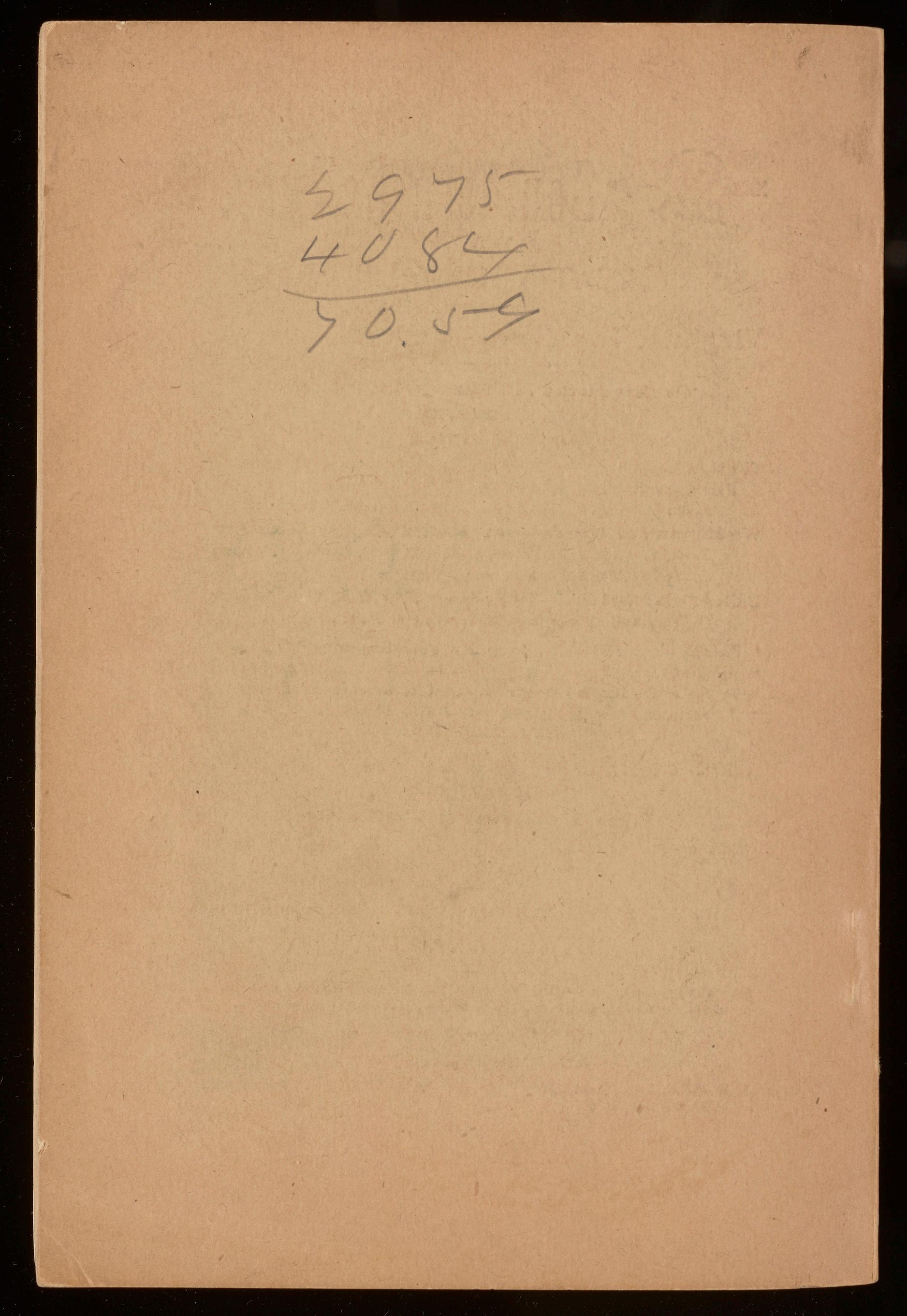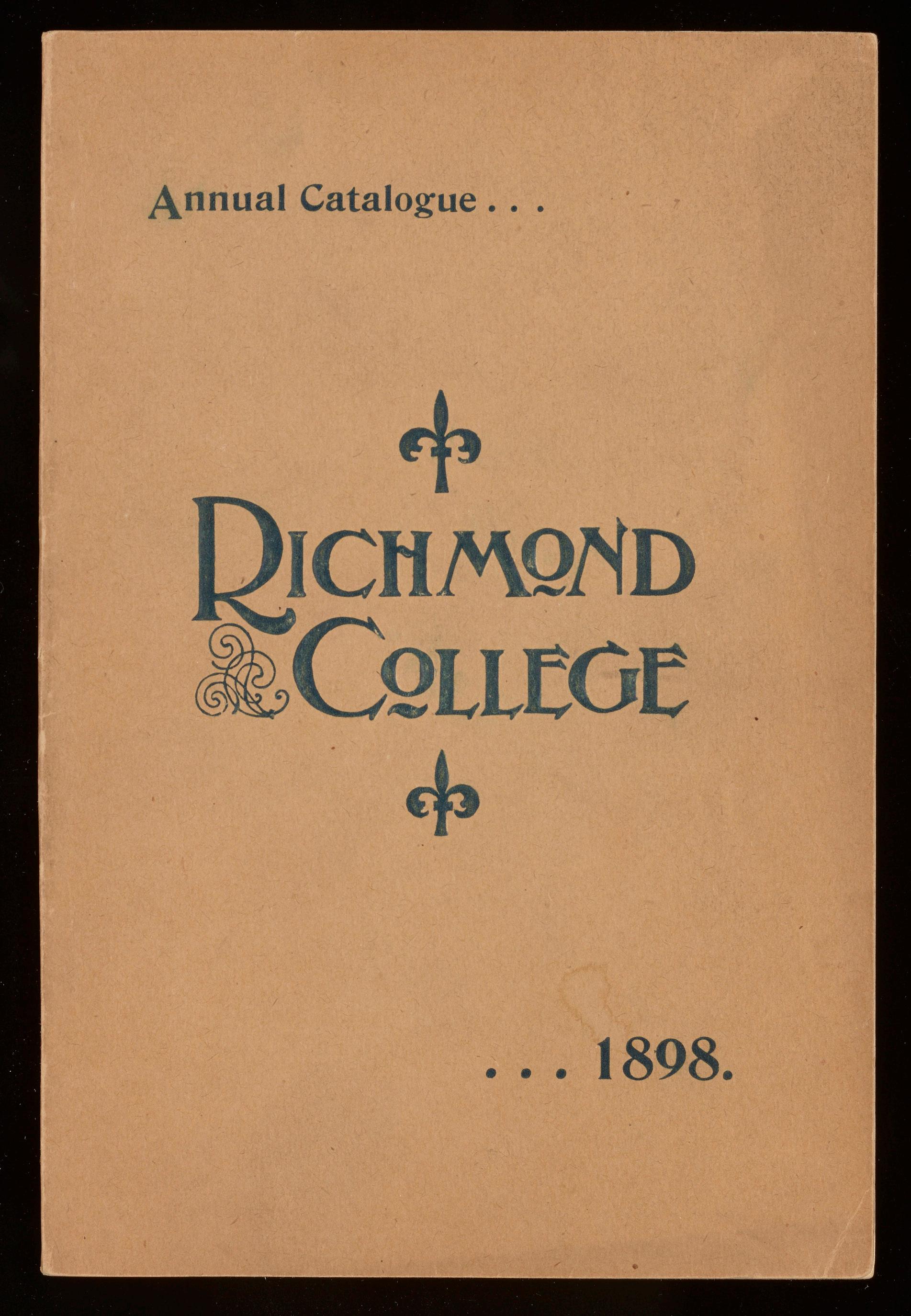
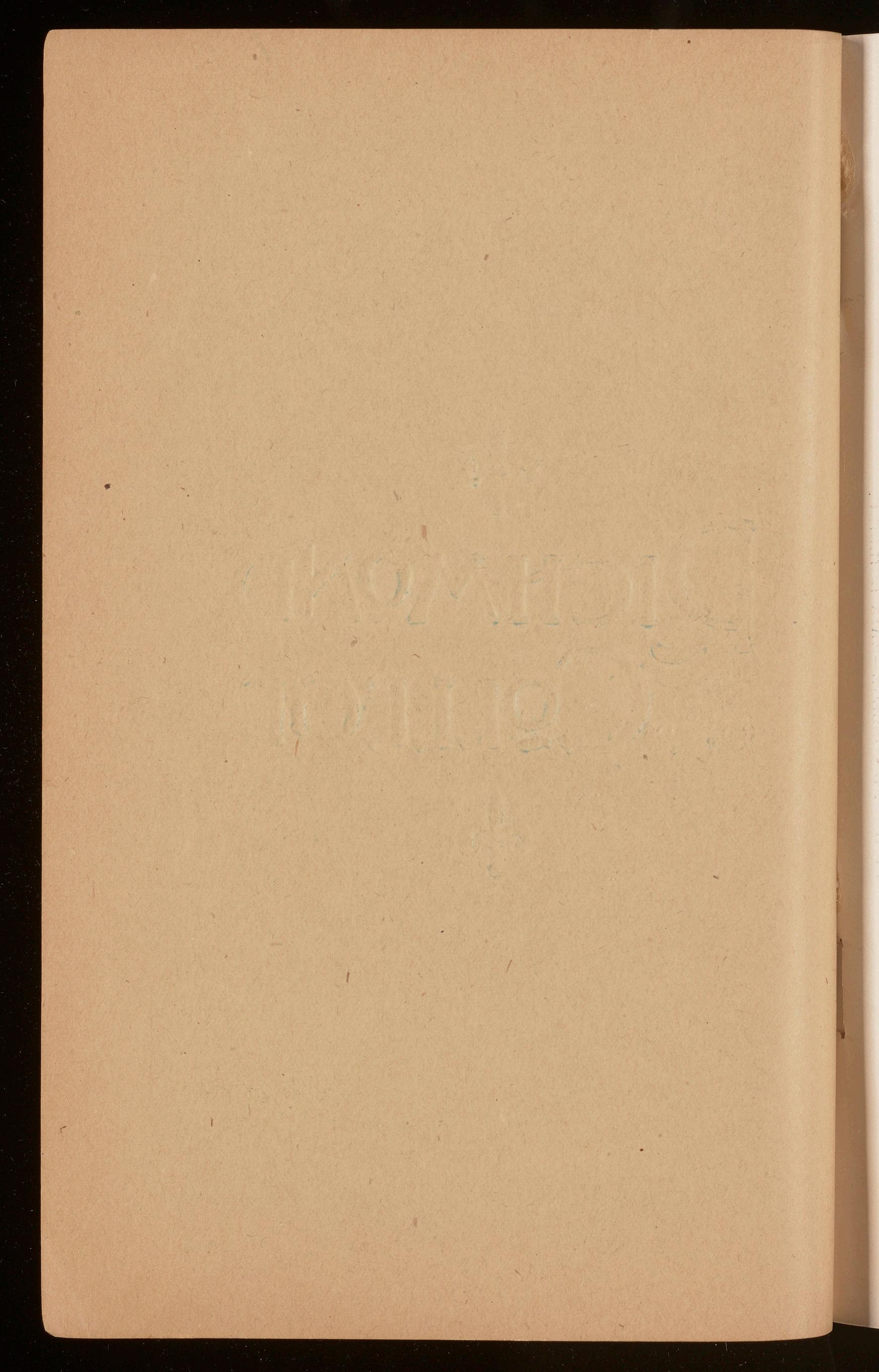
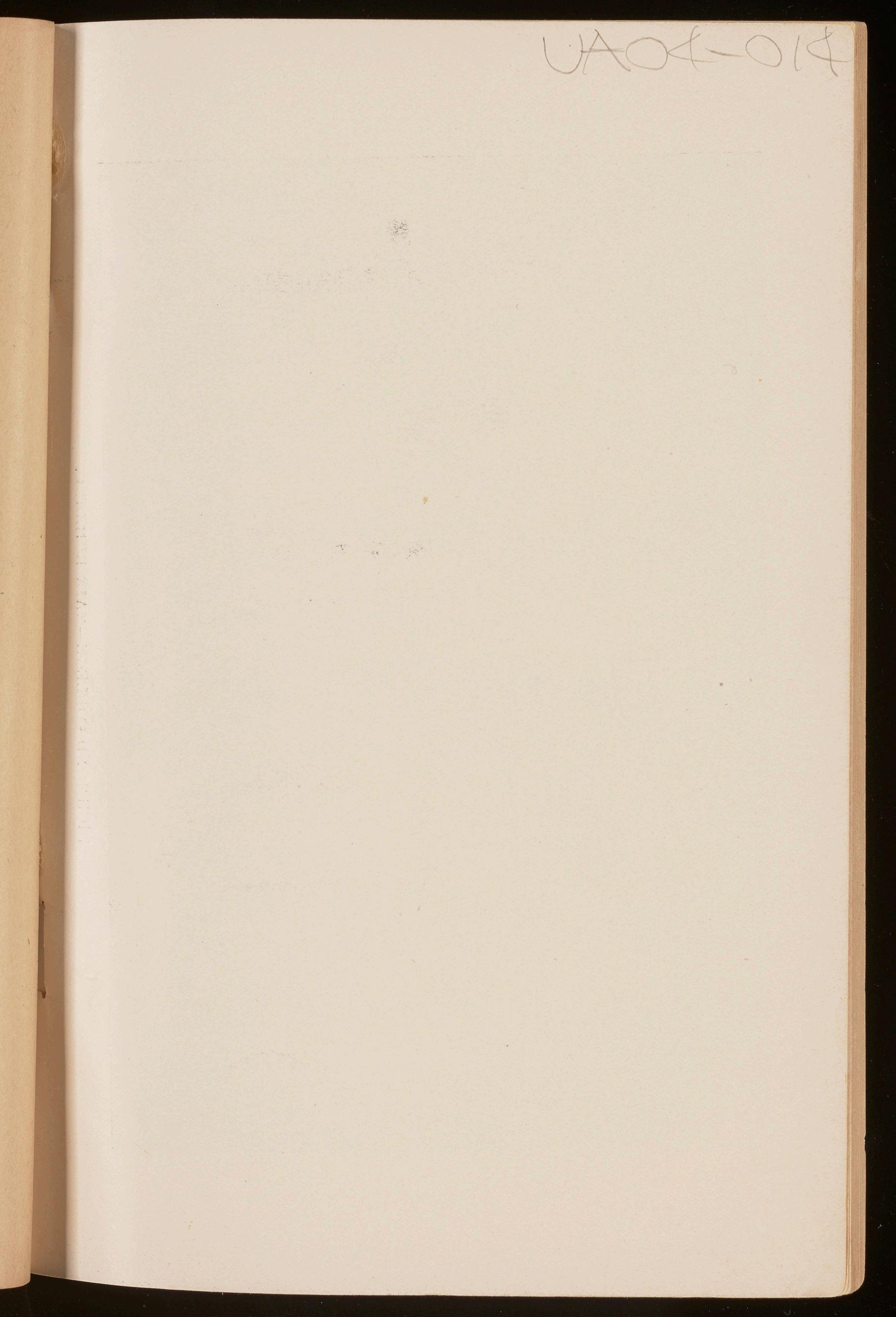
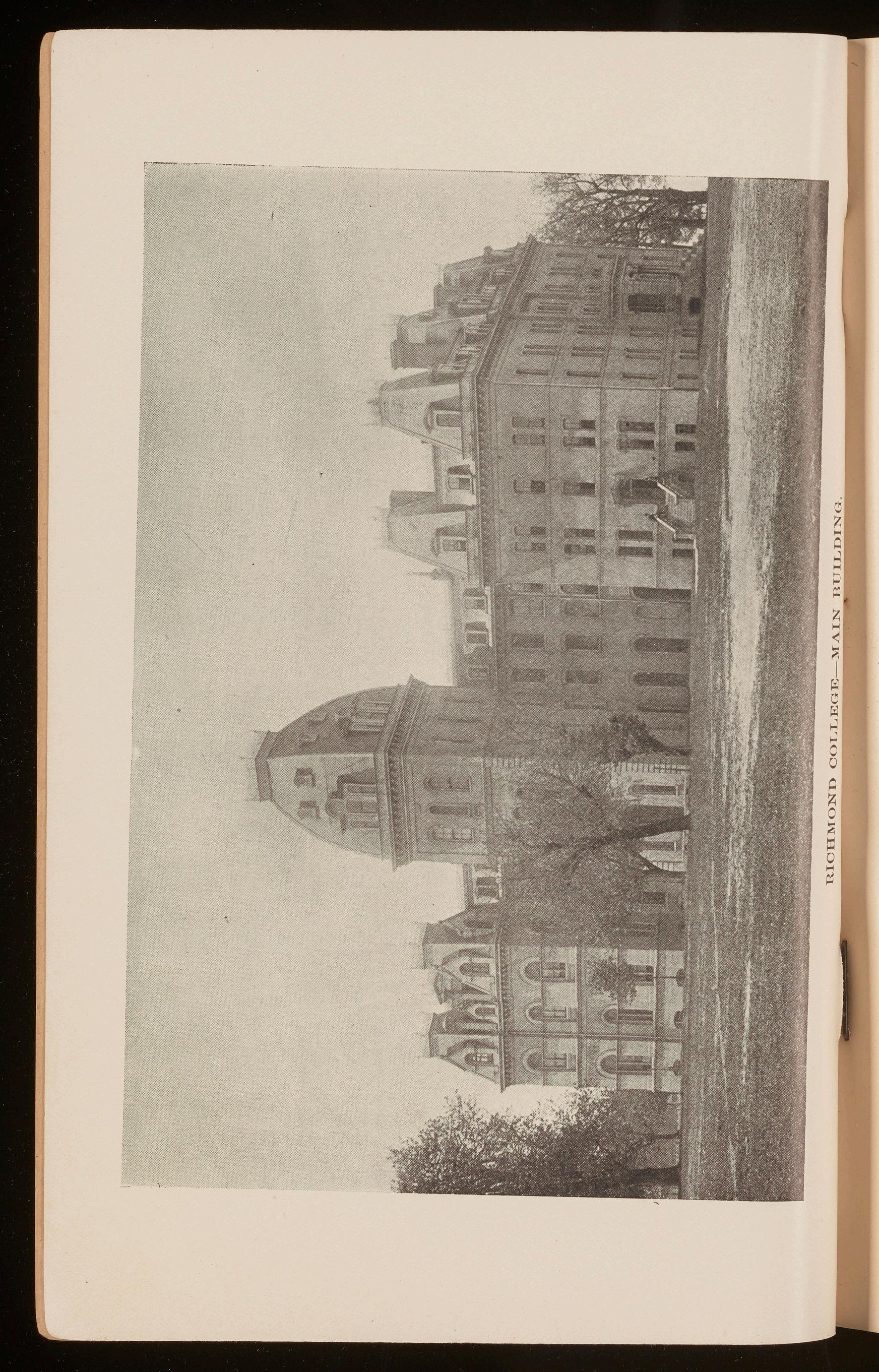






SE S SION 1897='98, With Announcements for 1898- '9 9.
RICHMOND: J. L. HILL PlUN'J'ING 00)IPANY 1898.
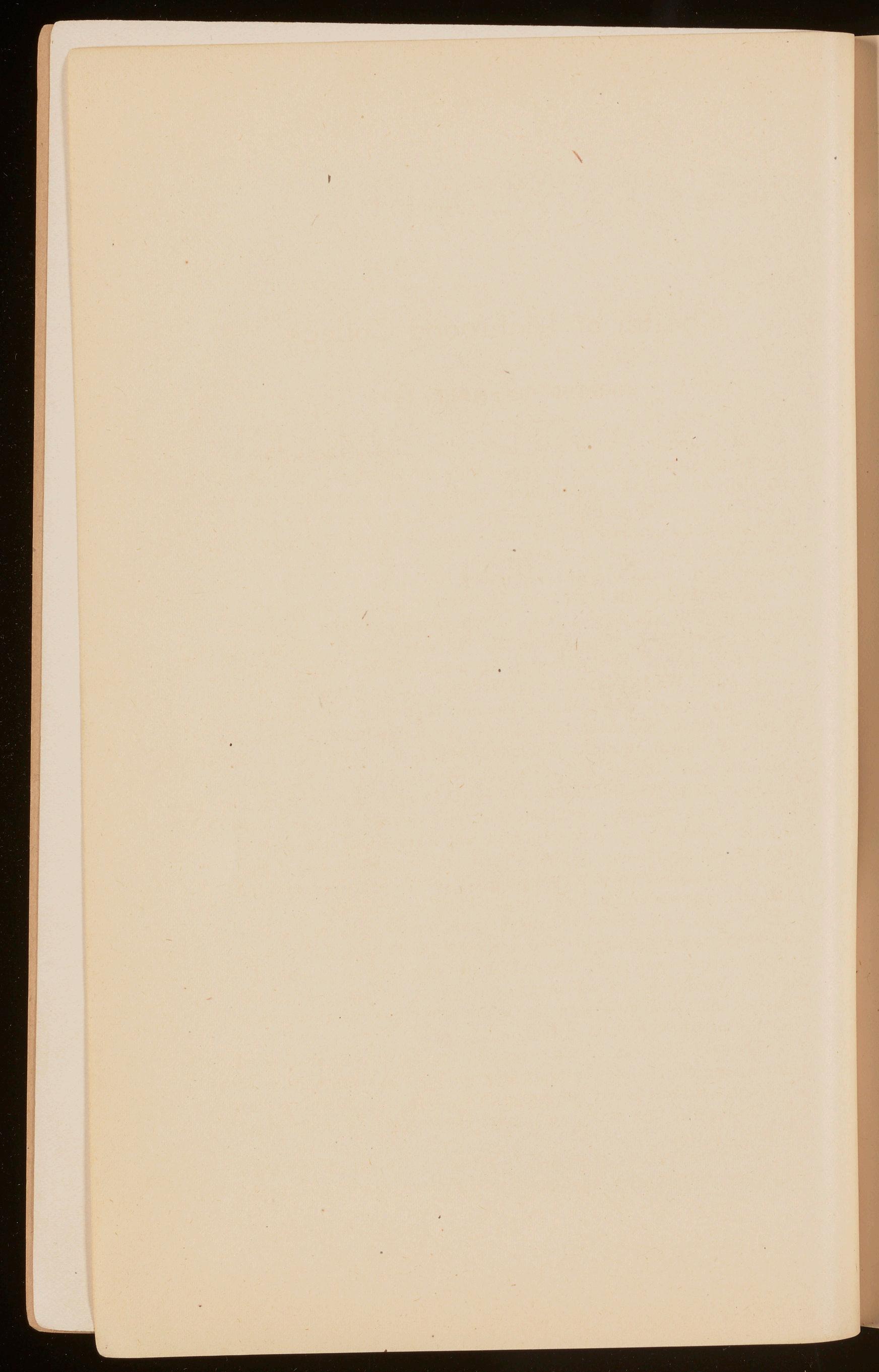

ADOPTED DECEMBER , 1891.
I. Be it enacted by the General Assembly, That the act passed March 4th, 1840, entit led "An Act to Incorporate the Trustees of Richmond College," be and the same is hereby so amended as to read as follows:
1. That there be and is hereby estabhshed, at or near the city of Richmond, a 8eminary of learning for the instruction of youth in the various branches of Science and Literature, which shall be known by the name of Richmond Ool!,ege.
2. That Archibald Thomas, J.B. Jeter, Alexander Fleet, Barnet Grimsley, William Sands, Daniel Witt, Robert Ryland, James B. 'l'aylor, Edwin Wortham, John M. Murray, Samuel G. Mason, Thom:ts Ilume, A. l\'L Poindexter, Thomas N. Welch, Addison Hall, L. 1Y. Allen, W. A. Baynham, L. W. Seely, Basil Manly, Jr., A. G. wortham, Albert Snead, James Thomas, Richard Rems, A. Judson Crane, Chas. T. Wortham, C. F. Fisher, L. R. Spilman, Thomas J. Ernns, Wellington Goddin, Thomas Wallace, J B. Stornll, L. M. Coleman, R.H. Bagby, A. J. Coons. J. Lansing Burrows; Edward J. Willis. John A. Broiidus, Roscoe B. Herth, and J. R. Chambliss be and are hereby constituted Trustees of said College, who, and their successors, shall be a body corporate under the name and style of Richmond College; who shall have perpetual succession and a common seal; may receive and hold property for the benefit of said Col- lege. ,Lnd may sue and be sued, 1mplead and be impleaded.
They shall have power to appoint and remove officers for their own body, and a Faculty of instruction for the College, and to regulate all fees and salaries. They shall also have power to make Bylaws (IJld Regulations, not contrary to the laws of the land. Any seven Trustees shall form a quorum, and a less number may adjourn from time to time till a quorum be had.
3. The said Trustees, or any seven of them, are hereby authorized and empowered to confer Literary Degrees upon such persons as in their opinion shall merit the same, in as ample a manner as any other college in this State, and under the corporate seal to grant testimonia ls thereof.
4. The said Trustees shall elect a Treasure?', who shall give bond with approved security, payable to said Coll ege, conditioned faith-

4. Richmond College.
fully to discharge the duties of his otlice, ancl on failure so lo <lo he may be proceeded ,tgainst, by motion upon ten days' notice, before the Circuit or Hustings Court of rhe city of Richmond. 5. The said Trustees shall have power at any annual or other stated meeting, ten of them being present and concurring, to remove any Trustee, and at any time to supply any Yacancy. The number of Trustees shall neYer be less than twenty-four nor more than forty.
There hall be annual and other stated mceting-s of the Trustt·es at such time ancl place as their By-Laws shall prescribe. There may be> special meetings at Lhe call of their Presiding oflicer, or any three Trust ees, clue notice of all such meetings being g-iven.
6. The said Trustees :ue hereby authorized ancl required to admit to instruction in all the classes of the College, free of all charges except board, and in all respects upon terms of eqmtlity with other students, all ministet·s and preachers and candidates for the min- istry belonging to the denomination of Christians called the Regular Baptists, who may be recommended by the Education Bo,trd be- longing to the Baptist General Association of Virginia, in "h ich Board all the rights, properties, privileges, powers, duties, and obligations of the Yirginitt Baptist Education Society arc hereby declared to be vested. And said Trustees m.ty also admit gratui- tously such other students as they may think proper. And said Trustees may receive donations, bequests, and clevises, or in their discretion purchase and hold property, real and personal, in any county or corporation of this Commonwealth, :ind us e and control the same for educational purposes, in the founding and maint,tining of schools or academies, under such rules and regulations as may be prescribed by the said Trustees.
7. All rights, claims, privileges, and appurtenances now belonging or any wise pertaining to ''tlte Tru8tee., of Richmond Collq;e,'' as heretofore incorporated by act of the General Assembly, passed l\Iarch 4, 1840, are hereby transferred to ·· Richmond College." IL This act shall be in force from its passage.
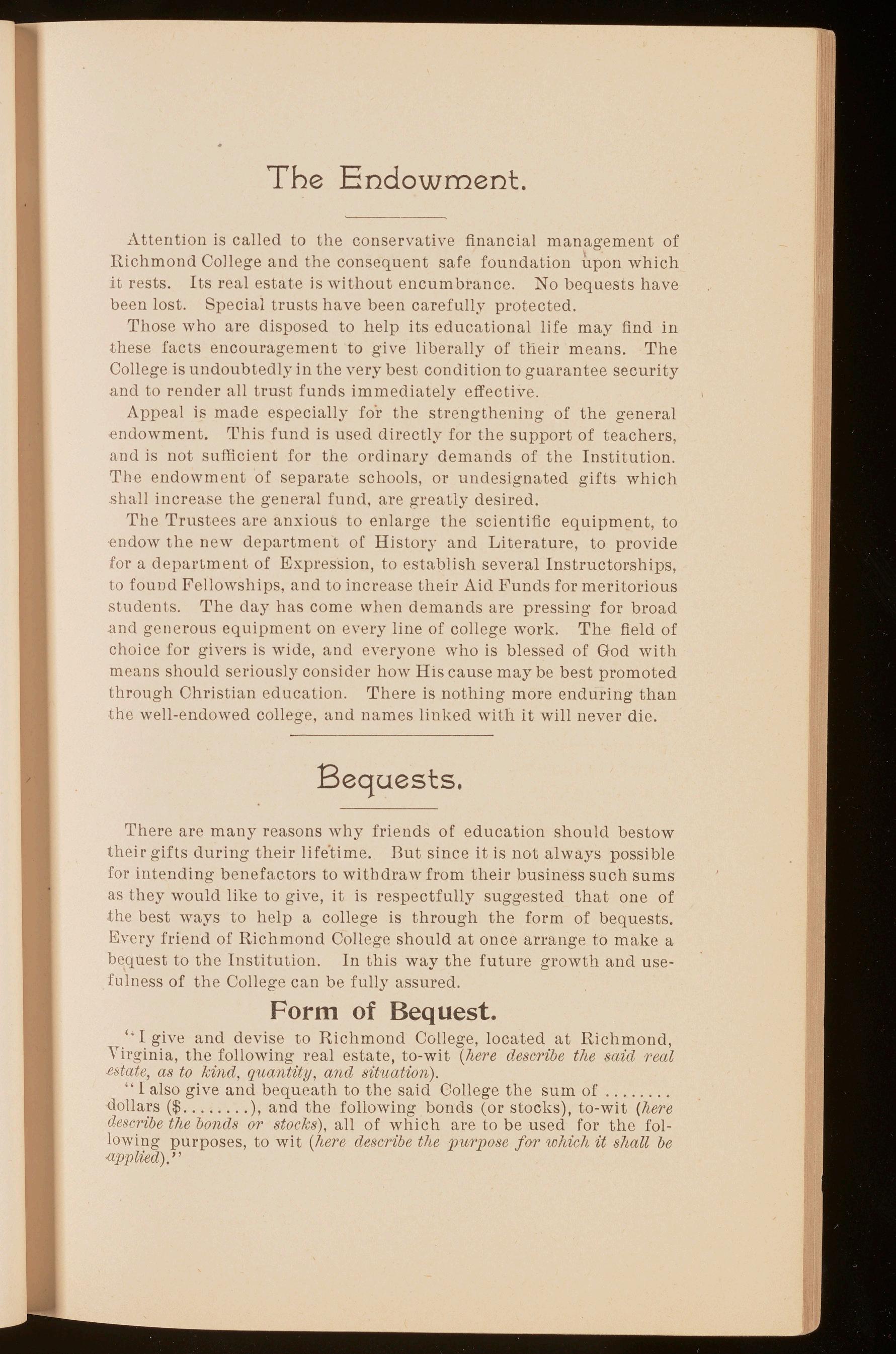
Attention is called to the conservative financial management of Richmond College and the consequent safe foundation {1pon which it r ests. Its real estate is without encumbrance. No bequests have b ee n lost. Sp ecial trusts have been car efully pro t ected.
Thos e who are disposed to help its educational life may find in t h ese facts encourag e mPnt to give liberally of th e ir means. The College is undoubtedly in the very best condition to guarantee security a nd to render all trust funds immediately effective.
Appeal is made especially for the strengthening of the general e ndowment. This fund is used directly for the support of teachers, a nd is not suflicient for the ordinary demands of the Institution . Th e endowment of separate schools, or undesignated gifts which shall increase the general fund, are greatly desired.
'rhe Trustees are anxious to enlarge the scientific equipment, to e ndow the new department of History and Literature, to provide fo r a d e partment of Expr ession, to establish several Instructorships, t o found Fellowships, and to increas e their Aid Funds for meritorious s tud e nts. The day has come when demands are pressing for broad a nd generous equipment on every line of college work. The field of ch o ice for gil·ers is wide, and everyone who is blessed of God with m eans should seriously consider how His cause may be best promoted t hrough Christian education. There is nothing more enduring than t he well-endowed colleg e, ,wd names linked with it will never die.
Th e re are many reasons why friends of education should bestow t heir gifts during their lifetime. Ilut since it is not always possible for intending benefactors to withdraw from their business such sums as they would like to give, it is respectfully suggested that one of th e best ways to help a college is through the form of bequests. Ev e ry friend of Richmond College should at once arrang e to make a b equest to the Institution. In this way the future growth and usefulness of the Colleg e can be fully assured.
'· l give and devise to Richmond College, located at Richmond, Yirginia, the following real estate, to-wit (ltere desc1·ibe tlte said real e, tat e, as to kind. quantity, and situation).
"I also give and bequ eath to the said College the sum of ....... . d ollars($ ........ ), and the following bonds (or stocks), to-wit (ltere describe the bonds 01· stocks), all of which are to be used for the following purposes, to wit (h ere describe tlte pu17Joae Joi· whiclt it shall be applied).''
WILLIAM E. HATCHER, D. D., LL. D., PnESIDEN'l', Hon. J. TAYLOR ELLYSON, VICE-PRESIDENT.
RECORDING SECRETARY, FINANCIAL SECRETARY, AND TREASUREH.
T. H. ELLETT, Esq., AUDI'l'OR.
JOSIAH RYLAND, Esq.. • . Richmond
MAJOR A. R. COURTNEY. . Richmond
w. E. HATCHER, LL. D.. . Richmond
A. E. DICKINSON,D. D. . • Richmond
JOHN C. WILLIAMS,Esq .... Richmond
J. R. GARLICK, D. D
C. H. RYLAND, D. D.
COL. W. E. TANNER

. Richmond
. Richmond
• Richmond
T. s. DUNAWAY,D. D Frederick sbu rg
GEORGE SWANN, Esq. . De.nvllle-
CONWAY R. SANDS.Esq.. Richmond
JOHN R. BAGBY, D. D ..... Ballsville
JOHN M. PILCHER, D. D Petersl..>urg
J. J. MONTAGUE,Esq .•• •• Richmond
THos. C. WILLIAMS,J1t., 11:sq.,Richmond
T. H. ELLETT, Esq ......• Richmond
JOHN T. GRIFFIN, Esq •. Churchland
A. J. MONTAGUE,Esq .. . Richmond , H. WYTHE DAVIS, M. D .... Richmond
I. B. LAKE, D. D. • • • . Upperville
J. L. M. CURRY, LL. D... . Richmond
C. F. JA:.!ES, D D..••• ..• Danville
THOMASTABB, Esq ...• .•• Hampton
GEORGEB. STEEL, D. D.S ... Richmond
A. E. OWEN, D. D. . .••. Portsmouth
JUDGE w. R. BARKSDALE..• • Houston
C. v. MEREDITH, Esq. . • Richmond
H. R. POLLARD,LL. D. • Richmond
GEORGE COOPER,D. D.. . Richmond
J. T. ELLYSON,Esq. • • • Richmond
GEORGEw. BEALE, D. D ... Heathsville
JUDGE B. A. HANCOCK••• Manchester
R.H. PITT, D. D..••• .•• Richmond
F. C. MCCONNELL,D D .... Lynchburg
H.W. STRALEY,JR.,Esq.,Princeton,W.Va
R. 8. BOSHER, Esq ...•••• Richmond
WILLIAM HURT, Esq •.•. Lynchburg
HENRY L. SCIIMELZ, Esq .•• Hampton
GEO. B. WEST, Esq. • Newport News
w. R. L. SMITH, D. D. • •. Richmond,

lNSTRUCTION.-J. L. M. Curry, J R. Garlick, J. Ryland, W.R. L. Smith, J. T. Ellyson.
FINANCE.-John C Williams, H. R. Pollard, Thos. C. Williams, Jr., ·w.E. Tanner, J. T. Ellyson, John T. Griffin, H. L. Rchmelz.
GROUNDSAND BuILDINGS.-,T. J, Montague, A. R. Courtney, R. s. Basher, H. W. Davis, R. H. Pitt.
LAW ScHOOL.-T C. Williams, Jr., H. R. Pollard, C. V. Meredith, B. A. Hancock, A. J. Montague, and ProfessorRoger Gregory.
Arn FUNDS (Scholarships ancl Donations).-Josiah Ryland, Geo. Swann, Geo Cooper, J. l\I. Pilcher, C. R. Sands.
LIBHARY.-Geo. Cooper. J. L. M. Curry,. Geo . B . Steel, W. R. L. Smith, Professors Thomas and Hunter.
AcADE~HEs.-Geo W: Beale, C. F. James, R. H. Pitt, F. C. McConnell, J. R. Bagby.
TD~mOw)rnNT.-T. H. Ellett, A. E. Dickinson, Geo. B. West, H W. Straley, Jr., William Hurt.
NmnNATIONS.-1V. R. Barksdale, T. S. Dunaway, A. E. Owen, I. B. Lake, Thomas T abb.
'rhe By-Li,ws provide that the President of the Trustees and the Financial Secretary shall be members of all the above committees, exce pt Nominations, and have equal privileges with other members; furLher, that the President of the College shall be e.1;-officio a member of all except Nomi nations.
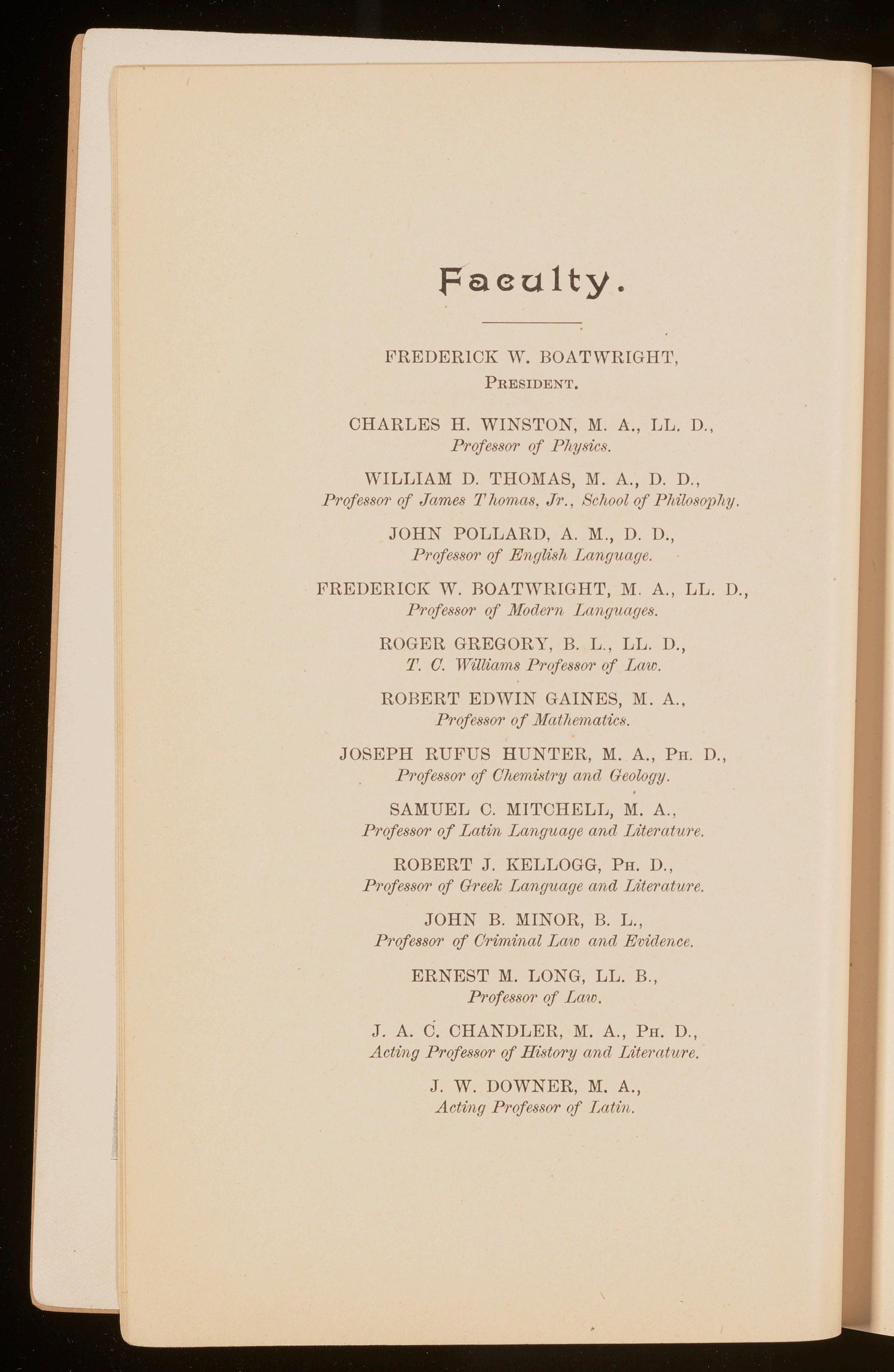
FREDERICK W. BOATWRIGH'l', PRESIDENT.
CHARLES H. WINSTO r, ll'I. A., LL. D., Pl'ofess01· of PliyNics.
\YILLIAM D. THOMAS, M. A., D. D., Profess01· of Jlimes Tltomas, Jr., Scltool of Philosophy.
JOHN POLLARD, A. M , D. D., P!'ofess01·of English Language.
FREDERICK W. BOATWRIGHT, l\'I A., LL. D., Professo1· of .Afoden1 Langzwges.
ROGER GREGORY, B. L, LL. D., T. 0. Willinms Profess01· of Law.
ROBERT EDWIN GAINES, M.A., Profess01· of .Afatltematics.
JOSEPH RUFUS HUNTER, M. A., Prr. D., Pl'ofess01·of Oltemist1·y and Geology.
SAMUEL C. MITCHELL, M. A., Professo1· of Latin Language and Lite1·ature.
ROBERT J. KELLOGG, Prr. D., Profess01· of (J,reelcLanguage and Literatu1·e.
JOHN B. MINOR, 13. L., Profess01· of C1·iminal Law and Evidence.
ERNEST 11-1.LONG, LL. 13., Profess01· of Law.
J. A. C. CHANDLER, M. A., Pn. D., Acting Profess01· of History and Litemture.
J. W. DOWNER, M A., Acting Pl'ofessor of Latin.
LECTUR.ER.S .
•TAMES HENRY BREASTED, Prr. D. (1897-'8). Egyptology.
WOODROW WILSON, Pn. D., LL. D. (1888-' 9) Constitutional Goi,e1'11inent.
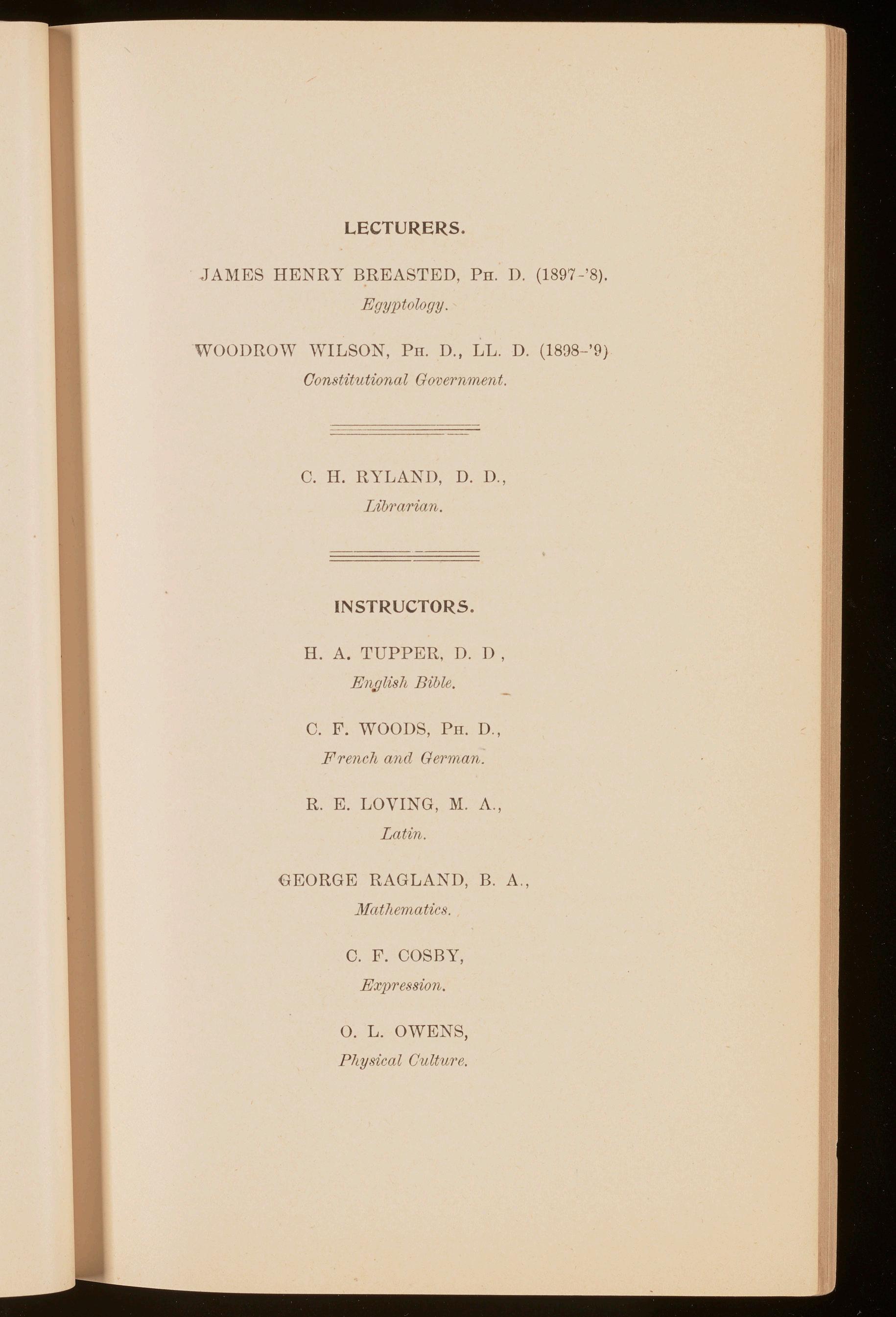
C.H. RYLAND, D. D ., f,ibrarian.
H . A. TUPPER, D. D , En!Jlish Bible.
C. F. WO ODS, Prr. D , French and Clei·man.
R. E. LOVING, M. A., Latin.
GEORGE RAGLAND, B. A., Jfatliematic8.
C. F. COSBY, Exp1·ession.
0. L OWENS, P hysical Cultun
SESSION 1898- '99.
1898-1'1wr8dny, September 22d-Opening of the Session.
189.9-l'uesday, Pebrum·y 7t7i-Beginning of Second H alf-Session .
1'ue8day, ]j'elJruary 7tli-Semi-annual Meeting of the Trustees_
Sunday, June 11tli-Oommencement Sermon.
Monday, June Utli - Oelebration of Literary Societies.
Tuesday, June 13th-Annual Meeting of the Tru stees .
1Vednesday, June 14th-Annual Meeting of Alumni.
1'lm1·sday, June 15th-Closing Exercises.
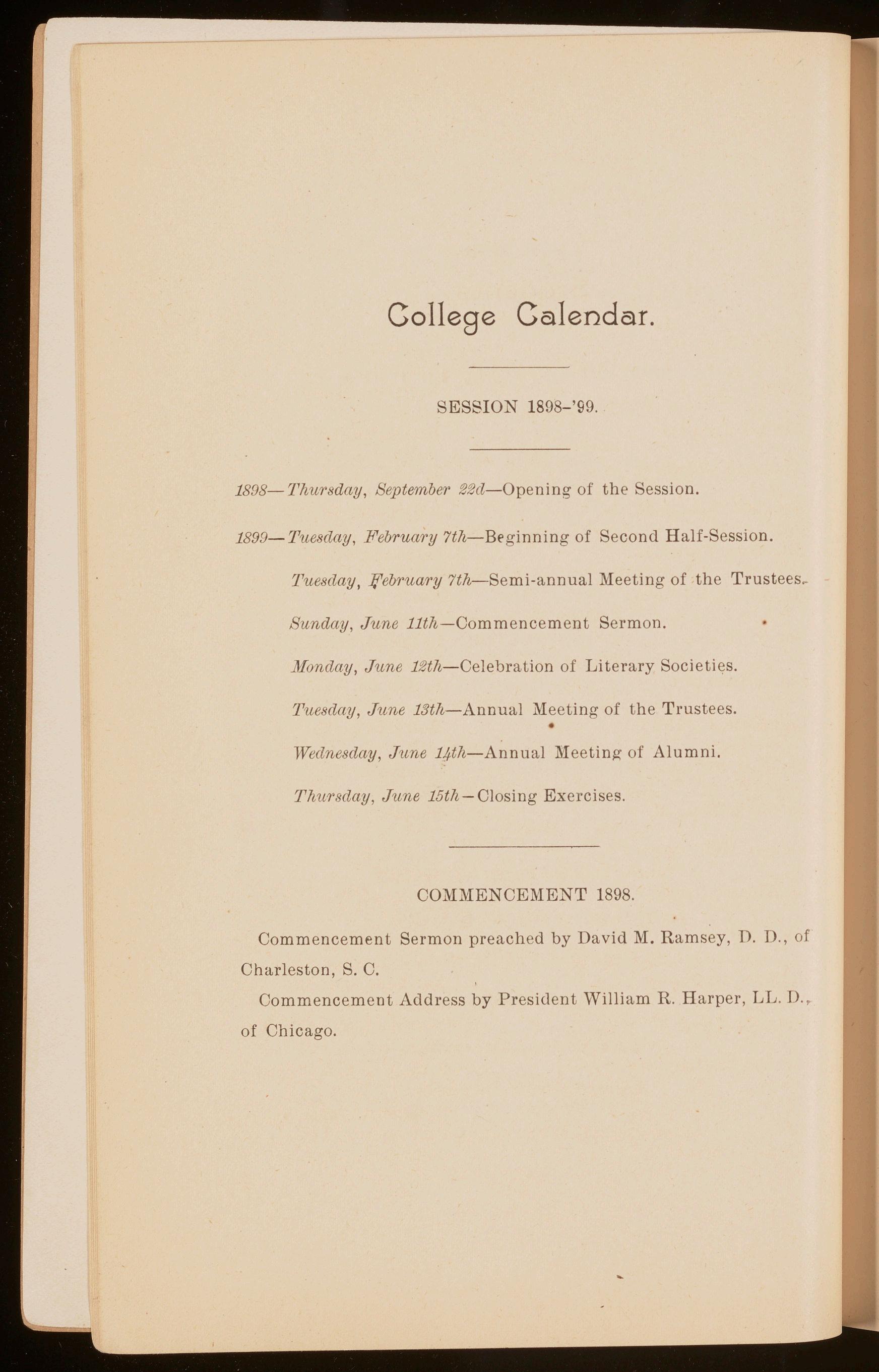
OOMMENOEl\IENT 1898.
Commencement Sermon preached by David M. Ramsey, n. D., of Charleston, S. 0.
Commencement Address by President William R. Harper, LL D. , o f Chicago.
Abbitt, Benj. B.
Appomattox Co., Va. Latin, Greek, English, Mathematics. Allen, Edgar L. King and Queen Co., Va
Latin, English, Mathematics. Alwood, James 0. Richmond, Va. Law.
Anderson, Charles C. Richmond, Va. Law.
Anderson, George E., Jr. Richmond, Va. Law, English, Expression.
Anderson, Walter B. Madison Co., Va.
Latin, :Mathematics, Physics, English Bible. Armistead, Edwin A. North Carolina. Latin, English, Mathematics, Physics. Bagby, A. Paul Prince Edward Co, Va
Greek, French, German, English.
Bagby, George P. Richmond, Va.
Latin, French, English, Philosophy.
Barksdale, Cha,rles C.
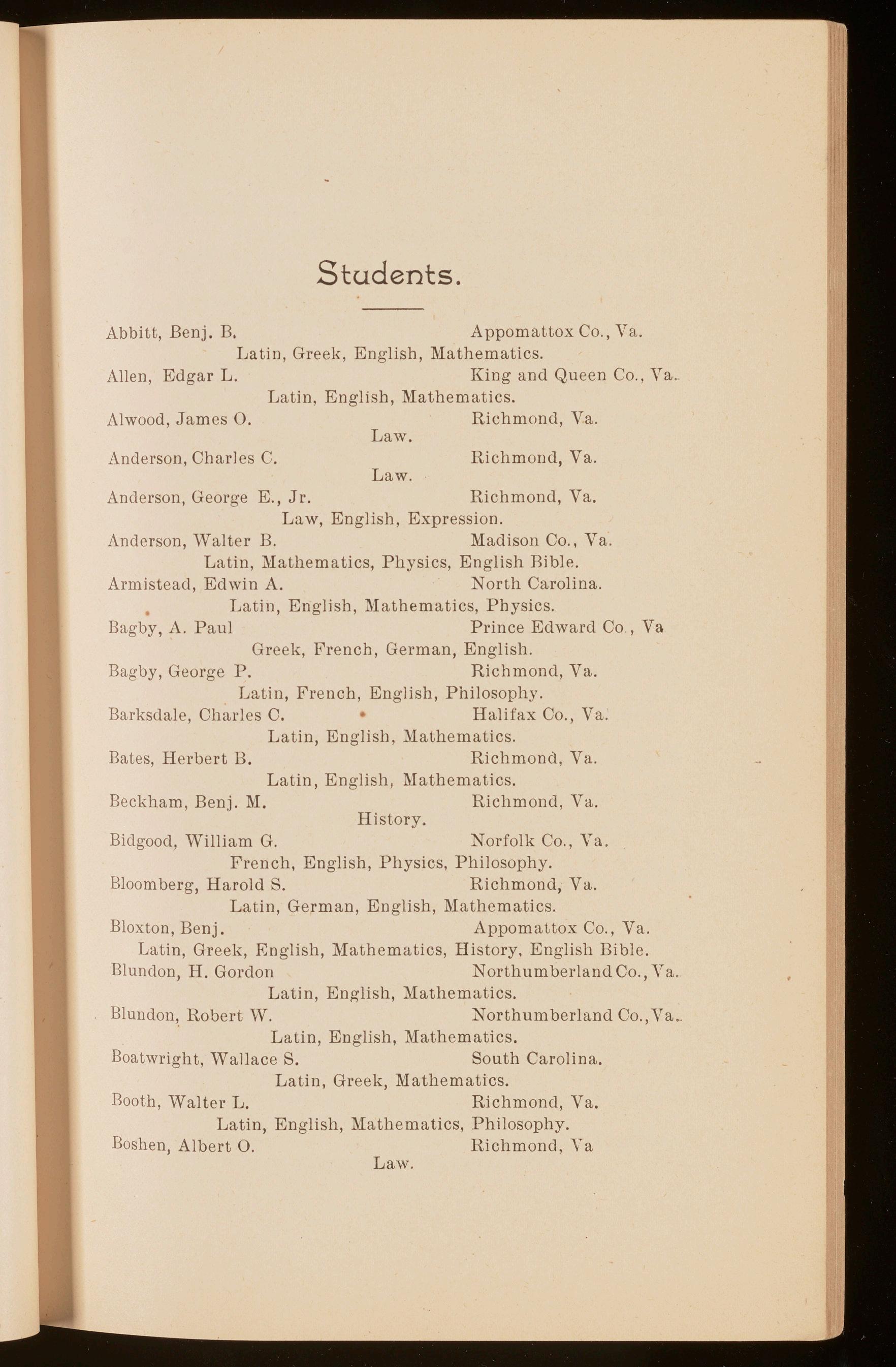
Halifax Co., Va.
Latin, English, Mathematics.
Bates, Herbert B. Richmond, Va.
Latin, English, Mathematics. Beckham, Benj. M. Richmond, Va. History.
Bidgood, William G.
Norfolk Co., Va.
French, English, Physics, Philosophy. Bloomberg, Harold S. Richmond, Va. Latin, German, English, Mathematics. Bloxton, Benj.
Appomattox Co., Va.
Latin, Greek, English, Mathematics, History, English Bible. Blundon, H. Gordon Northumberland Co., Ya.
Latin, English, Mathematics. Blundon, Robert vV. Northumberland Co., Va ..
Latin, English, Mathematics. Boatwright, Wallace S. South Carolina.
Latin, Greek, Mathematics.
Booth, Walter L. Richmond, Va. Latin, English, Mathematics, Philosophy. Boshen, Albert 0. Richmond, Ya Law.
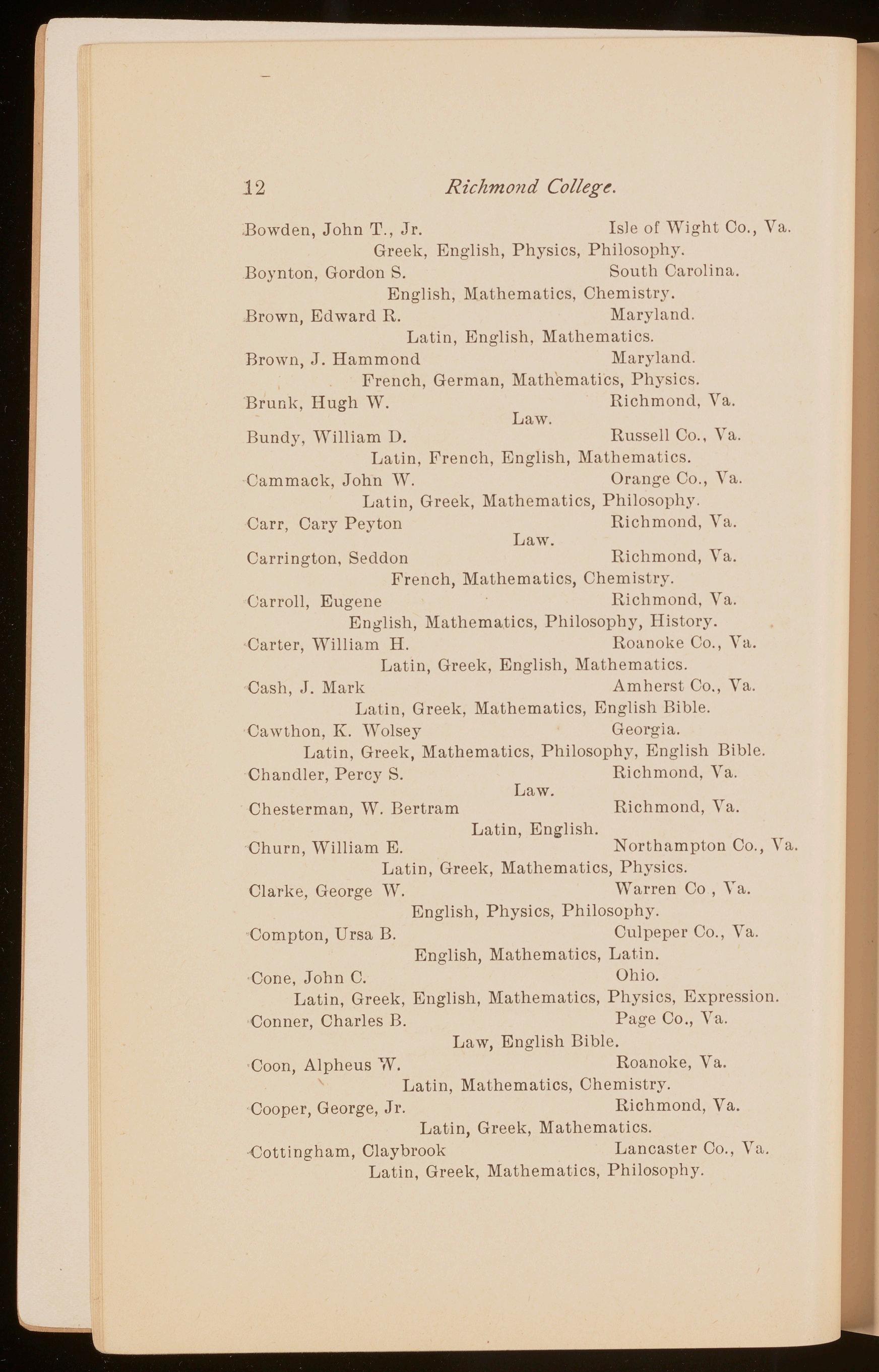
12 Richmond College.
Bowden, John T , Jr.
Isle of ""\YightCo., Va. Greek, English, Physics, Philosophy. Boynton, Gordon S. South Carolina.
English, l\Iathematics, Chemistry. Brown, Edward R. Maryland. Latin, English, Mathematics. Brown, J. Hammond Maryland. French, German, Mathematics, Physics.
Brunk, Hugh \V. Richmond, Ya. Law.
Bundy, William D. Russell Co., Ya. Latin, French, English, Mathematics. Cammack, John ""\V. Orange Co., Ya. Latin, Greek, Mathematics, Philosoph,\'Carr, Cary Peyton Richmond, Ya. Law.
Carrington, Seddon Richmond, Ya.
French, Mathematics, Chemistry. Carroll, Eugene Richmond, Ya. English, l\fathematics, Philosophy, History. Carter, ""\Yilliam H. Roanoke Co., Y,t. Latin, Greek, English, Mathematics. Cash, J. Mark Amherst Co., Ya. L[l,tin, Greek, Mathematics, English Bible. Cawthon, K. ""\Yolsey Georgia. Latin, Greek, Mathematics, Philosophy, English Bible. Chandler, Percy S. Richmond, Ya. Law.
Chesterman, ""\V.Bertram Richmond, Ya. Latin, English.
Churn, William E. Northampton Co., Ya. Latin, Greek, Mathematics, Physics. Clarke, George ""\Y. \Yarren Co, Ya. English, Physics, Philosophy. Compton, Ursa B. Culpeper Co., Ya. English, Mathematics, Lat.in. Cone, John C. Ohio.
Latin, Greek, English, Mathematics, Physics, Expression. Conner, Charles B. Page Co , Ya. Law, English Bible. Coon, Alpheus ~,v. Roanoke, Va.
Latin, Mathematics, Chemistry. Cooper, George, Jr. Richmond, Va. Latin, Greek, Mathematics.
Cottingham, Claybrook Lancaster Co., Ya. Latin, Greek, Mathematics, Philosophy.

Crim, J.E. South Carolina. Latin, Greek, Mathematics, Physics. Cullum, P. Cortez South Carolina. Greek, English, Mathematics, Philosophy.
Daffron, R. Emmett Richmond, Va. Law.
Daughtry, W. Bonnie Isle of Wig-ht Co, Va. French, German, Physics, Philosophy, English Bible Davis, Charles C C:troline Co., Va.
Greek, English, i\Iathematics.
DaYis/W. H., Jr. Norfolk, Va. Mathematics, Chemistry, Philosophy. Dawson, Luther Richmond, Va. Law.
Dean, Cla,ude M. Petersburg, Va. Law.
De:ws. Parke P. Isle of Wight Co, Va. Latin, Greek, English, Mathematics.
Dennis, Claude G. Norfolk Co., Va. Latin, English, Mathematics. DeYault, Samuel P. 'l.'ennessee. Latin, Greek, Mathematics, Philosophy, History. Dill, J. Murray Richmond, Va. Law.
Drew, Leslie H. Richmond, Va. Law.
Dudley, Horace L. Roanoke, Va. Latin, Greek, English, Mathematics.
Duke, Fred W. Norfolk Co., Va. Latin, French, German, Math ematics. Duke, William IL Norfolk Co, Va.
Latin, Mathematics, Physics.
Durham , Gordon C. North Carolin,t. Latin, Greek, English, Mathematics. Durham, Jitmes vV. Essex Co., Va.
La~in, Greek, English, Mathematics. Durrett, Robert vV.
Spotsylvania Co., Va.
Greek, English, Mathematics, Philosophy. Durst, William P. South Carolina. Latin, English, Mathemittics. Eckles, William L. Richmond, Va. Law.
Edwards , Willis W.R. Southampton Co., Va. English, Physics, Philosophy, History. Egbert, Harry C. Hanover Co., Va. German, English, Mathematics.
14
Eggleston, James H.
Ellyson, Douglas ·w.
Farrow, ·William W.
Richmond College.
Richmond, Ya.
English, English Bible.
Richmond, Ya.
Latin, English, l\Iathematics.
Richmond, Ya.
French, English, Expression. Foster, W. Brownley
RichmollCl, Va.
Mathematics, Chemistry, Physics, Philo ophy . Fox, James S.
Sou th Carolina.
Latin, French, German, Mathematics. Frazer, Goodwin Orange Co., Ya.
Frazer, John D.
Latin, Greek, Mathematics, Chemistry.
Orange Co., , •a. German, Mathematics, Physics, Philosophy. Freeman, Allen 1Y.
Richmond, Ya.
Latin, Mathematics, Physics, Philosophy.
Fugate, Henly JU.
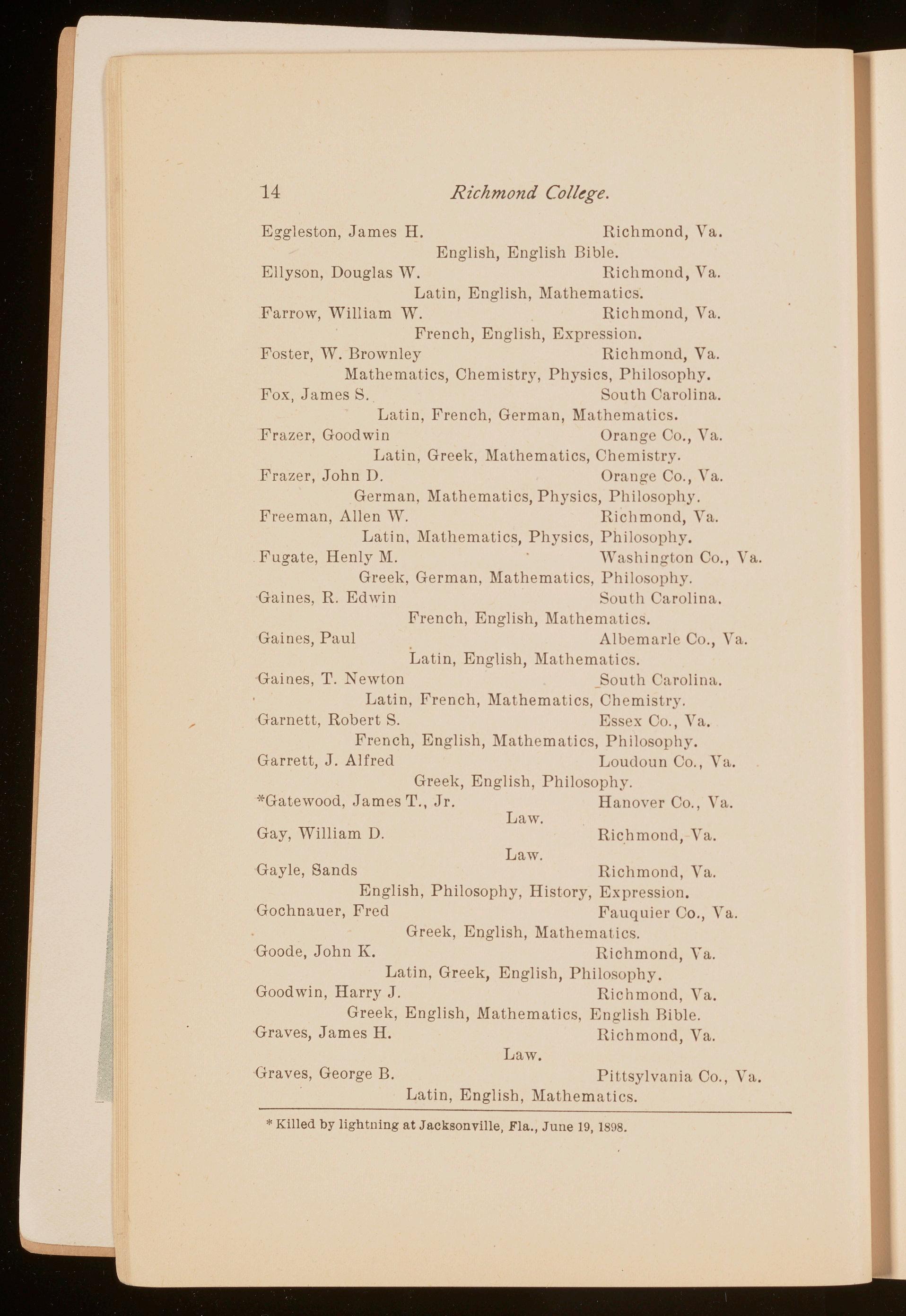
Washington Co., Ya.
Greek, German, Mathematics, Philosophy.
Gaines, R. Edwin South Carolina. French, English, Mathematics.
Gaines, Paul Albemarle Co., Ya.
Gaines, T. Newton
Latin, English, l\Iathematics.
South Caroli1rn. Latin, French, Mathematics, Chemistry.
Garnett, Robert S. Essex Co., Ya. French, English, Mathematics, Philosophy. Garrett, J. Alfred Lomloun Co., Ya. Greek, English, Philosophy.
*Gatewood, James T., Jr. Hanover Co., , •a. Law.
Gay, William D.
Gayle, Sands
Richmond, Ya. Law.
Richmond, Ya.
English, Philosophy, History, Expression. Gochnauer, Fred Fauquier Co., Ya.
Goode, John K.
Greek, English, Mathematics.
Richmond, Ya.
Latin, Greek, English, Philosophy. Goodwin, Harry J. Richmond, Ya.
Greek, English, Mathematics, English Bible. Graves, James H. Richmond, Ya. Law.
Graves, George B. Pittsylvania Co., ,·a. Latin, English, l\Iathematics.
* Killed by lightning at Jacksonville, Fla., June 19, 1898.
Graybill, Percy K., .Tr.
BotetourL Co., Va . Latin, English, Mathematics, Physics. Gregory, George E. King William Co., Ya. English, Mathematics, Chemistry.
Griffith, W. Harry Page Co., Va.
Grimsley, Herbert H.
Guerrant, John G.
Guerrant, John 1V. Law, English. Law. Law. Law. Culpeper Co., Va.
Gwaltney, James n.
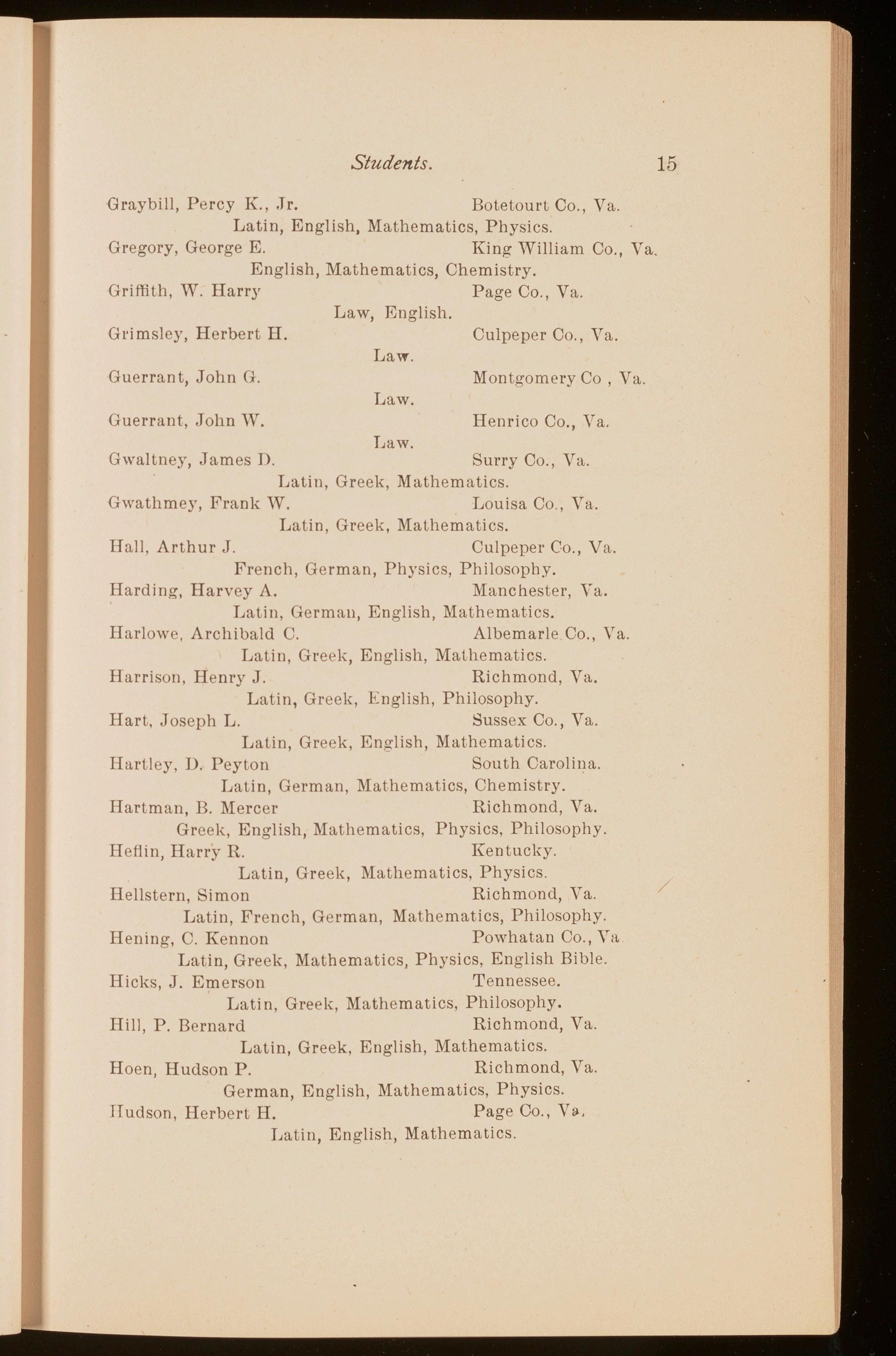
Montgomery Co, Ya.
Henrico Co., Ya.
Surry Co., V<L. Latin, Greek, Mathematics.
Gwathmey, Frank iV.
Louisa Co., Ya. Latin, Greek, Mathematics. Hall, Arthur J. Culpeper Co., Va. French, German, Physics, Philosophy.
Harding, Han·ey A. 11,fanchest er, Ya. Latin, German, English, Mathematics. Harlowe. Archibald C. Albemarle Co., Ya. Latin, Greek, English, Mathematics. Harrison, Henry J. Richmond, Ya. Latin, Greek, English, Philosophy. Hart, Joseph L. Sussex Co., Va. Latin, Greek, English, Mathematics.
Hartley, D. Peyton South Carolina. Latin, German, Mathematics, Chemistry. Hartman, B. Mercer Richmond, Va. Greek, English, Mathematics, Physics, Philosophy. Heflin, Harry R. Kentucky. Latin, Greek, Mathematics, Physics. Hellstern, Simon Richmond, Ya. Latin, French, German, Mathematics, Philosophy. Ilening, C. Kennon Powhatan Co., Ya Latin, Greek, Mathematics, Physics, English Bible. Hicks, J. Emerson Tennessee. Latin, Greek, Mathematics, Philosophy. Hill, P. Bernard Richmond, Va. Latin, Greek, English, Mathematics. Hoen, Hudson P. Richmond, Va. German, English, Mathematics, Physics. Hudson, Herbert H. Page Co., v~. Latin, English, Math e matics .
Hurt, John Jeter
Hutchison , Benjamin 0.
Ric!mzond College.
Powhatan Co., Va.
English, l\lalhematics, Philosophy, Hist ory, Law.
Ives, Arlington L
Latin, French, German, ~fa}hematics, Philos ophy.
Princ e William Co., Va
:Norfolk Co., V,t.
Latin, English, ~Iathematics.
Jeffress, John B., Jr .
Johnson, John E.
Jones, Allan D.
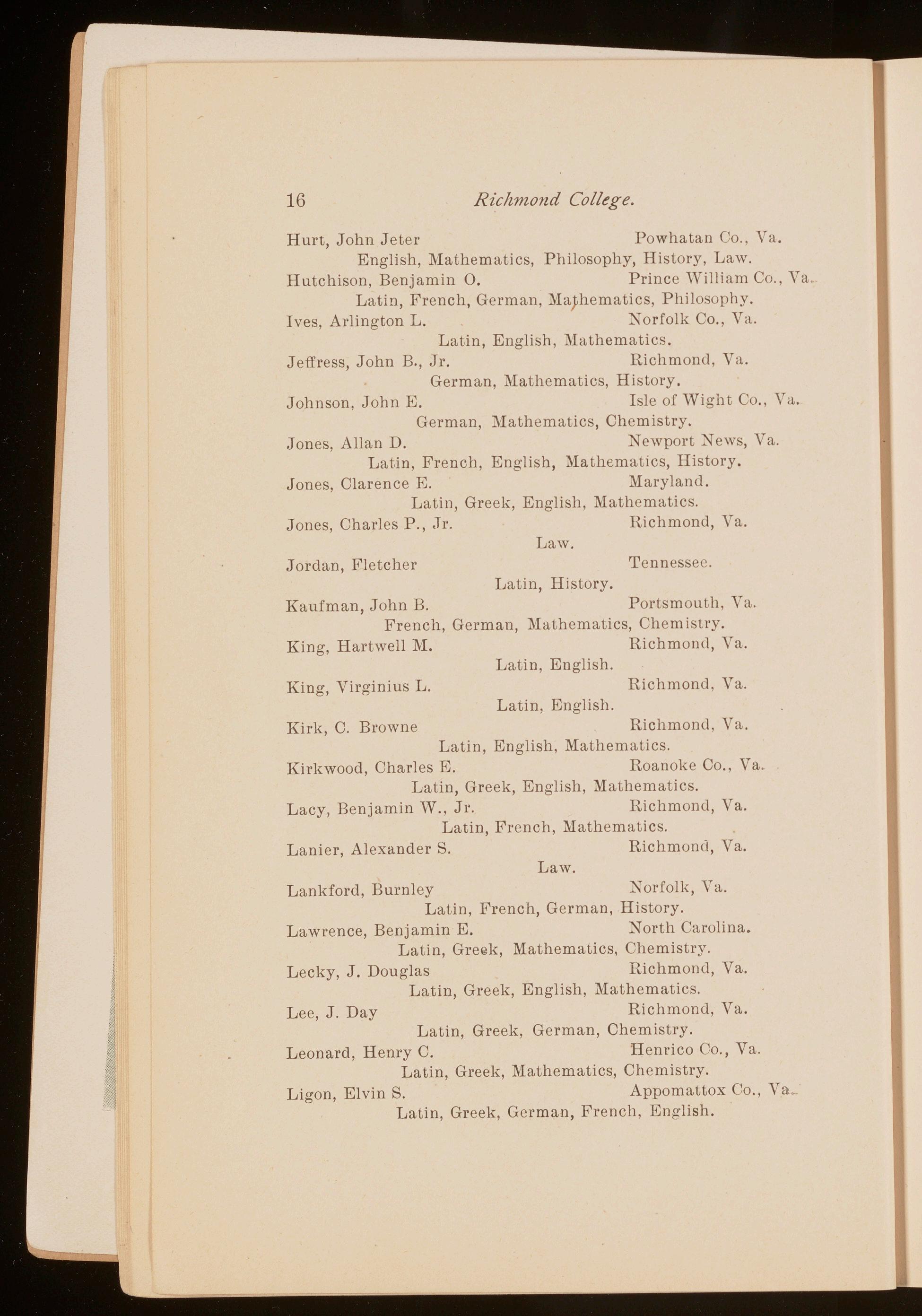
Richmond, Va.
German, MathemMics, History.
Isle of Wight Co., Va.
German, ~Iath cmatics, Chemistry.
Jones, Clarence E.
Latin, French, English, Mathematics, History.
Xewport :News, Va.
Maryland
Latin, Gre ek, English, Math e matics.
Jones, Charles P., .Tr.
Jordan, Fletcher
Kaufman, John B.
King, Hartwell M.
Richmond, Va. Law.
Latin, History.
T e nness ee .
Portsmouth, Va.
French, German, Mathematics, Ch e mistry.
King, Virginius L.
Kirk, C. Browne
Richmond, Va.
Latin, English.
Richmond, \'a . Latin, English.
Richmond, V,t.
Latin, English, Mathematics.
Kirkwood, Charles E.
Roanok e Co., Va
Latin, Greek, English, Mathematics. Lacy, Benjamin W., Jr.
Richmond, Va.
Latin, Fr ench, 1fathematics.
Lanier, Alexander S.
Lankford, Burnley
Lawrence, Benjamin E.
Richmond, Va. Law.
:Norfolk, V,t.
Latin, French, German, History.
:North C,trolina. Latin, Grellk, Mathematics, Chemistry. Lecky, J. Douglas
Richmoml, Va.
Latin, Greek, English, Mathematics. Lee, J. Day
Richmond, Va
Latin, Greek, German, Chemistry.
Leonard, Henry C.
Ligon, Elvin S.
Latin, Greek, Mathematics, Chemistry.
Henrico Co., Va .
Appomattox Co. , Va . Latin, Gr eek, German, French, English.

Lloyd, Lynton B. Manchester, Va. German, Chemistry, Philosophy.
Loving, Robert E. Fluvanna Co., Va. l\Iathematics, Chemistry.
Lowe, Willis K
Prince William Co., Va. Latin, Greek, l\Iathematics, Philosophy.
Lumpkin, George T. Essex Co., Va. Latin, Greek, English, Mathematics, Chemistry. Lynch, Montgomery Colorado.
Latin, Greek, English, Mathematics. :McAdams, Thomas Branch Richmond, Va. Greek, German, Mathematics, Physics, Philosophy.
l\IcBain, H. Lee Richmond, Va. German, French, Mathematics, Physics, Philosophy. McCabe, James P., Jr. Bedford Co., Va.
Latin, Greek, English, Mathematics.
l\IcCaul, Thomas V. Richmond, Va.
Latin, English.
McFarland, Robert A. North Carolina. Latin, Greek, English, Mathematics.
l\IcKim, Robert L. Page Co., Va. Latin, English, Chemistry.
McNeill, Walter S. South Carolina. Latin, French, German, History.
McNiel, John W. T. Franklin Co., Va. German, French, Mathematics, Physics, Philosophy. l\Iabry, Giddings E. Florida. Latin, Greek, English, Philosophy. Mabry, Jesse H. Florida.
Latin, Greek, Mathematics, Philosophy. Marshall, Thomas F,., Jr. Richmond, Va. Law.
l\Iartin, Julian B. Caroline Co., Va. German, French, English, Mathematics. Martin, Melvin A. Richmond, Va.
Latin, English, Philosophy. Mason, George F. Richmond, Va. Latin, Greek, English, Philosophy, Expression. Mercer, I. M. Richmond, Va. History.
Michaux, William W. Richmond, Ya. French, German, English, Chemistry. Mitchell, John Douglas King and Queen Co., Va. French, English, Chemistry.

18
Mobley, William A.
l'tloncure, Richard 0. L.
Richmond College.
South Carolina. Latin, Greek, ofathematics
West Yirginia. Latin, Greek, Mathematics. English Bible. Moncure, Orlando S.
Caroline Co., Ya . :Olooklar, William T .
King "'illiam Co., \'a. Richmond, Ya. l\Ioore, Fred W.
1\1oran, Thomas E. Law. Law. Law.
Xorfolk. Ya . Latin, Greek, Physics, Phil osophy. Moore, John A.
Augusta Co., \ 'a. English, Law. Moore, J. Hall. Jr.
Richmond, Ya. Law. Morgan, John \Y.
Latin, Greek, English, Philosophy, Expression. :Oiorgan, Samuel L.
Culpeper Co., Y,t.
Culpeper Uo., \ ' a. Latin, Gr eek, English, Philos ophy, Expression. Moses, Jo.siah Ohio.
Latin, Greek, ;\fathematics, Philosophy. Motley, J. Coleman Richmond. Ya. Latin, ::iiathematics, Physics. Mundy, 'iYalker L.
Albemarl e Co., Yit. Latin , French, English, ;\fathematics. English Bible Munford, Robert B., Jr.
Richmond, Ya. English, Mathematics. Physics, Philosophy. Musselman, Hugh 'l'.
Stafford Co., Ya. Greek, English, Philosophy, English Bible. Myers, Percy H
Georgia . Latin, French , English, l\Iathematics, :Myers, Vi\'ian M.
Georgia . Latin, German, Mathematics, Chemistry. Neathery, Robert W.
Halifax Co., Ya. Latin, Greek, Mathematics, Philosophy. Nichol:ls, Henry 0.
Richmond, Ya Chemistry, Philosophy. History. Noffsinger, Hugh G.
Norfieet, Herbert L.
Botetourt Co., 'Va. F rench, German, ::ifathematics, Physics, Philosophy.
Norris, Robert 0. , Jr.
Richmond , \ 'a Law
Lancaster Co.. Ya. Latin, French, Mathematics, Physics, Philosophy. Owens, Oscar L.
Nansemoncl Co., Ya. Mathematics, Philosophy, History, Expression.
Parke, A. Winfield Arkansas. English, Mathematics, Chemistry.
Parker, John A. Richmond, Va. Latin, English, Philosophy.
Pearson, Charles C. Lancaster Co., Va. Latin, Greek, Mathematics, Physics, Philosophy. Peed, Eugene C. Maryland. Latin, Greek, English.
Pitt, Cullen S. Henrico Co., Ya. Latin, Greek, Mathematics, Physics.
Pollard, Robert N. Richmond, Va. Latin, English, Mathematics.
Pope, Newit H. Southampton Co., Va. Latin, English, Chemistry.
Poulson, Edwin T. Accomac Co., Va.
Greek, English, Mathematics.
Powell, William C. Loudoun Co., Ya. Latin, French, Mathematics.
Prince, 'iYilliam L. Sussex Co., Ya. French, German, Mathematics, Philosophy, History.
Quarles, Edwin L. Richmond, Va. Latin, French, Physics.
Ragland, George Richmond, Ya. French, German.
R:111er,Hal C.

Wythe Co., Va. French, English, Mathematics.
Rawley, J. Kent Richmond, Va. Law.
Rawls. Julian L. Isle of Wight Co., Ya. Latin, German, English, Mathematics.
Rew, Harry Accomac Co., Ya. Latin, Mathematics, Philosophy.
Richardson, William L. Franklin Co., Va. Latin, Greek, Chemistry, Philosophy.
Riddell, Eldridge V. Goochland Co., Va. Greek, German, Physics.
Rives, Robert S. Manchester, Va. Law.
Robinson, S. Straughan King William Co., Va. Mathematics, Physics, Philosophy.
Rudd, Clifford H. Richmond, Va. Latin, Greek, German, Mathematics.
Rudd, Wortley F. Chesterfield Co., Va. Latin, French, Philosophy.

20 Riclnnoud College.
Ruffin, Herbert C. Petersbul'g, Va.
Latin , English, Mathematic8, English Bible . Sanford, Harry B. Richmond, Va.
Latin, Mathematics, Physics, Philosophy, Chemistry. Sanford, T. Ryland Accomac Co , Va. Latin, Greek, Mathematics. Schwarzschild, Gus M Richmond, Va.
Latin, English, Mathematics.
Scott, Charles M. West Vil'gini.t.
Latin, English, .Mathematics, Chemistry.
Scruggs, J. Pendleton Fluv,mna Co., V,L. Latin, Greek, English, Philosophy.
Seay, "\V. Mosby Fluvanna Co., Va.
Greek, English, Mathematics, Chemistry.
Shaw, James New Jersey.
English, Philosophy, English Bible. Shepard, John 'IV Tennessee.
Greek. German, Physics, Philosophy.
Sheppard, Robert A. Richmond, Va. Law.
Skipwith, George N. Richmond, Va. Law.
Smith, Edward II Kentucky.
Latin, English, Mathemat.ics.
Smith, Gilbert C. North Carolina. Latin, Greek, English, Philosophy.
Smith, Loami J. South Carolina.
Latin, Greek, :\Iathematics.
Smith, William Pittsylvania Co., Va. Latin, French, Mathematics, Chemistry, Philosophy.
Sowell, Sidney l\I. Fluvanna Co., Va . Latin, Greek, English, Philosophy . Spencer, Thomas B. E. King and Queen Co., Ya. Latin, Greek, English, Mathematics.
Stiff, J. William Middlesex Co., Va. Mathematics, History.
Stacy, G. Palmer Richmond, Ya. Law.
Stone, Samuel M. Pittsylvania Co., Va. Latin, Greek, English, Mathematics
Stonnell, Vester L. Cumberland Co , Va. Latin, Greek, English, Philosophy.
Story, Elliott F. Southampton Co., Va. Law.
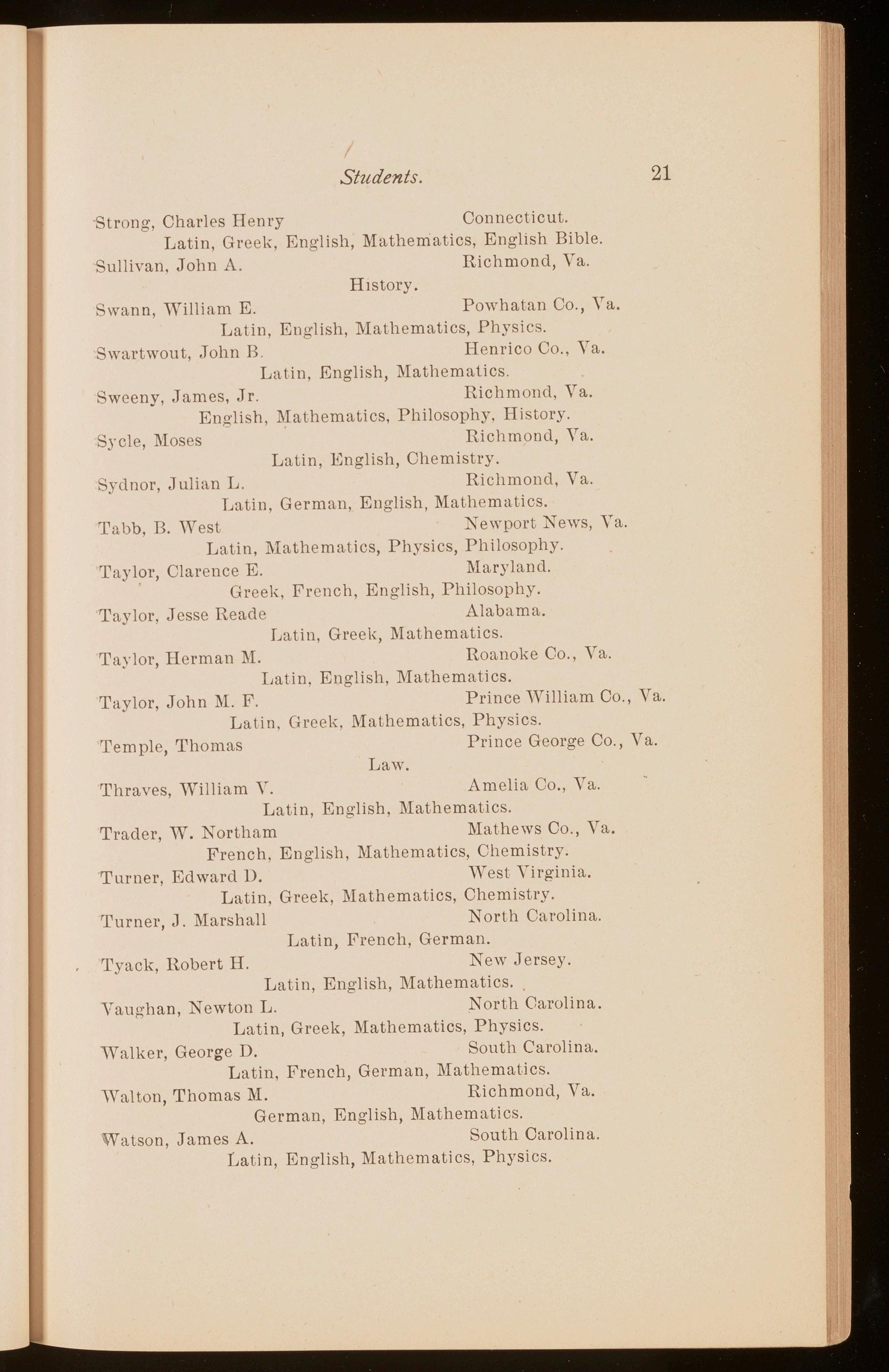
Strong, Charl('S Henry Connecticut Latin, Greek , English, MathemaLics, English Bible. Sullivan, John A . Richmond, Ya H1sLory.
Swann, 1Yilliam E Powhatan Co., Ya. Latin, English, Mathematics, Physics. Sw,irtwout, John B Henrico Co., Ya. Latin, English, l\Iathematics.
Sweeny, James, Jr. Richmond, Ya. English, l\Iathematics, Philosophy, History. Sycle, 1\Ioses Richmond, Ya. Latin, l<]nglish, ChemisLry.
Sydnor, Julian L . Richmond, Va. Latin, German, English, Mathematics.
Tabb, B. YVest Newport News, Ya. Latin, Math e matics, Physics, Philosophy Taylor, Clar e nce E. l\Iaryland. Greek, Fr e nch, English, Philosophy.
'l'aylor, Jesse Reade Alabama. Latin, Greek, Mathematics.
'l'aylor, Herman 1\I. Roanoke Co , Ya. Latin, English, l\fathem:tlics.
'l'aylor, John 1\1. F
Prince William Co., Va. Latin, Greek. l\Iathematics, Physics. Temple, Thomas Prince George Co , Ya. Law.
'l'hraves, ·William Y. Amelia Co., Ya. Latin, English, l\Iathematics. Trader, W. Northam l\Iathews Co., Ya. French. English, l\Iathematics, Chemistry. Turner, Edward D. '\Yest Yirginia. L,ttin, Greek, l\Iathematics, Chemistry. Turner, J. :Marshall North Carolina. Latin, French, German.
'l'yack, Robert H. New Jersey. Latin, English, Mathematics. Vaughan, Newton L. North Carolina. Latin, Greek, l\Iathematics, Physics.
1Valker, George D. South Carolina. Latin, French, German, Mathematics.
'\Talton, Thomas 1\1. Richmond, Ya. German, English, l\Iathematics. Watson, James A. South Carolina. Latin, English, Mathematics, Physics.
22
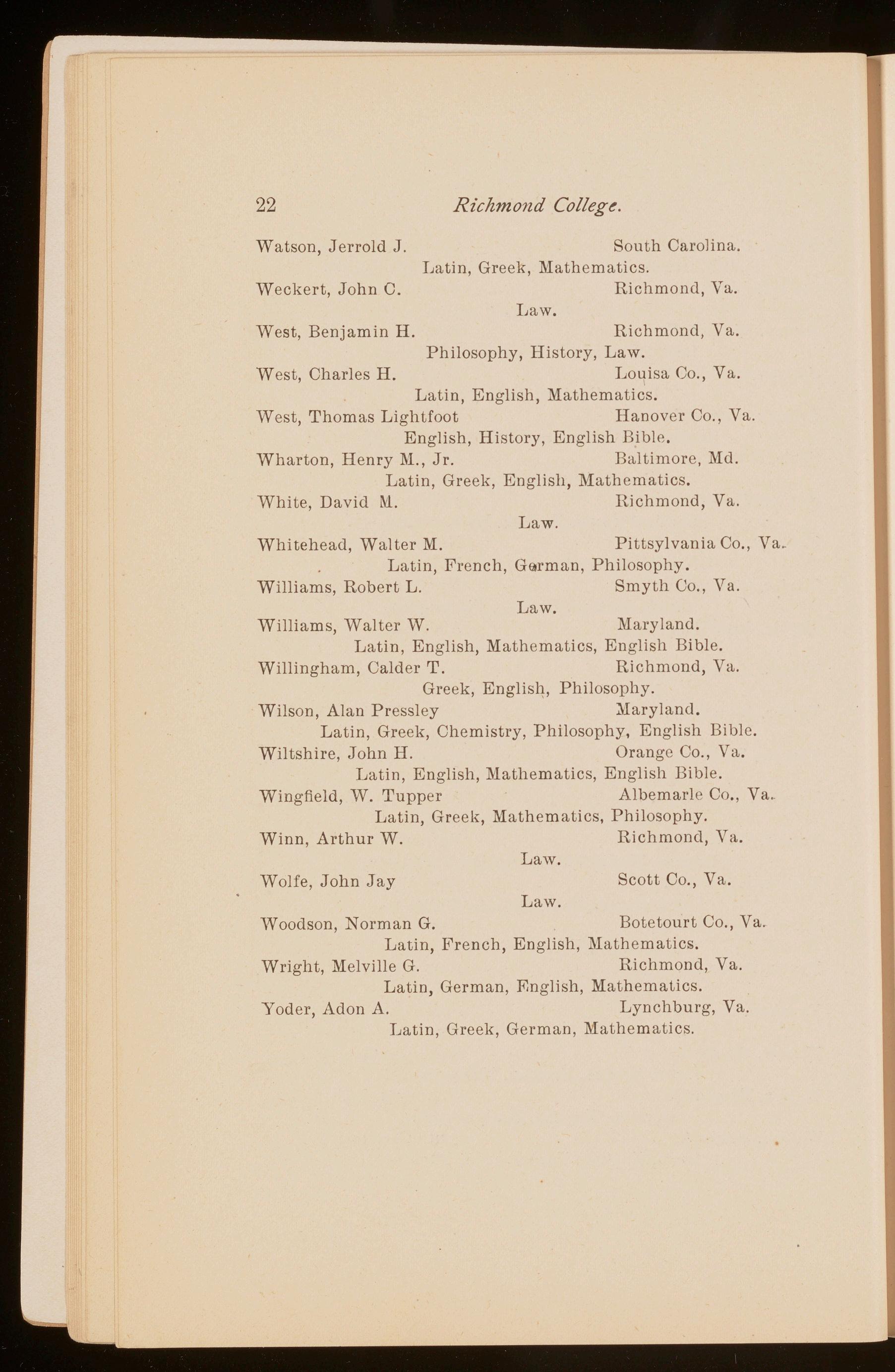
Riclzmond College.
Watson, Jerrold J. South Carolina. Latin, Greek, Mathematics. Weckert, John C. Richmond, Va. Law.
West, Benjamin H. Richmond, Va. Philosophy, History, Law.
"\Vest, Charles H. Louisa <Jo., Va.
Latin, English, Mathematics. West, Thomas Lightfoot Hanover Co., Va. English, History, English BiblP.
Wharton, Henry M., Jr. B,tltimore, ~Id. Latin, Greek, English, :Mathematics.
White, David i\l. Richmond, Va. Law.
Whitehead, Walter M. Pittsylvania Co., Va . Latin, French, Gorman, Philosophy.
Williams, Robert L. Smyth Co., Va. Law.
Williams, Walter W. Maryland. Latin, English, Mathematics, English Bible. Willingham, Calder T. Richmond, Va.
Greek, English, Philosophy. Wilson, Alan Pressley Maryland. Latin, Greek, Chemistry, Philosophy, English Bible. Wiltshire, John II. Orange Co., Va,. Latin, English, Mathematics, English Bible. Wingfield, W. Tupper Albemarle Co., Va. Latin, Greek, Mathematics, Philosophy. Winn, Arthur W. Richmond, Ya. Law.
Wolfe, John Jay Scott Co., Va. Law.
·woodson, Norman G. Botetourt Co., Va. Latin, French, English, Mathematics. Wright, Melville G. Richmond, Va.
Latin, German, F.nglish, Mathematics. Yoder, Adon A. Lynchburg, Va. Latin, Greek, German, Mathematics.

LATIN ...
GREEK
FRENCII
GERMAN .
ENGLISH .
l\tIATJIE)IA'l'ICS • PHYSICS.
CHE,IISTRY
PmLOSOPIIY ..
HISTORY
EXPRESSION ..
ENGLTSH BIBLE
LAW .•.
VIRGINIA
SOU'l'll CAROLINA
MAHYLAND
NOR'l'H CAROLINA
TENNESSEE .•.
GEORGIA
"\VEST VIRGINIA
FLOllIDA
KENTUCKY
Omo ....
NEW JERSEY
ALABAMA. ,

If new students will inform the President of the time of their expected arrival in Richmond, they will be met at the train by a member of the College Y. M. C. A., wearing the College colors, crimson and blue.
Students furnish their own rooms. The articles usually brought from home are one pillow and cases, one quilt, one pair blankets, sheets, towels , and toilet articles.
Rooms will be assigned whenever application is made. The best are usually engaged before opening of the session. A committee from the College Y. M. C. A. will be in the President's office to assist new students in the selection of rooms, room-mates, and to show them other courtesies.
Matriculation begins on Wednesday, September 21st. On Thursday evening the students are publicly welcomed by representatives of the city and the College. After this meeting a reception, at which refreshments are served, is tendered the new students by the College Y. M. C. A.
College classes are organized on Friday.
Interesting reunion exercises are held by the Literary Societies on Friday and Saturday evenings.
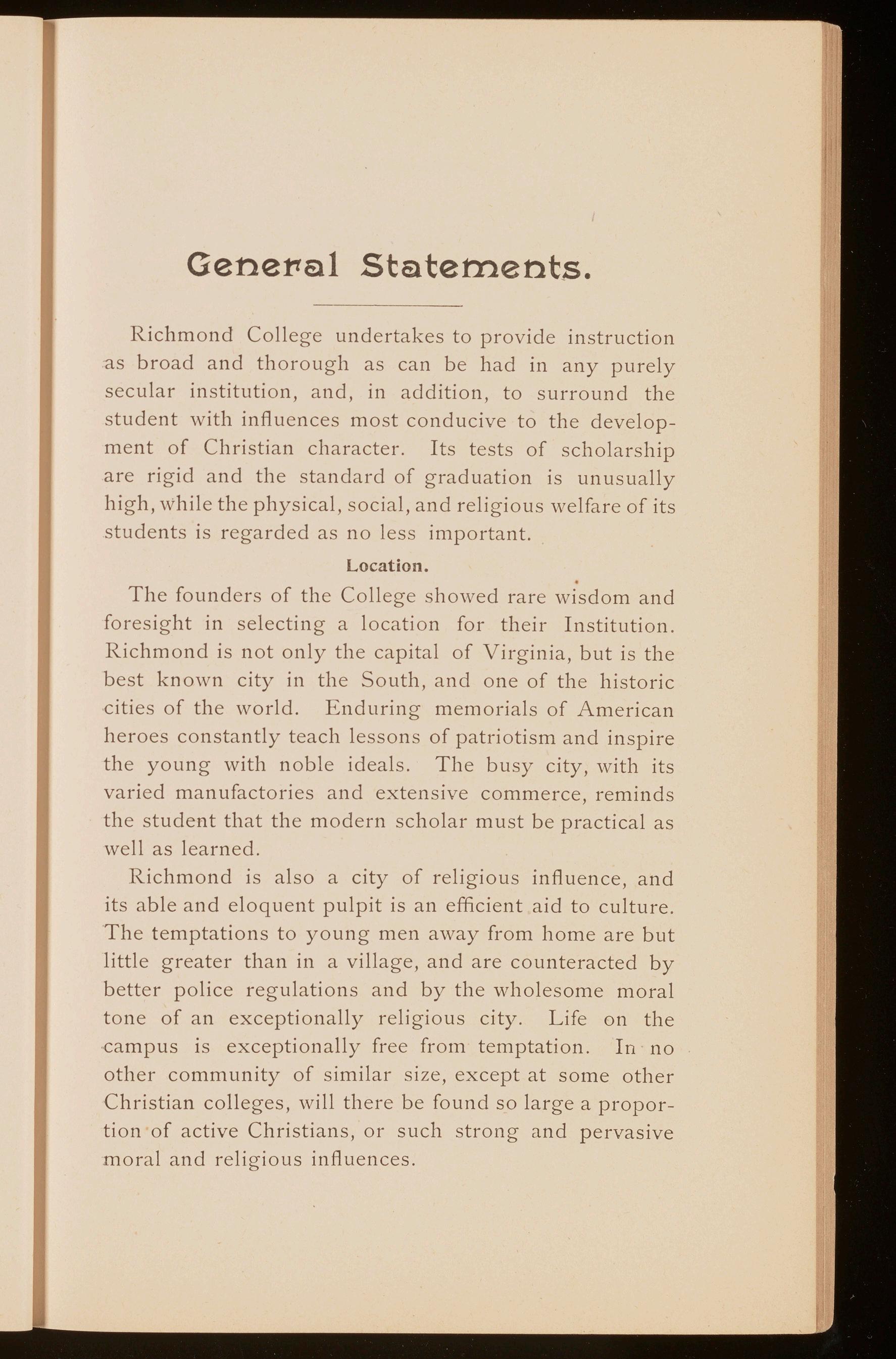
Richmond College undertakes to provide instruction as broad and thorough as can be had in any purely secular institution, and, in addition, to surround the student with influences most conducive to the development of Christian character. Its tests of scholarship are rigid and the standard of graduation is unusually high, while the physical, social, and religious welfare of its students is regarded as no less important.
The founders of the College showed rare wisdom and foresight in selecting a location for their Institution. Richmond is not only the capital of Virginia, but is the best known city in the South, and one of the historic cities of the world. Enduring memorials of American heroes constantly teach lessons of patriotism and inspire the young with noble ideals. The busy city, with its varied manufactories and extensive commerce, reminds the student that the modern scholar must be practical as well as learned.
Richmond is also a city of religious influence, and its able and eloquent pulpit is an efficient aid to culture. The temptations to young men away from home are but little greater than in a village, and are counteracted by better police regulations and by the wholesome moral tone of an exceptionally religious city. Life on the campus is exceptionally free from temptation. In no other community of similar size, except at some other Christian colleges, will there be found so large a proportion of active Christians, or such strong and pervasive moral and religious influences.
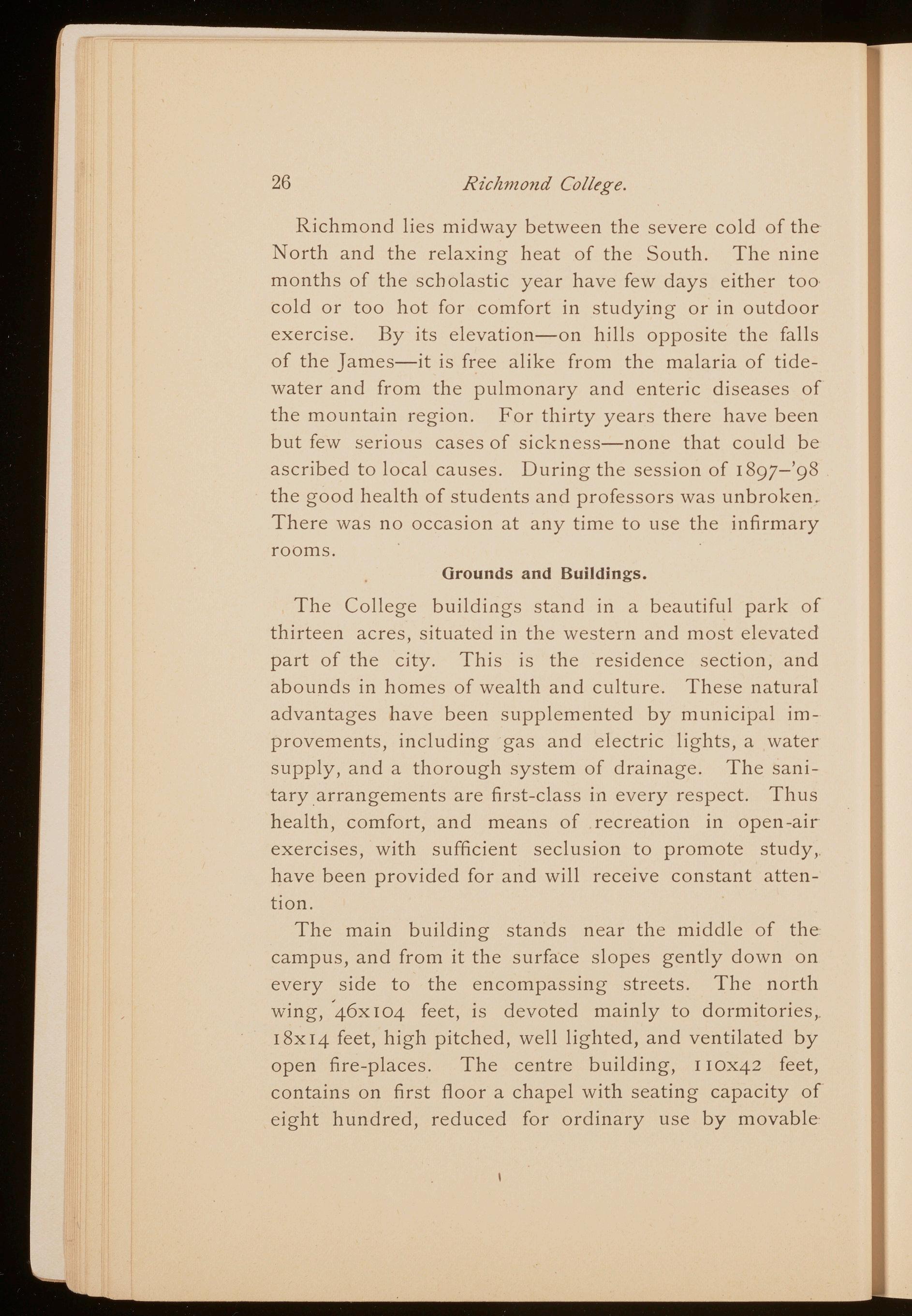
Riclznzond College.
Richmond lies midway between the severe cold of the North and the relaxing heat of the South. The nine months of the scholastic year have few days either too cold or too hot for comfort in studying or in outdoor exercise. By its elevation-on hills opposite the falls of the James-it is free alike from the malaria of tidewater and from the pulmonary and enteric diseases of the mountain region. For thirty years there have been but few serious cases of sickness - none that could be ascribed to local causes. During the session of I 897-'98 the good health of students and professors was unbroken There was no occasion at any time to use the infirmary rooms.
The College buildings stand in a beautiful park of thirteen acres, situated in the western and most elevated part of the city. This is the residence section, and abounds in homes of wealth and culture. These natural advantages have been supplemented by municipal improvements, including gas and electric lights, a water supply, and a thorough system of drainage. The sanitary arrangements are first-class in every respect. Thus health, comfort, and means of recreation in open-airexercises, with sufficient seclusion to promote study, . have been provided for and will receive constant attention.
The main building stands near the middle of the campus, and from it the surface slopes gently down on every side to the encompassing streets. The north wing, '46x104 feet, is devoted mainly to dormitories, 18x14 feet, high pitched, well lighted, and ventilated by open fire -places. The centre building, 11ox42 feet, contains on first floor a chapel with seating capacity of eight hundred, reduced for ordinary use by movable
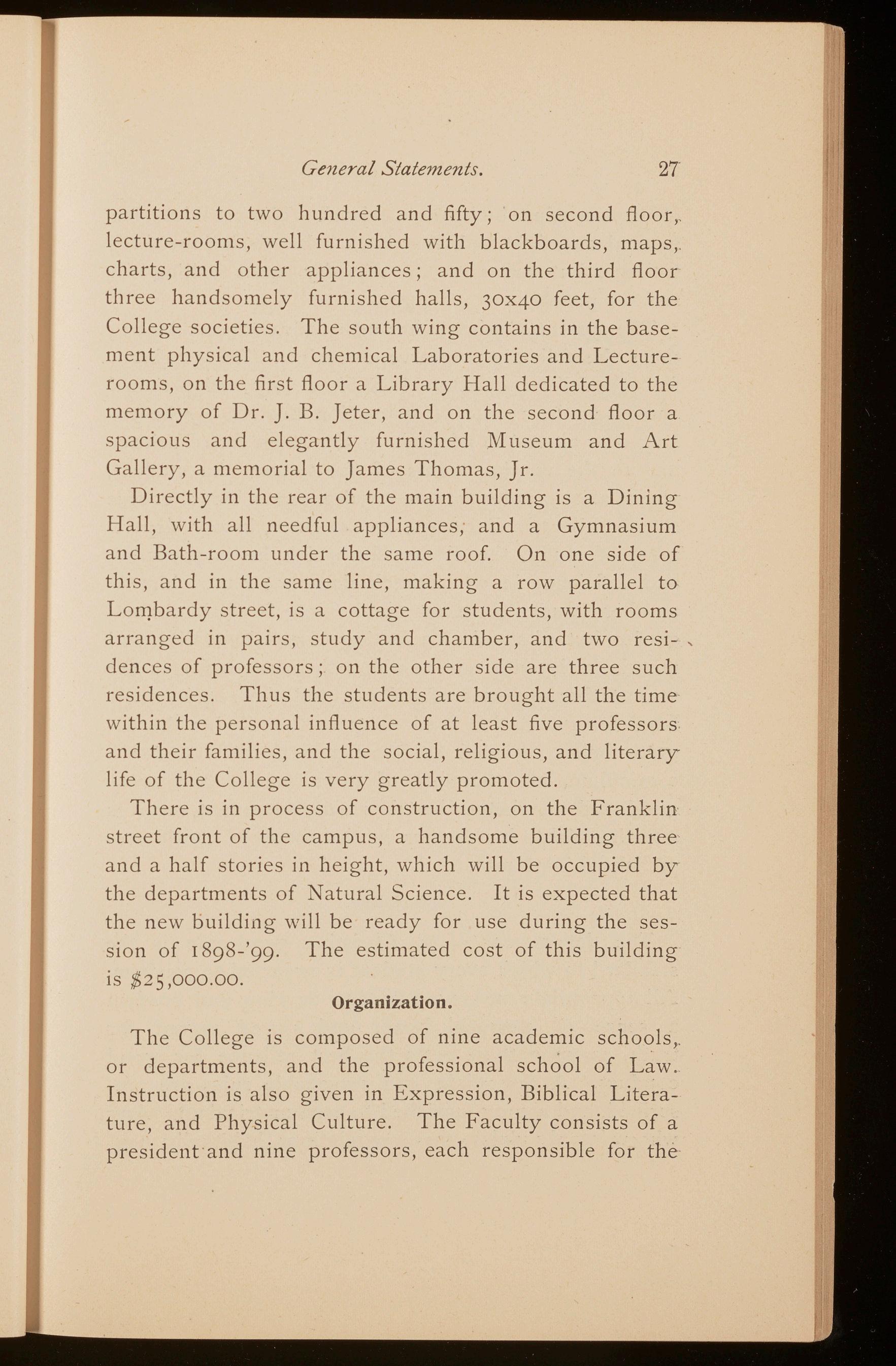
General Statements. 27 partitions to two hundred and fifty; on second floor, , lecture-rooms, well furnished with blackboards, maps, charts, and other appliances; and on the third floor three handsomely furnished halls, 3ox40 feet, for the College societies. The south wing contains in the basement physical and chemical Laboratories and Lecturerooms, on the first floor a Library Hall dedicated to the memory of Dr. J. B. Jeter, and on the second floor a spacious and elegantly furnished Museum and Art Gallery, a memorial to James Thomas, Jr.
Directly in the rear of the main building is a Dining Hall, with all needful appliances, and a Gymnasium and Bath-room under the same roof. On one side of this, and in the same line, making a row parallel to Lorr}bardy street, is a cottage for students, with rooms arranged in pairs, study and chamber, and two resi- , dences of professors; on the other side are three such residences. Thus the students are brought all the time within the personal influence of at least five professors and their families, and the social, religious, and literary life of the College is very greatly promoted.
There is in process of construction, on the Franklin street front of the campus, a handsome building three and a half stories in height, which will be occupied by the departments of Natural Science. It is expected that the new building will be ready for use during the session of 1898-'99. The estimated cost of this building is $25,000.00.
The College is composed of nine academic schools, or departments, and the professional school of Law. Instruction is also given in Expression, Biblical Literature, and Physical Culture. The Faculty consists of a president and nine professors, each responsible for the

efficient conduct of his own school. The president has general oversight and direction of the discipline of the College, but refers to the Faculty cases calling for serious penalty.
The system of schools has many advantages. Among them the following deserve attention : The professor feels the full force both of individual duty and personal ambition; the course of instruction can readily be enlarged or altered to adapt it to the progress of science and to the varying wants of the times ; the student, whose aims or preparation require, can select a course suited to his peculiar case; he can enter, in any department of study, the classes for which he is prepared, and deficiency in one branch does not retard him in another; students are not divided into fixed classes and grades, but all stand on a footing of social equality, and mingle freely with one another; the system favors the utmost thoroughness of culture, and the requirements fixed for graduation lend unity to the whole; the degrees being awarded to fewer persons than under a curriculum, are therefore of more value; and every good student, whether he takes a degree or not, receives a testimonial to his success in the shape of Certificates or School Diplomas.
The deportment of a Christian gentleman is the standard to which every student is expected to conform. All appropriate means are used to develop and confirm a sense of personal honor and sacred regard for truth, as upon these rests the best reliance for good conduct. A few plain and reasonable rules are prescribed, and a copy furnished to each matriculate. Any who wantonly violate these regulations, habitually neg-
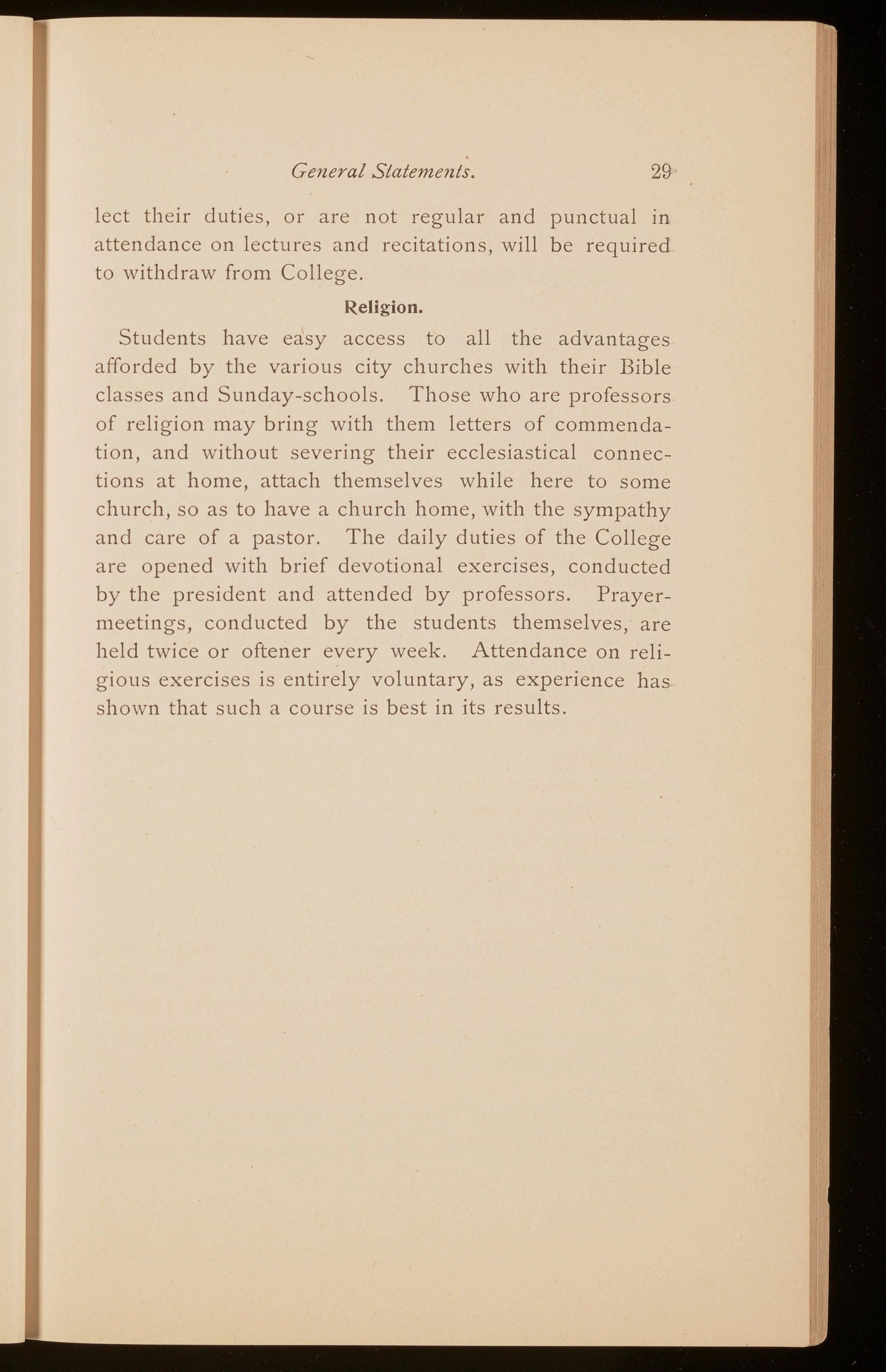
General Statements. 29 lect their duties, or are not regular and punctual m attendance on lectures and recitations, will be required to withdraw from College.
Students have easy access to all the advantages afforded by the various city churches with their Bible classes and Sunday-schools. Those who are professors of religion may bring with them letters of commendation, and without severing their ecclesiastical connections at home, attach themselves while here to some church, so as to have a church home, with the sympathy and care of a pastor. The daily duties of the College are opened with brief devotional exercises, conducted by the president and attended by professors. Prayermeetings, conducted by the students themselves, are held twice or oftener every week. Attendance on religious exercises is entirely voluntary, as experience has shown that such a course is best in its results.
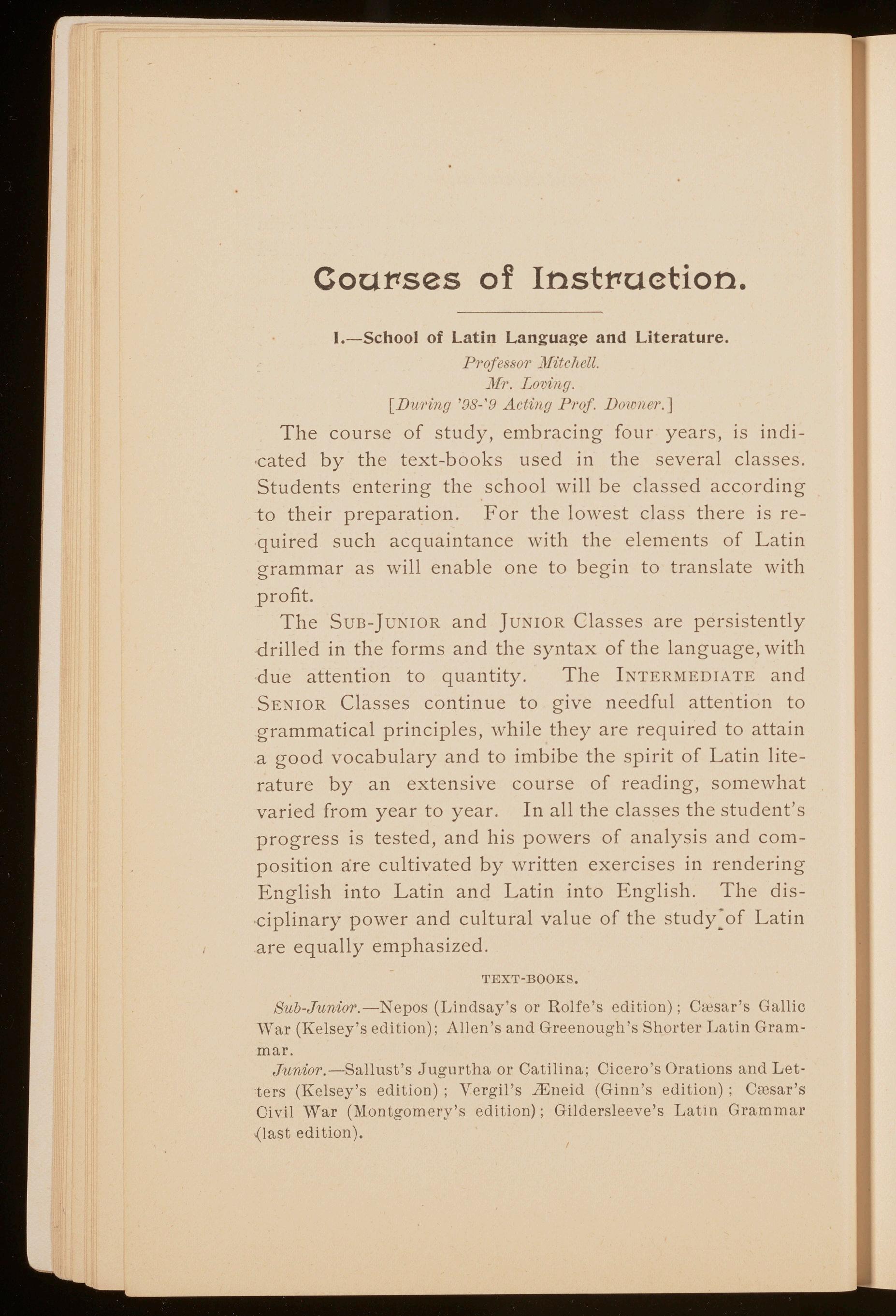
1.-Sc hool of Latin Lang uage a nd Literat ure.
Proj1:Mor Jfitcl1dl.
Jfr. Lnl'ing.
[During '!J8-'9 Acting Pl'lif. Do1r11a.]
The course of study, embracing four years, 1s indi•Cated by the text-books used in the several classes. Students entering the school will be classed according to their preparation. For the lowest class there is required such acquaintance with the elements of Latin grammar as will enable one to begin to translate with profit.
The SuB-Ju;-.;IOR and JUNIOR Classes are persistently drilled in the forms and the syntax of the language, with due attention to quantity. The INTERMEDIATE and SENIOR Classes continue to give needful attention to grammatical principles, while they are required to attain a good vocabulary and to imbibe the spirit of Latin literature by an extensive course of reading, somewhat varied from year to year. In all the classes the student's progress is tested, and his powers of analysis and composition are cultivated by written exercises in rendering English into Latin and Latin into English. The disciplinary power and cultural value of the study:of Latin are equally emphasized.
TEXT-BOOKS,
Sub-Junior.-Nepos (Lindsay's or Rolfe's edition); Ciesar's Gallic ·war (Kelsey's eu.ition); Allen's and Greenough's Shorter Latin Grammar.
Junioi·.-Stillust's Jugurtha or Catilina; Cicero's OraLions and Letters (Kelsey's edition); Vergil's JEneid (Ginn's edition); Crosar's Civil V{ar (i\lontgomery's edition); Gildersleeve's Latrn Grammar {last edition).

Intermediate .-Livy; Horace; Cicero de Senectute et de Amicitia; The Agricola or Germania of Tacitus; Plautus' Captivi; Gildersleeve's Grammar (last edition): assigned portions of Cicero's works for private reading. The leading Metres in Latin will be carefully studied. MacKail's Latin Literature. Exercises in Latin Prose Composition.
Senior.-The Satires of Juvenal; Cicero de Oratore (Owen's edition): The Annals and Histories of Tacitus, Quintilian, Terence, -Cicero de Natura Deorum. Assigned works for private reading. Original exercises in Latin prose composition.
For Reference: Harper's Latin Lexicon; Smith's English-Latin Dictionary; Ginn's Classical AUas; Gayley's Classic Myths.
11.-School of Greek Language and Literatui;e.
Profe8s01·Kellogg.
The aim in this School is three-fold: (I) to enable the student, by the mastery of vocabulary, inflections, syntax, and idiom, to read Greek with accuracy and readiness; (2) to give a clear insight into the life, genius, and achievements of the Greeks; (3) to cultivate habits of accurate expression, and a sense for Greek literary standards.
The pla·n of instruction is as follows:
The SUB-JUNIOR CLASS begins with the alphabet, and, with daily exercises and frequent reviews, is occupied mainly in mastering inflections and vocabulary, including principal parts of verbs, and in acquiring the ability to read simple Greek prose. The Anabasis is begun in the Spring.
In the JUNIOR CLASS Xenophon's Anabasis is read, and upon this is based drill in pronunciation, inflections, syntax, composition, vocabulary, idioms, and verbs. To this is added translation at sight and hearing, and incidental study of phases of Greek life suggested by the Anabasis.
The INTERMEDIATE CLASS reads: (r) Homer; (2) lyric poets; (3) historians. This is accompanied by syste-

32 Richmond College.
matic composition work, and by a study of (1) Homeric criticism and dialect; (2) pre-Attic Greek literature; and (3) Greek life. Tlte course on tlte History of Greece in tlte Sc/tool of History, or a fair equivalent, must precede entrance to tlte Intermediate Class in Greek. During tlte year r898-'9 t!te two courses may be take1z simultaneously by specz'al arrangemmt wz'tlz tlte Professor of Greek.
The SEXIOR Cuss reads: (r) Attic orators; (2) dramatists; (3) Plato, accompanied by a study of Attic literature, political institutions, advanced composition, and individual investigation of assigned topics from Greek history, customs, and literature. Parallel reading in English is required, especially in the two higher classes.
A class in the GREEK NE\v TESTAMENT is open to graduates and members of the Senior, Intermediate, and Junior Classes. Special investigation in this class will be accepted in place of like work in the Senior class.
'£EXT-BOOKS.
Sub-Junior.-White's First Greek Book; Colson's First Greek Reader; Harper & wallace's Xenophon's Anabasis; Goodwin's Greek Grammar; Pearson's Greek Prose Composition. Jiinior.-Anabasis, Grammar, and Composition as above.
hiterineclictte.-Goodwin's Grammar; Allinson's Greek Prose Composition; Keep's Homer's Iliad; Tyler's Greek Lyric Poets; Fernald's Selections from the Greek Historians; J ebb's Greek Literature. Senio1·.-Goodwin's Grammar; Allinson's Composition; Jebb's Selections from the Attic Orators; Jebb's Oedipus Tyrannus of Sophocles; Humphrey's Clouds of Aristophanes; Purves' Selections from Plato.
New Testament.-vVescott & Hort's Text; McClymont's New Testament and its writers.
For Reference: Liddell & Scott's Lexicon ; Yonge's English-Greek Lexicon; Rogue's Irregular Verbs of Attic Prose; Smith's Cla.ssical Dictionary; Gin n's Classical Atlas; Schreiber's Atlas of Classical Antiquities; Guhl & Koner's Life of the Greeks and Romans; Bliimner's Home Life of the Ancient Greeks; Gow's Companion to School Classics; Goodwin's Greek Moods and Tenses; Thayer's GreekEnglish Lexicon to the New Testament.

Courses of Instruction. 33
111.-School of fl.odern Languages. Pi·ojessor Boatw1·iglit. Dr. Woods.
French and German are the languages taught. The aim is to give the student a knowledge of vocabulary and grammatical structure sufficient to enable him to read their literature with understanding and pleasure. Secondarily, to teach him to speak these languages, and to understand them when spoken. In junior classes, modern authors are read, and language is taught as an art. In senior classes, . more attention is paid to the classics and to the scientific study of language structure. Much time is devoted to Literature and History.
The course is varied from year to year in order that advantage may be taken of the latest and best helps in this department of study. The following text-books were used during the past session:
FRENCH-Junior Glass.-Sym's First Year in French; Edgren's Grammar; Joynes' Contes de Fees; Un Oas de Conscience, Gervais; L'Expedition de la Jeune-Hardie, Jules Verne; Le Voyage de M. Perrichon, Labiche and i\Iartin; L' Abbe Constantin, Halevy; Le Cid, Corneille; French Composition, Grandgent. Dictation Exercises.
Senior Class.-Edgren's Grammar; Grandgent's Composition; Colomba, by Merinee; Lyrics from Beranger, Lamartine, Hugo, De Musset and Gautier; Merimee's Columba; Les Precieuses Ridicules ;i,ud L'Avare, by Moliere; Polyeucte, by Corneille; Hernani, by Victor Hugo; vVilkinson's Classic French Course in English; Lectures on French Literature in XVII. Century.
Pai·allel.-A Study of Life and Works of Moliere; Reading of Le Bourgeois Gentilhomme, and Le Misanthrope.
GERMAN-Junio1· Class.-First Lesson in German, by Harris ; Original Letters; Andersen's Bilderbuch ohne Bilder; Heyse's L'Arrabiata; Schiller's Neffe als Onkel; Storm's Immensee; Schiller's Wilhelm Tell; Exercises based on Immensee.
Senior Class. -Joynes-i\I eissner's Grammar; Harris' Prose Composition; White's Selections from Heine's Poems; Der Bibliothekar; Freytag's Doktor Luther; Goethe's Hermann und Dorothea; Lyrics from Goethe, Schiller, Platen, and others; Hosmer's History of German Literature; Lectures on German Literature.
Pamllel.-A Study of Lyric Poetry based on Deutsche Gedichte, by Klenze; Biographies of the principal lyric poets.

Richmond College.
Examination requirements in the senior course place the work known as "Parallel" on an equal footing with class-work. Students often find it advantageous to do all or a part of this work during the summer vacation. The parallel reading for 1898-'99 will be as follows:
Senior F1·encl,.-Life and Works of Victor Hugo; Reading of Lyrics, Hemani, and Les Miserables.
Senior German.-Life and Works of Heine; Reading of Lyrics, Harzreise, and Reisebilder.
Applicants for admission to senior classes are expected to have completed the full equivalent of the College junior courses. Knowledge of grammatical forms and familiarity with irregular verbs will be required. Previous drill in conversation is also very deliirable.
The College library, besides containing much French and German literature, regularly supplies students of this School with foreign periodicals and other modern language publications.
Prof esso1· Pollard.
The objects of this school are: ( r) to give the student a mastery of the English language in speaking and writing; (2) to give a scholastic acquaintance with the native speech; and (3) to make the English tongue a means of leading the student on to a creditable knowledge of comparative philology, and of the science of language.
The JUNIOR CLASS studies, in the first half session, Higher English Grammar, giving special attention to etymology and grammatical analysis; in the second half-session Rhetoric, with a particular reference to clear and forcible expression in speaking and writing.
The SENIOR CLASSstudies, during the first half-session, Anglo-Saxon and Early English, and traces the growth of our language from its earliest stage to its present
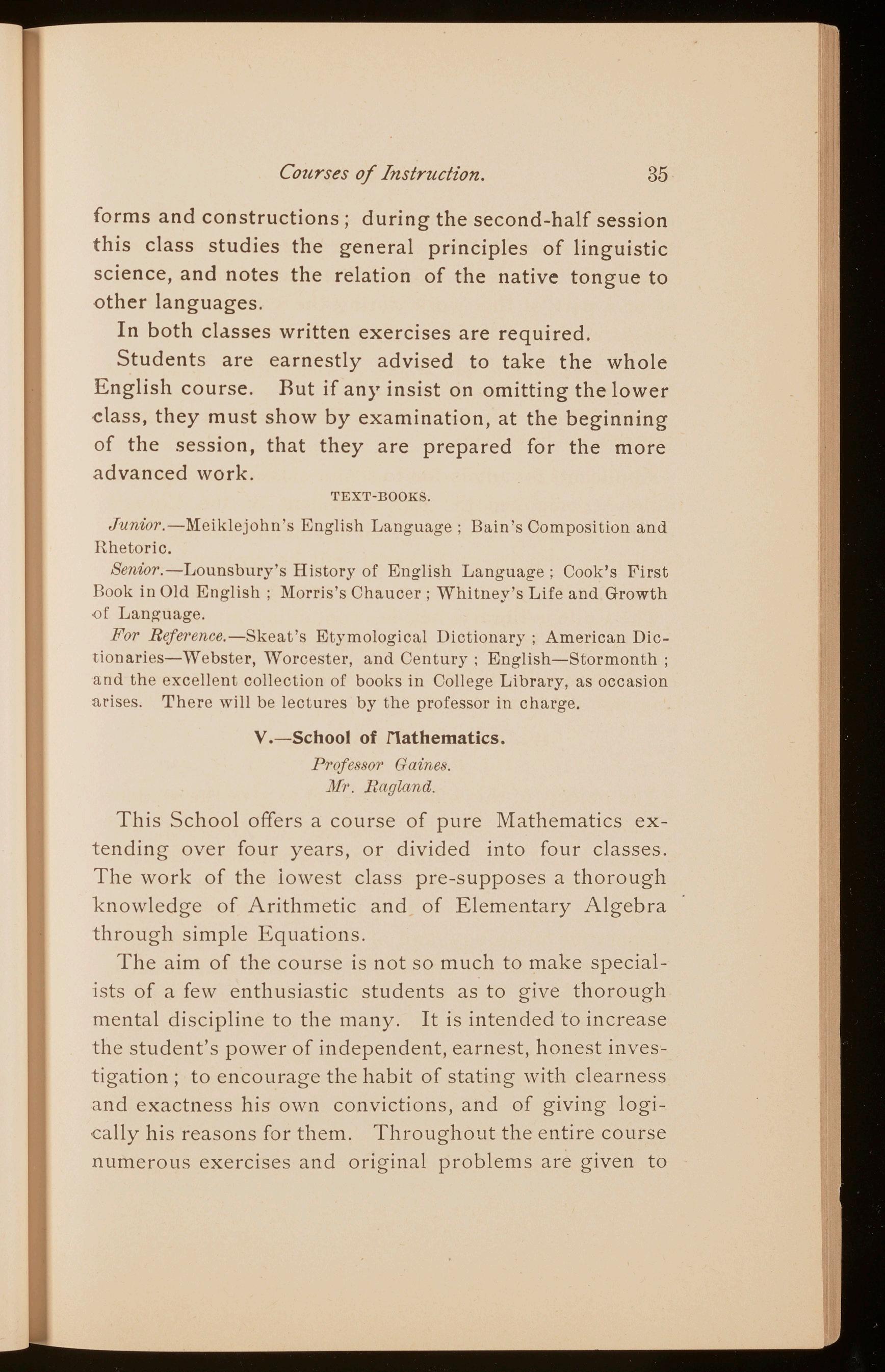
Courses of Instruction. 35 forms and constructions; during the second-half session this class studies the general principles of linguistic science, and notes the relation of the native tongue to other languages.
In both classes written exercises are required.
Students are earnestly advised to take the whole English course. Rut if any insist on omitting the lower elass, they must show by examination, at the beginning of the session, that they are prepared for the more a dvanced work .
TEXT-BOOKS.
Junior.-Meikle_john's English Language; Bain's Composition and Rhetoric.
Senior.-Lounsbury's History of English Language; Cook's First Book in Old English ; Morris's Chaucer; Whitney's Life and Growth of Language.
For Refe1·ence.-Skeat's Etymological Dictionary ; American Dictiona ri es-W ebster , Worcester, and Century; English-Stormonth ; and the excellent collection of books in College Library , as occasion arises. Th ere will be lectures by the professor in charge. V.-School of nathematics.
Professor Gaines. J,Ir. Ragland.
This School offers a course of pure Mathematics extending over four years, or divided into four classes. The work of the iowest class pre-supposes a thorough knowledge of Arithmetic and of Elementary Algebra through simple Equations.
The aim of the course is not so much to make specialists of a few enthusiastic students as to give thorough mental discipline to the many. It is intended to increase the student's power of independent, earnest, honest investigation; to encourage the habit of stating with clearness and exactness his own convictions, and of giving logica lly his reasons for them. Throughout the entire course numerous exercises and original problems are given to

36 Riclmzond College.
stimulate the student's confidence in his own reasonmg, and to cultivate his power of invention.
But while mental development is the chief aim, still it is believed that the student who masters the course given below will have realized something of the power and elegance of the science, and the magnitude of the field that lies before him, and if he should wish to pursue the subject further, will have acquired sufficient knowledge of Mathematics and mathematical methods to be able to continue his studies independently. It will be seen that in the work of the first three years are included nearly all the subjects found in the usual college course.
Sub-Junio1'. -A1 gcbra through Quadratic Equations and Plan e Geometry. T ext-Books: Hall itnd Knight's Elementary Algebra; Chauvenet's Geometry.
Junioi·.-Algebra ,, beginning with Quadratic Equations; Solid Geometry; Plane Trigonometry. Text-Books: C. Smith's Algebra ; Ch,tuvenet's Geometry; ·wentworth's Trigonometry. lnte1·mediate.-Conic Sections, including the methods of trilinear and tangential co-ordi1rntes, and Theory of Equations, including Determinants. Te.--ct-Books:C. Smith's Conic Sections; Lectures on Theory of Equations; for reference, Burnside and Pantom.
Senior.-Differential and Integrnl Calculus, with numerous applications to the theory of maxima and minima, the theory of curves, rectification of curves, determination of areas and volumes problems in mechanics, etc. Calculus o( Varia,tions and introductory lessons in Modern Higher Algebra and in Quarternions. As par,Lllel work, the students are required to read a short history of Mathematics, in order that they may know something of the development, of the science and of the mathematicians who have principally contributed. to this development. Text-Books: Todhunter's Differential Calculus; Williamson's Integral Calculus; Salmon's Modern High Algebra; the course being supplemented by notes.
The subject of L,tnd Surveying is taught in an additional class, open to students who have finished the junior class. Much of the time devoted to this class is spent in the field, thus giving the student familiarity with the instruments used and considerable practice in doing the field work. Te.vt-Book: Gillespie's Land Surveying.
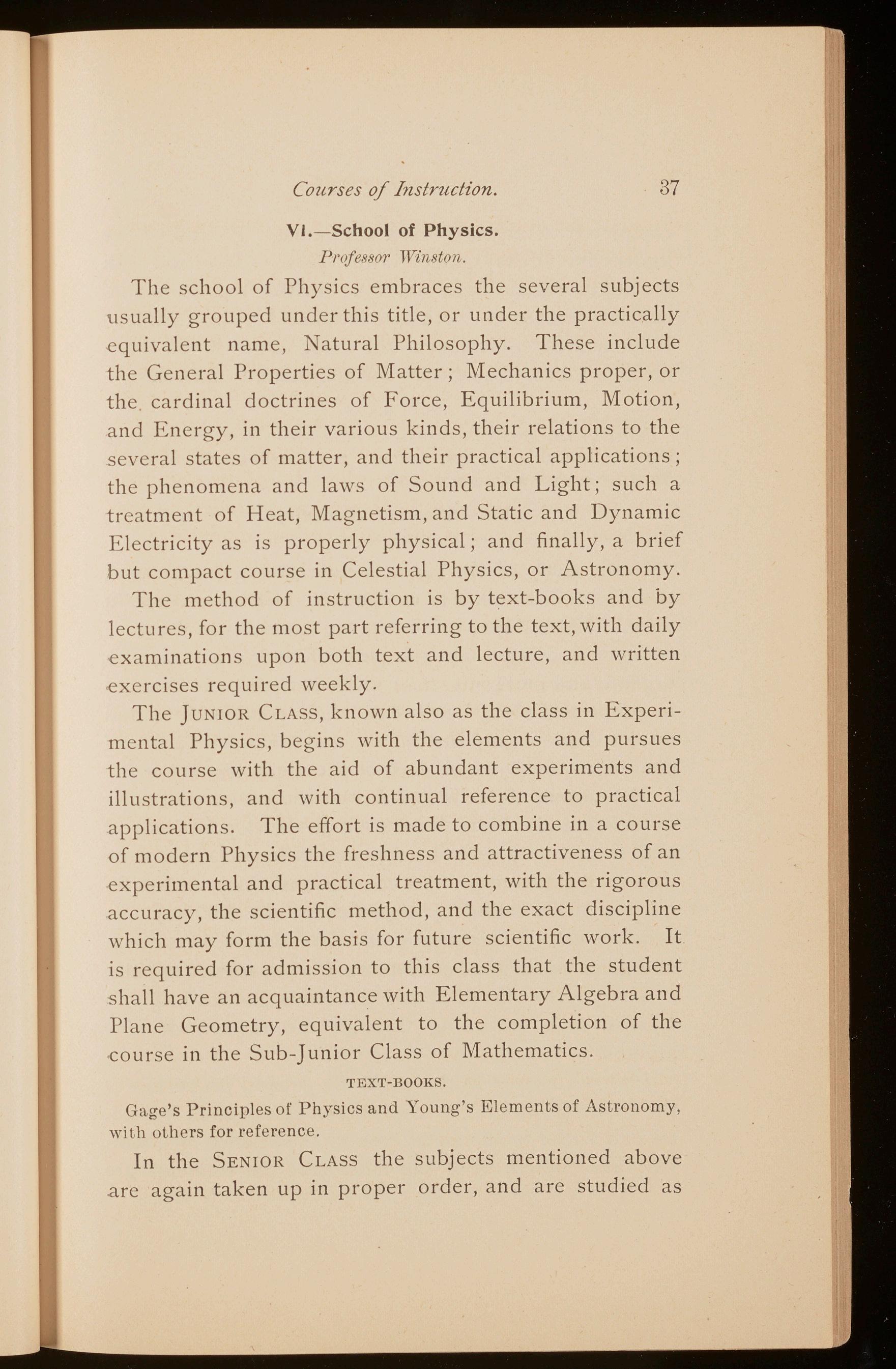
of Instruction.
VI .-School of Physics. 1'rofess01· lVinston. 37
The school of Physics embraces the several subjects usually grouped under this title, or under the practically -equivalent name, Natural Philosophy. These include the General Properties of Matter; Mechanics proper, or the cardinal doctrines of Force, Equilibrium, Motion, and Energy, in their various kinds, their relations to the several states of matter, and their practical applications; the phenomena and laws of Sound and Light; such a treatment of Heat, Magnetism, and Static and Dynamic Electricity as is properly physical; and finally, a brief but compact course in Celestial Physics, or Astronomy.
The method of instruction is by text-books and by lectures, for the most part referring to the text, with daily examinations upon both text and lecture, and written ,exercises required weekly.
The JUNIOR CLASS, known also as the class in Experimental Physics, begins with the elements and pursues the course with the aid of abundant experiments and illustrations, and with continual reference to practical applications. The effort is made to combine in a course of modern Physics the freshness and attractiveness of an experimental and practical treatment, with the rigorous accuracy, the scientific method, and the exact discipline which may form the basis for future scientific work. It is required for admission to this class that the student shall have an acquaintance with Elementary Algebra and Plane Geometry, equivalent to the completion of the course in the Sub-Junior Class of Mathematics.
TEXT-BOOKS.
Gage's Principles or Physics and Young's Elements of Astronomy, with others for reference.
In the SENIOR CLASS the subjects mentioned above are again taken up in proper order, and are studied as
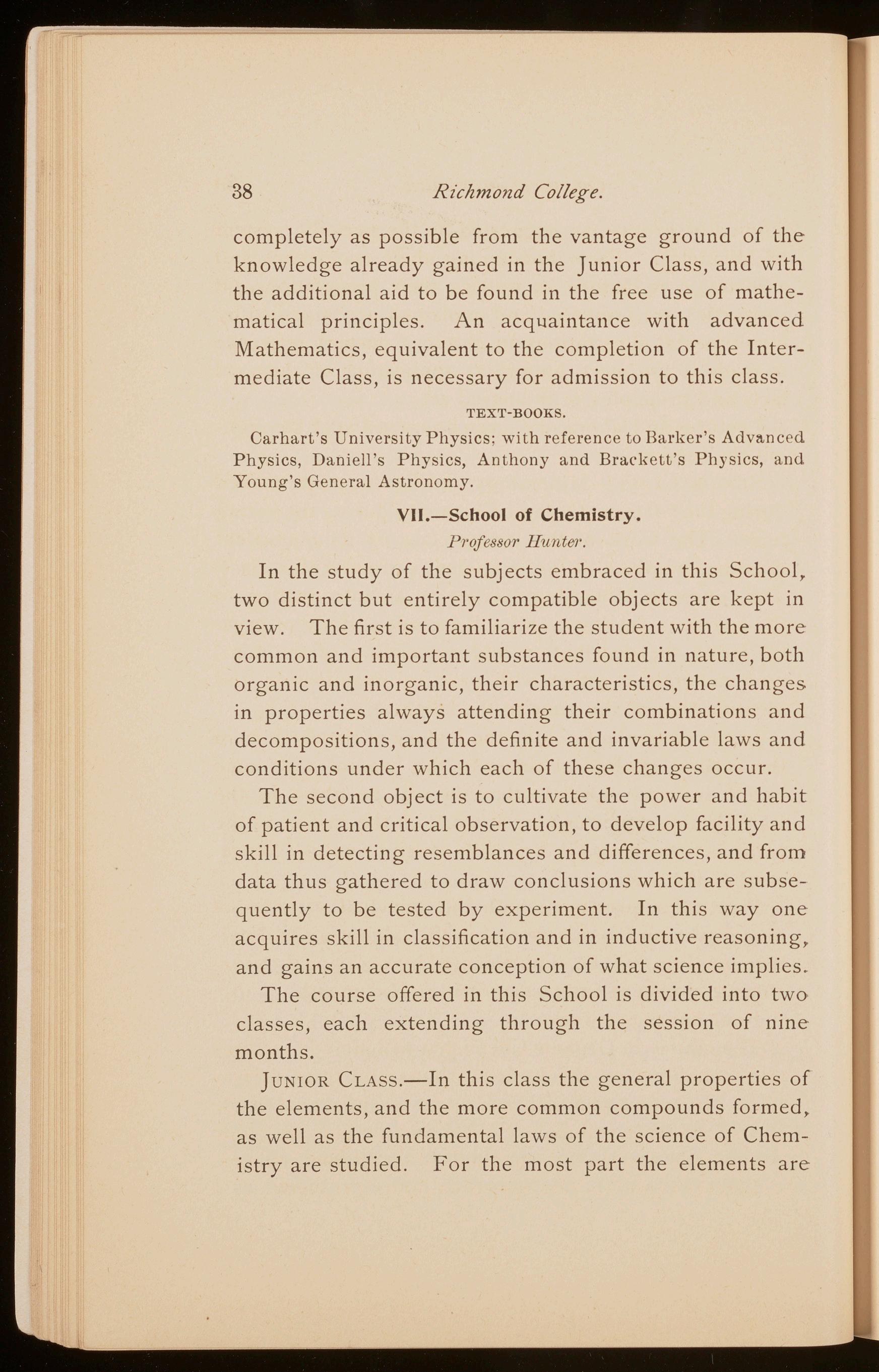
38 Richmond College.
completely as possible from the vantage ground of the knowledge already gained in the Junior Class, and with the additional aid to be found in the free use of mathematical principles. An acqtJaintance with advanced Mathematics, equivalent to the completion of the Intermediate Class, is necessary for admission to this class.
TEXT-BOOKS.
Car hart's University Physics: with reference to lfarker's Adv11,nced Physics, Daniell's Physics, Anthony and BraekcU's Physics, and Young's General Astronomy.
Professor Huntei·.
In the study of the subjects embraced in this School, two distinct but entirely compatible objects are kept in view. The first is to familiarize the student with the more common and important substances found in nature, both organic and inorganic, their characteristics, the changes in properties always attending their combinations and decompositions, and the definite and invariable laws and conditions under which each of these changes occur.
The second object is to cultivate the power and habit of patient and critical observation, to develop facility and skill in detecting resemblances and differences, and from data thus gathered to draw conclusions which are subsequently to be tested by experiment. In this way one acquires skill in classification and in inductive reasoning, and gains an accurate conception of what science implies_
The course offered in this School is divided into two classes, each extending through the session of nine months.
JUNIOR CLASs.-In this class the general properties of the elements, and the more common compounds formed, as well as the fundamental laws of the science of Chemistry are studied. For the most part the elements are
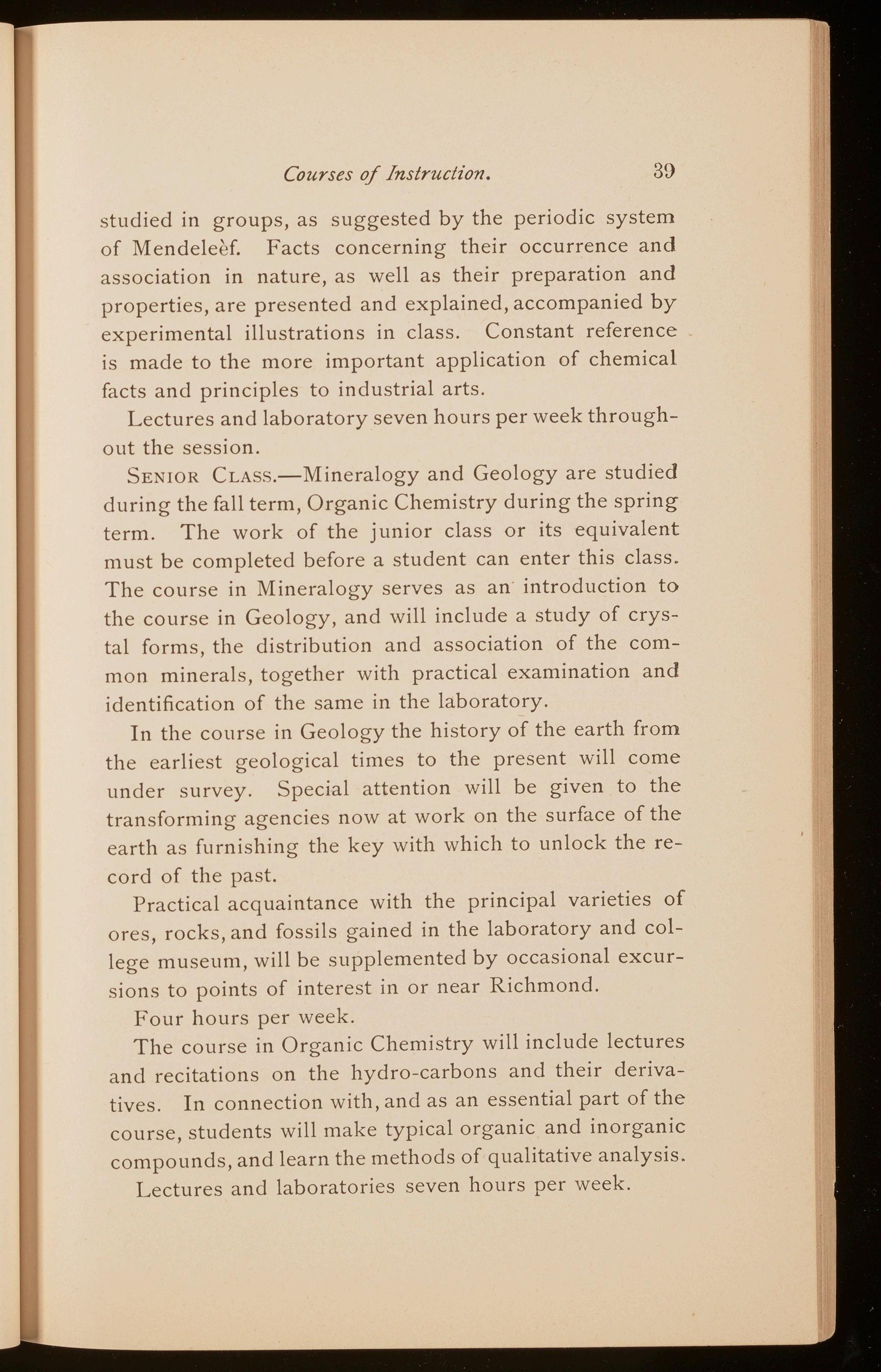
Courses of Instruction. 39
studied in groups, as suggested by the periodic system of Mendeleef. Facts concerning their occurrence and association in nature, as well as their preparation and properties, are presented and explained, accompanied by experimental illustrations in class. Constant reference is made to the more important application of chemical facts and principles to industrial arts.
Lectures and laboratory seven hours per week throughout the session.
SENIOR CLASs.-Mineralogy and Geology are studied during the fall term, Organic Chemistry during the spring term. The work of the junior class or its equivalent must be completed before a student can enter this class. The course in Mineralogy serves as an introduction to the course in Geology, and will include a study of crystal forms, the distribution and association of the common minerals, together with practical examination and identification of the same in the laboratory.
In the course in Geology the history of the earth from the earliest geological times to the present will come under survey. Special attention will be given to the transforming agencies now at work on the surface of the earth as furnishing the key with which to unlock the record of the past.
Practical acquaintance with the principal varieties of ores, rocks, and fossils gained in the laboratory and college museum, will be supplemented by occasional excursions to points of interest in or near Richmond.
Four hours per week.
The course in Organic Chemistry will include lectures and recitations on the hydro-carbons and their derivatives. In connection with, and as an essential part of the course, students will make typical organic and inorganic compounds, and learn the methods of qualitative analysis.
Lectures and laboratories seven hours per week.

Riclmwnd Colleg e.
TEXT· BOOKS.
Junio1·.-Remsen's Chemistry (Briefer Course); Remsen & Randall's Laboratory Manual.
Senioi·.-Tarr's Elementary Geology; DantL's Minerals and How to Study Them; Remsen's Organic Chemistry; Noyes' Qualitative Analysis. A number of standard books are provided for reference.
Vlll.-School of Philosophy.
PrrifeMoi' 'l'l unnaN.
The subjects assigned to this School are divided among three classes. The Junior Class embraces Physiology, Psychology, and Ethics. The Intermediate Class studies Logic and the History of Philosophy. The Senior Class studies Political Economy and Sociology. A mastery of the subjects studied in the Junior Class is essential to obtaining the degree of Bachelor of Arts. Study of the subjects embraced in the higher classes is very important as a part of liberal education, and, though often overlooked, is of great practical value, both as to thought and conduct.
In the JUNIOR CLASS the course of psychological development, as seen in its history, is briefly traced, and considerable attention given to the anatomy and physiology of the nervous system. The subject will be pursued as a science, and according to scientific methods. In seeking to ascertain the results of Experimental, Comparative, and Child's Psychology, careful effort is made to discriminate between what is purely conjectural, possible, or probable, and what seems to be established. Since, however, Psychology, like other sciences, brings us face to face with metaphysical problems, and the human mind cannot be restrained from such inquiries, no hesitation will be felt in discussing these problems and in making clear to the class that the Professor, at least, is no believer in psychology without a soul.
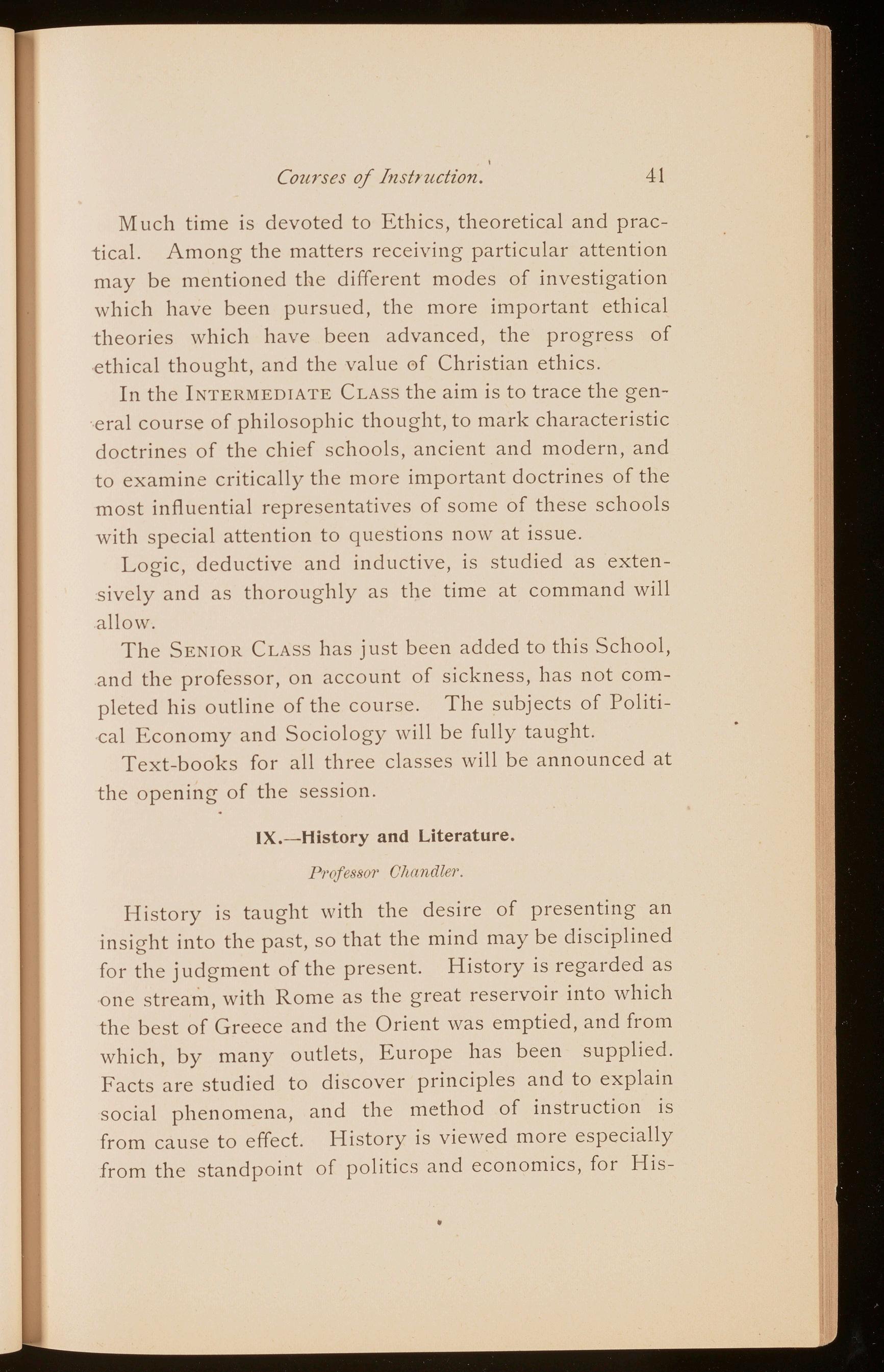
Much time is devoted to Ethics, theoretical and practical. Among the matters receiving particular attention may be mentioned the different modes of investigation which have been pursued, the more important ethical theories which have been advanced, the progress of ethical thought, and the value of Christian ethics.
In the INTERMEDIATECLASSthe aim is to trace the general course of philosophic thought, to mark characteristic doctrines of the chief schools, ancient and modern, and to examine critically the more important doctrines of the most influential representatives of some of these schools with special attention to questions now at issue.
Logic, deductive and inductive, is studied as extensively and as thoroughly as the time at command will allow.
The SENIOR CLASS has just been added to this School, and the professor, on account of sickness, has not completed his outline of the course. The subjects of Political Economy and Sociology will be fully taught.
Text-books for all three classes will be announced at the opening of the session.
l'rof essoi· Ol111ndler
History is taught with the desire of presenting an insight into the past, so that the mind may be disciplined for the judgment of the present. History is regarded as one stream, with Rome as the great reservoir into which the best of Greece and the Orient was emptied, and from which, by many outlets, Europe has been supplied. Facts are studied to discover principles and to explain social phenomena, and the method of instruction is from cause to effect. History is viewed more especially from the standpoint of politics and economics, for His-

42 Richmond College.
tory is properly the account of the evolution of social organization.
Literature is the record of man's thought, while History is the story of his thought applied and the results produced by its application; therefore the study of History and Literature go hand in hand. Frequently some literary monument, Beowulf for instance, constitutes the only reliable source from which we can judge of races in their early stages of development. Literature, therefore, will be emphasized as a necessary adjunct to History, and as a medium for interpreting the best in life, because it shows man's thoughts and feelings.
This School is divided into three classes, as follows: r. GENERAL HrsTORY.-Ethnology will be outlined, followed by a discussion of such topics as primitive man, the beginnings of civilization, and the origin of civil society. The civilization of the non-Aryan peoples will then be taken up, after which the history of Greece will be treated chiefly from the standpoint of politics, literature, and art. The main facts. of Roman history will be noticed, but especially its. wonderful system of jurisprudence, its social and economic problems and such institutions as have influenced the political and religious life of Modern Europe. The history of Europe will be considered under the following heads: (1) Origin of European States; (2) Imperialism and the Papacy; (3) Feudalism; (4-) Renaissance and the Reformation; (5) French Revolution; and (6) Nationality and Democracy as Realized in the Nineteenth Century. From time to time special subjects will be assigned to the students for investigation, and collateral reading will be required.
TEXT-BOOKS.
Keary's Dawn of Civilization; Tylor's Authropology; Morris' Aryan Race; Ragozin's Chaldea; Sayce's Assyriology; Hosmer's.

Courses of Instruction.
Hist ory of th e Jews; Rawlinson ' s Egypt ; Smith's Greece; Aristotl e' s Athenian Constitution ; Plato ' s Republic; Allen's Rome ;. Tighe ' s Roman Constitution ; Gummer e 's Germanic Origins; Ernert on ' s Introduction to the Middle Ages; Thatcher's Middle Ages; Adams ' Civilization during the Middle Ages; Fish e r's Reformation ;: Dabney ' s French Revolution; and Judson's Nineteenth Century. Som e of these books will be used as class books, while others will be for the assigned r e ading. References will also be made to numerous historians.
2. ENGLISH ANDAMERICANHISTORY.-A rapid glance will be made of the political history of England, , but more time will be consumed in tracing the growth of the English Constitution in its successive stages, . from the Magna Carta to the Reform Bills of this. century. The close connection between English and American institutions will be emphasized, In American history the period of colonization will be briefly summarized, after which the course will deal entirely with United States history. Much attention will be paid to the historical geography of our country. American politics will receive a very full treatment, and a careful analysis of our Constitution and form of government will be made. This course will be of great help to those who intend to study law.
TEXT-BOOKS
Gre e n ' s Short History of the English People ; Feilden's Constituti onal History of England ; Epochs of American History (Longm a n 's) ; Curry 's South; Porter's Constitutional History of United Stat es; Johnson's American Politics itnd Brooke ' s Party Politics Collat e rn.1 r eading in Stubbs, Hallam, Taswell-Langm ead, Froude ,. Fre e man, Bancroft, Schoul e r, Henry Adams, :McMaster, Von Holst, a nd Bryc e.
3. LITERATURE.-This course is devoted to English and American Literature. The history of literature, and selections from the most important writers will be studied simultaneously, and every effort will be made to develop the critical faculties of the student. As far as possible the com-
44
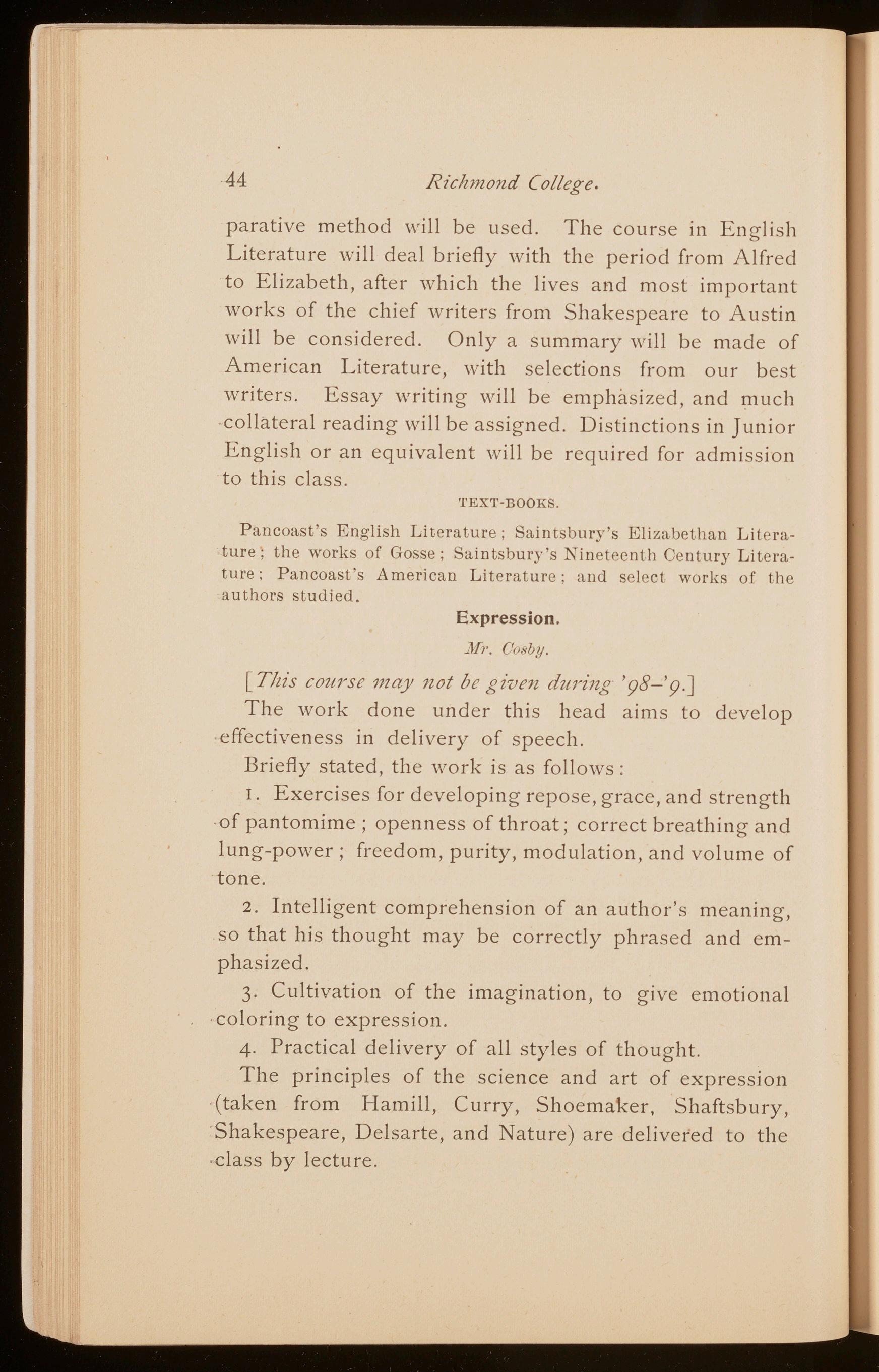
Richmond College.
parative method will be used . The course m English Literature will deal briefly with the period from Alfred to Elizabeth, after which the lives and most important works of the chief writers from Shakespeare to Austin will be considered. Only a summary will be made of American Literature, with selections from our best writers. Essay writing will be emphasized, and much collateral reading will be assigned. Distinctions in Junior English or an equivalent will be required for admission to this class.
TEXT-BOOKS.
Panc oast's English Literature; Saintsbury's Elizabethan Lit erature; the works of Gosse; Saintsbury's Xin etecnth Century Liter:1ture; Pancoast 's American Lit e ratur e; and select works of the authors studied.
Expression.
Nr. Co«b.11.
[T!tis course may not be given during '98-'9.J
The work done under this head aims to develop effectiveness in delivery of speech.
Briefly stated, the work is as follows :
I. Exercises for developing repose, grace, and strength of pantomime; openness of throat; correct breathing and lung-power; freedom, purity, modulation, and volume of tone.
2. Intelligent comprehension of an author's meaning, so that his thought may be correctly phrased and emphasized.
3. Cultivation of the imagination, to give emotional coloring to expression.
4. Practical delivery of all styles of thought. The principles of the science and art of expression (taken from Hamill, Curry, Shoemaker, Shaftsbury, Shakespeare, Delsarte, and Nature) are delivered to the -class by lecture.
Courses o.f Instruction.

45.
Special R efer ence B ooks: Curry ' s Cla ssics for Vocal Expr essiou a nd Sh ake sp ear e.
F ee in this department, $ 12 per session for students ; '1/,20 for any not regularly matriculated . English Bible.
Dr T upper.
The aim of this study is to give, in a two years' course, k n o wledge, as thorou g h as practicable, of the Scriptures as th e inspired word of God. The history, geography, a nd literature of the Bible, with necessary exegesis, serve t o throw light upon the sacred text and to discover the di vine mind and spirit in this revelation. Intelligent k n o wledge, by systematic e ffort, of the Maker and Ruler o f a ll, is e ssential to complet e education, gives unity to t h e different department s of human learning, and is due to h im "who lighteth every man that cometh into the world." Th e in struction is imparted by lectures, on which the stude nt is examined during the course of study as well as at the close of each half- s ession At the end of the session of 1897-'98 examinations were held on the whole N e w Testament. The Old Testament will be begun at th e op e ning of the s e ssion of 1898-'99. A part of the P e ntateuch and the Historical books will be treated in bi o graphical form. The course is adapted to students of a ll grades, with no reference to any particular profession in view. It is free to all matriculates of the College. The o nly text-book is the English Bible. "Coleman's Hist o ric a l Text-Book of Biblical Geography" is important for reference. The College Library furnishes valuable works for consultation.
Mi·. Owens.
Carefully-arranged courses in Physical Culture are offered free of cost to ever.y matriculate of the College.
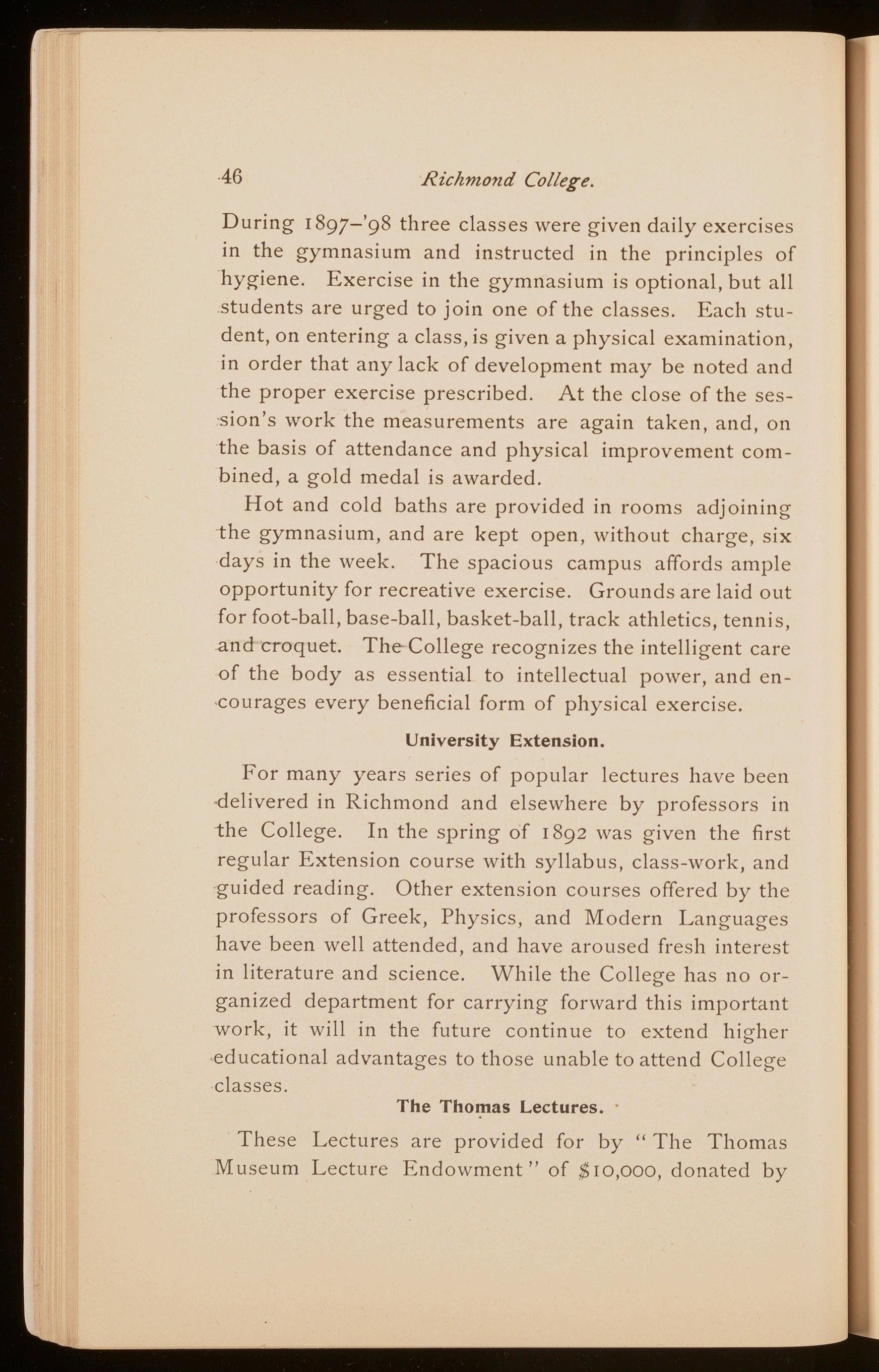
Richmond College.
During 1897-'98 three classes were given daily exercises in the gymnasium and instructed in the principles of hygiene. Exercise in the gymnasium is optional, but all students are urged to join one of the classes. Each student, on entering a class, is given a physical examination, in order that any lack of development may be noted and the proper exercise prescribed. At the close of the ses·sion's work the measurements are again taken, and, on the basis of attendance and physical improvement combined, a gold medal is awarded.
Hot and cold baths are provided in rooms adjoining the gymnasium, and are kept open, without charge, six days in the week. The spacious campus affords ample opportunity for recreative exercise. Grounds are laid out for foot-ball, base-ball, basket-ball, track athletics, tennis, and croquet. The-College recognizes the intelligent care of the body as essential to intellectual power, and en-courages every beneficial form of physical exercise.
University Extension.
For many years series of popular lectures have been -delivered in Richmond and elsewhere by professors in the College. In the spring of r 892 was given the first regular Extension course with syllabus, class-work, and guided reading. Other extension courses offered by the professors of Greek, Physics, and Modern Languages have been well attended, and have aroused fresh interest in literature and science. While the College has no organized department for carrying forward this important work, it will in the future continue to extend higher educational advantages to those unable to attend College classes.
The Thomas Lectures.
These Lectures are provided for by " The Thomas Muse um Lecture Endowment" of $10,000, donated by
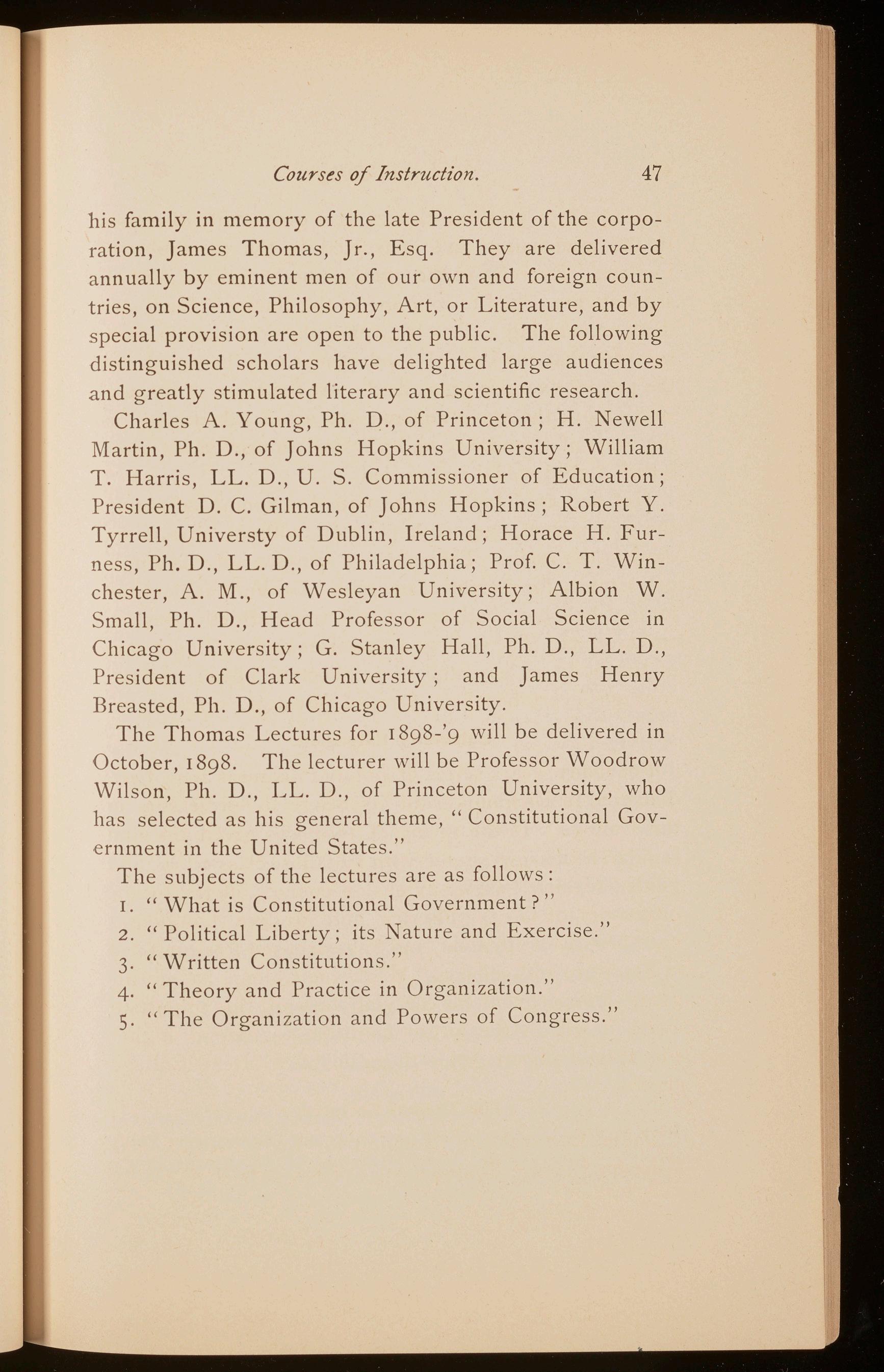
Courses of Instruction.
his family in memory of the late President of the corporation, James Thomas, Jr., Esq. They are delivered annually by eminent men of our own and foreign countries, on Science, Philosophy, Art, or Literature, and by special provision are open to the public. The following distinguished scholars have delighted large audiences and greatly stimulated literary and scientific research.
Charles A. Young, Ph. D., of Princeton; H. Newell Martin, Ph. D., of Johns Hopkins University; William T. Harris, LL. D., U. S. Commissioner of Education; President D. C. Gilman, of Johns Hopkins; Robert Y. Tyrrell, Universty of Dublin, Ireland; Horace H. Furness, Ph.D., LL. D., of Philadelphia; Prof. C. T. Winchester, A. M., of Wesleyan University; Albion W. Small, Ph. D., Head Professor of Social Science in Chicago University; G. Stanley Hall, Ph. D., LL. D., President of Clark University; and James Henry Breasted, Ph. D., of Chicago University.
The Thomas Lectures for I 898-'9 will be delivered in October, I 898. The lecturer will be Professor \iV oodrow Wilson, Ph. D., LL. D., of Princeton University, who has selected as his general theme, "Constitutional Gove rnment in the United States."
The subjects of the lectures are as follows:
I. "What is Constitutional Government?"
2. "Political Liberty; its Nature and Exercise."
3. "Written Constitutions."
4. "Theory and Practice in Organization."
5. "The Organization and Powers of Congress."

Pr,ife-'so,· Gr<'[;ory. Pr 1ifeNsorJl inor. ProJe8;or Long.
This School, established in I 870, and continued with slight interruption till 1882, was in 1890 firmly re-established. The location is eminently suited for combining practical with theoretical instruction, by reason of easy access to the numerous courts-Federal, State, Municipal-held in the city of Richmond, and the large and well-selected libraries-law and miscellaneous-of the State and the Coll ege .
The design of the School is to provide for the student a complete course in the general principles of the AngloAmerican Law and their applications. To this end are taught the following subjects, to-wit: The Common Law, Statute Law, Criminal Law, Commercial Law, Equity Jurisprudence, Constitutional Law, International Law . There are two Classes in this School. The following schedule is an exhibit of the subjects and by whom taught in each class, and the text-books used for the basis of instruction.
JUNIOR CLA SS
The Law of Persons, which includes the (subjects of Ag~ncy and Corporation.
The Law of Persona! Property, embracing Contracts, Insurance, Mercantile Law, and Adminis t ration.
Consti'tuti'ona! and International Law.
TEXT-BOOKS.
Vols. I. and III. Minor's Institutes ; Burk e's Property Rights of Married Women in Virginia; Elliott on Private Corporations; Davis' Outline of International Law; Miller on the Constitution of th e United States .-P1·0J Long.
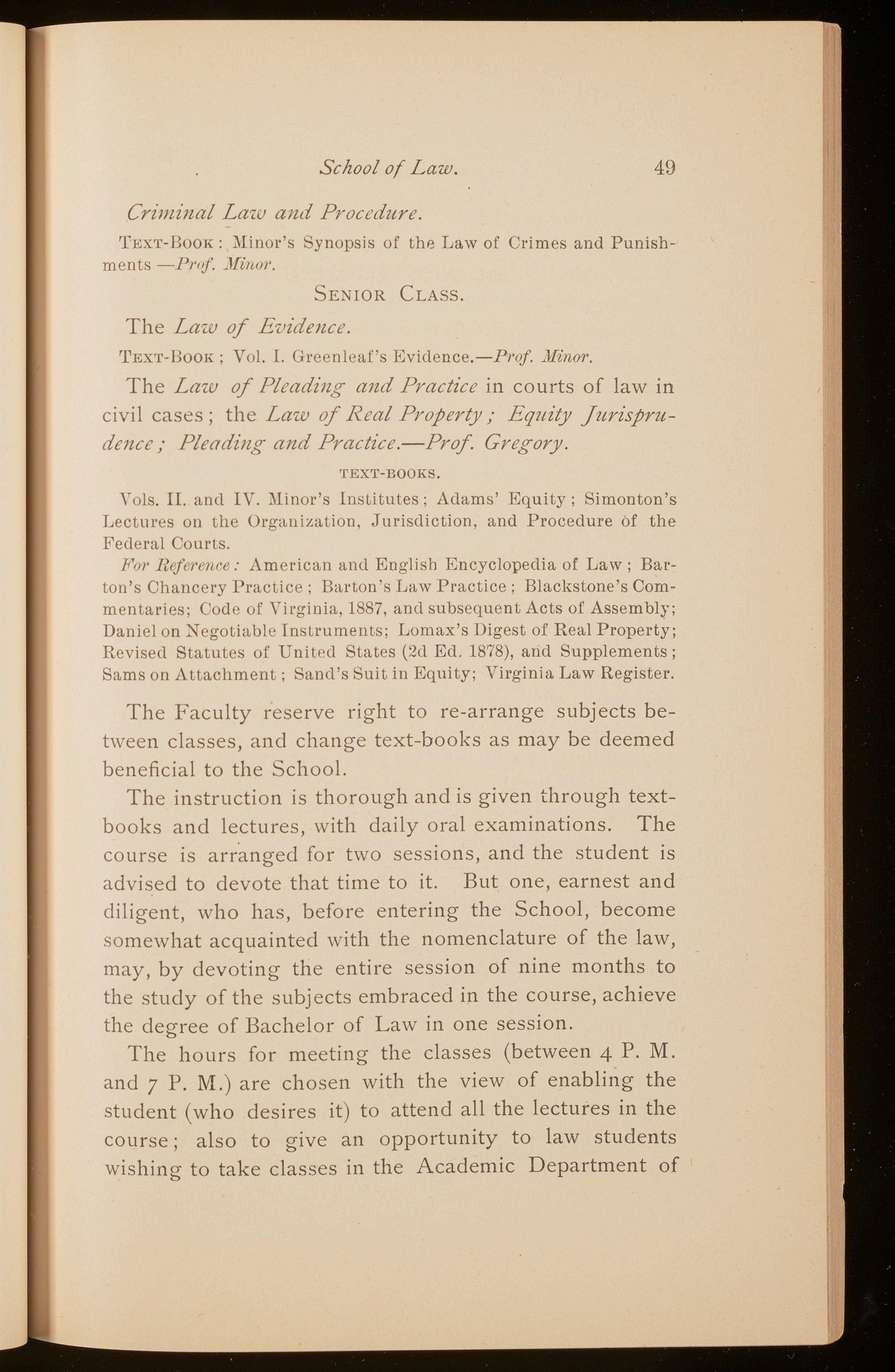
School of Law. 49
Criminal Law and Procedure.
'l'EXT-BOOK: Minor's Synopsis of the Law of Crimes and Punishments -Prof. Jii1w1·.
SENIOR CLASS.
The Law of Evz'dence.
'rEx•r-Boor;:; Vol. I. Greenleaf's Evidence.-Prof. ,1lino1·.
The Law of Pleading and Practice in courts of law in civil cases ; the Law of Rea! Property; Equity Jurisprudence; Pleading and Practz'ce.-Prof. Gregory.
'!'EXT-BOOKS.
Yols II. and IV. ~linor's Institutes; Adams' Equity; Simon ton's Lectures on the Org,tn iilation, Jurisdiction, and Procedure of the Federal Courts.
Ji'or Rejft'l'll!'e: American and English Encyclopedia of Law; Bat·ton's Chancery Practice; Barton's L,iw Practice; Blackstone's Commentaries; Code of Yirginia, 1887, and subsequent Acts of Assembly; Daniel on :Negotiable Instruments; Lomax's Digest of Real Property; Revised Statutes of United States (2d Ed. 1878), and Supplements; Sams on Attachment; Sand's Suit in Equity; Virginia Law Register.
The Faculty reserve right to re-arrange subjects between classes, and change text-books as may be deemed beneficial to the School.
The instruction is thorough and is given through textbooks and lectures, with daily oral examinations. The course is arranged for two sessions, and the student is advised to devote that time to it. But one, earnest and diligent, who has, before entering the School, become somewhat acquainted with the nomenclature of the law, may, by devoting the entire session of nine months to the study of the subjects embraced in the course, achieve the degree of Bachelor of Law in one session.
The hours for meeting the classes (between 4 P. M. and 7 P. M.) are chosen with the view of enabling the student (who desires it) to attend all the lectures in the course; also to give an opportunity to law students wishing to take classes in the Academic Department of
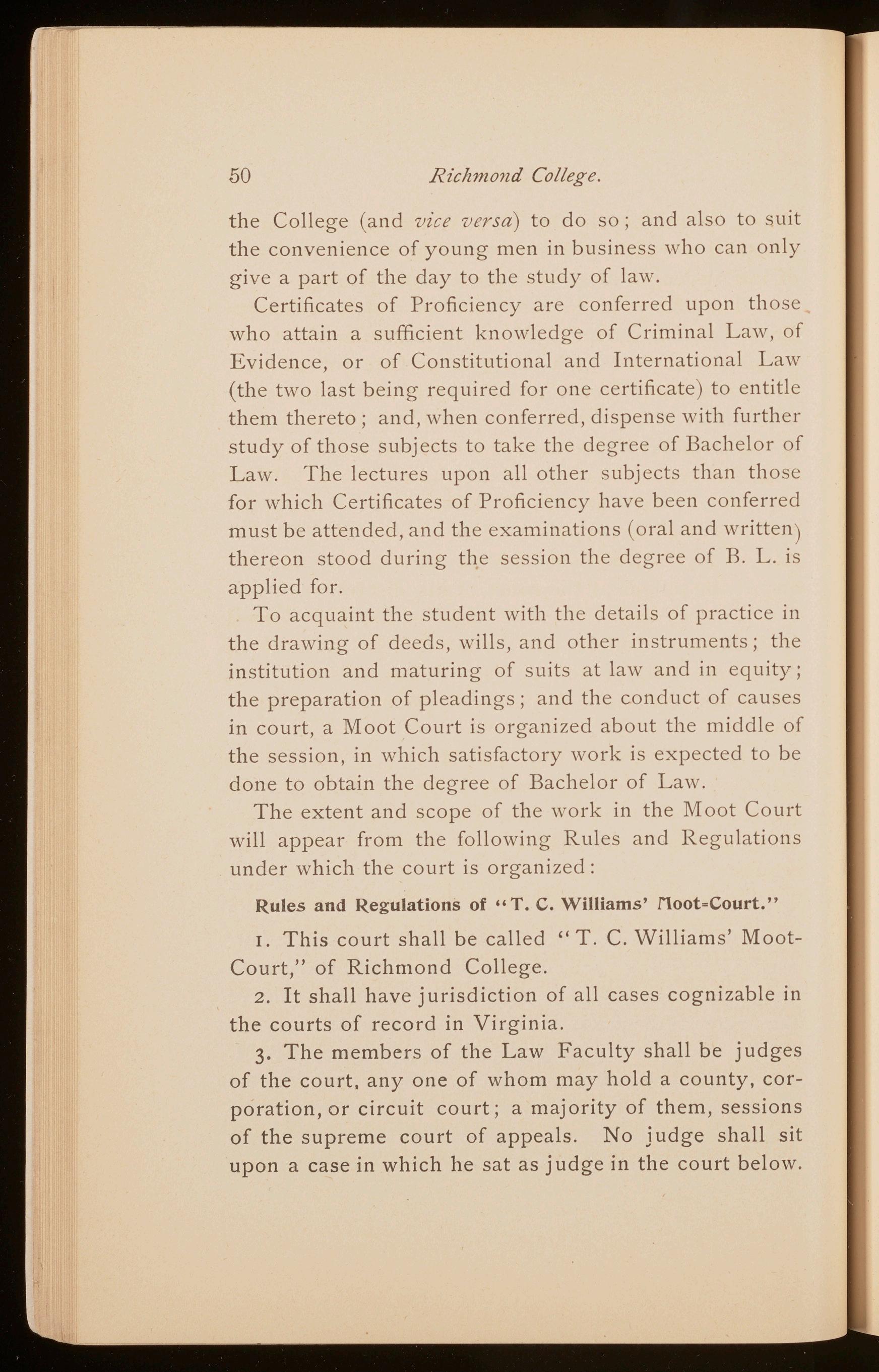
50 Richmond College. the College (and vz'ce versa) to do so; and also to suit the convenience of young men in business who can only give a part of the day to the study of law.
Certificates of Proficiency are conferred upon those who attain a sufficient knowledge of Criminal Law, of Evidence, or of Constitutional and International Law (the two last being required for one certificate) to entitle them thereto; and, when conferred, dispense with further study of those subjects to take the degree of Bachelor of Law. The lectures upon all other subjects than those for which Certificates of Proficiency have been conferred must be attended, and the examinations (oral and written) thereon stood during the session the degree of B. L. is applied for.
To acquaint the student with the details of practice in the drawing of deeds, wills, and other instruments; the institution and maturing of suits at law and in equity; the preparation of pleadings; and the conduct of causes in court, a Moot Court is organized about the middle of the session, in which satisfactory work is expected to be done to obtain the degree of Bachelor of Law.
The extent and scope of the work in the Moot Court will appear from the following Rules and Regulations under which the court is organized:
Rules and Regulations of "T. C. Williams' floot~Court."
1. This court shall be called "T. C. Williams' MootCourt," of Richmond College.
2. It shall have jurisdiction of all cases cognizable in the courts of record in Virginia.
3. The members of the Law Faculty shall be judges of the court, any one of whom may hold a county, corporation, or circuit court; a majority of them, sessions of the supreme court of appeals. No judge shall sit upon a case in which he sat as judge in the court below.

When on the bench, the T. C. Williams professor of law shall preside; in his absence, the senior professor of law, in length of service, present and sitting.
4. The officers of the court shall be a clerk, a deputyclerk, a sheriff, a deputy-sheriff, three commissioners of accounts-one for each court of probate represented, and five com missioners in chancery for the corporation and circuit courts; all to be elected by a majority vote of the members of the court present and voting.
5. The regular sessions of the court shall be held on alternate Fridays, at 5 P. M., commencing Friday, the 10th day of February, 1899. Special, with like jurisdiction as regular, sessions may be called at any time by one of the judges of the court, at his discretion.
6. Process shall run in the name of the Law School of Richmond College, and be attested by the clerk of the court. Service may be upon defendant's attorney, but return shall state it was made upon the defendant himself.
7. Every Thursday, from 4 P. M. to 5 P. M., shall be rule-day. All pleadings must be filed in duplicate, the original to remain in the files of the court, the duplicate to be handed to the attorney of adverse party, on his request.
8. Judgments, except those in the clerk's office, to be put in form, orders and decrees drawn by counsel, and, when directed to be entered, filed with the clerk.
9. The proceedings of this court, except so far as modified by its rules, will conform to those of the several courts it may represent, and to the statutes of Virginia in relation thereto.
10. In counting time for this court, in respect to service of notice and confirmation of accounts, one day shall be considered a week, and a week a month.
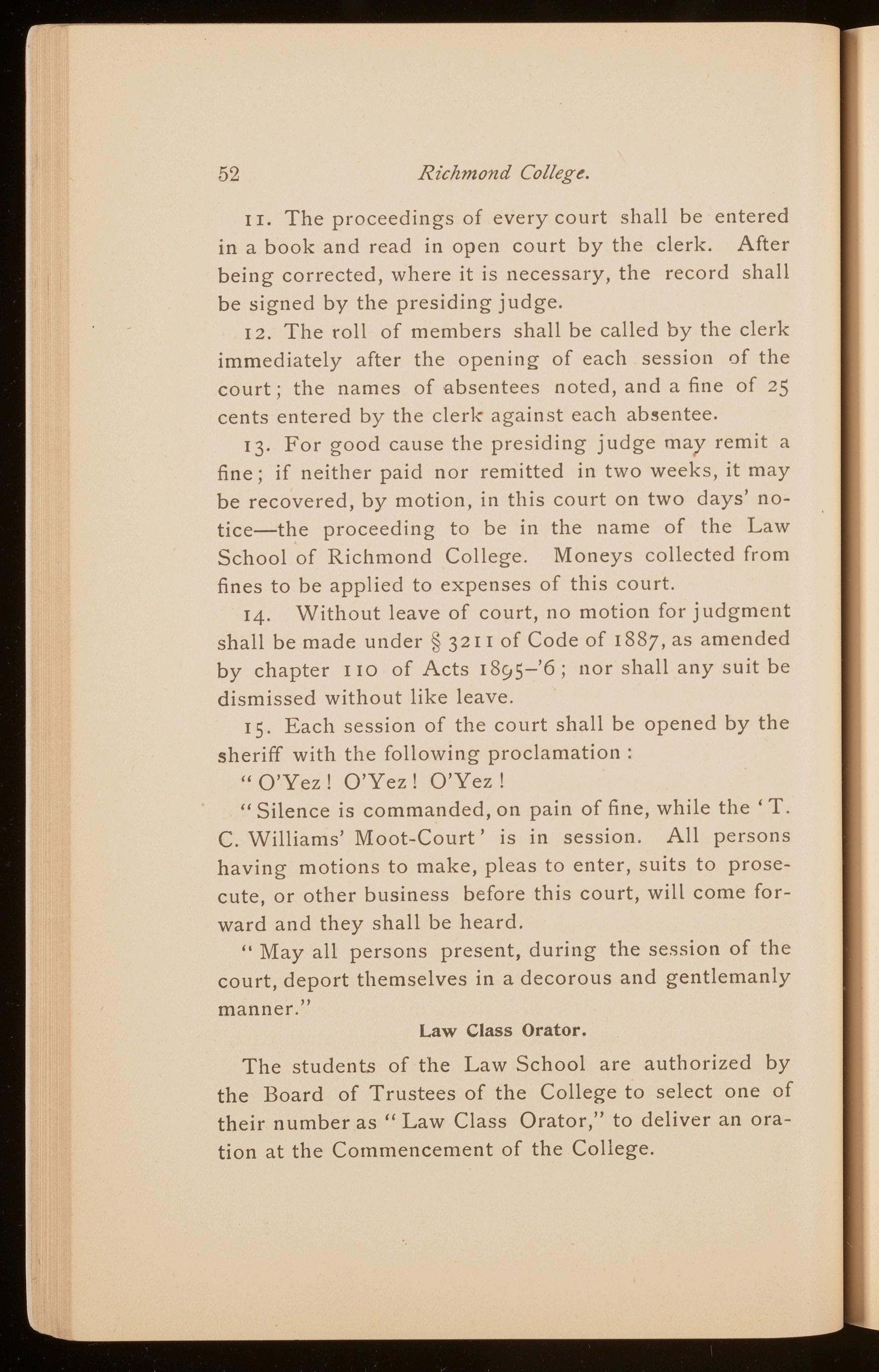
52 Richmond College.
l r. The proceedings of every court shall be entered in a book and read in open court by the cleric After being corrected, where it is necessary, the record shall be signed by the presiding judge.
12. The roll of members shall be called by the clerk immediately after the opening of each session of the court; the names of absentees noted, and a fine of 25 cents entered by the clerk against each ab~entee.
13. For good cause the presiding judge may remit a fine; if neither paid nor remitted in two weeks, it may be recovered, by motion, in this court on two days' notice-the proceeding to be in the name of the Law School of Richmond College. Moneys collected from fines to be applied to expenses of this court.
14. Without leave of court, no motion for judgment shall be made under § 3211 of Code of 1887, as amended by chapter 1 IO of Acts 1895-'6; nor shall any suit be dismissed without like leave.
15. Each session of the court shall be opened by the sheriff with the following proclamation :
"O'Yez ! O'Yez ! O'Yez !
"Silence is commanded, on pain of fine, while the 'T. C. Williams' Moot-Court' is in session. All persons having motions to make, pleas to enter, suits to prosecute, or other business before this court, will come forward and they shall be heard.
''Mayall persons present, during the session of the court, deport themselves in a decorous and gentlemanly manner."
Law Class Orator.
The students of the Law School are authorized by the Board of Trustees of the College to select one of their number as" Law Class Orator," to deliver an oration at the Commencement of the College.

MaLri c uh\Li o n
TuiLi o n in Juni o r Ultiss .....
TuiLi o n in Se ni or C lass . .... .
Tui Lio n in b o lh chtsses, wh e n Lak e n togcL h e r
The matriculation fee is payable at entrance. Tuition fees are payable half in September and half in February. Most students enter for the Junior Class. Their fees fo r the e11tire session, therefore, amount to $ 61, of which $2. 50 is refundable in June. Th e m a triculation fee admits a s tudent to all College privileges, such as use of library, g ymnasium, bath, etc If law students desire to reside o n the C o llege grounds, they may engage rooms and tab le-board on equ a l terms with a cademic students. Ra t e s are fully stated further on in this catalogue under t he head of " Expense s ."
The cost of all text-b o oks needed for the entire Law co urse is about $ 75.
The Edward Thompson Company, law publishers, h a ving offered as a prize for the best essay on some legal s ubject, "The American and English Encyclopa!dia of L a w," thirty volumes, the followin g rules are published fo r the guid a nce of competitors : Subject of Essay for I 898-" THE DOCTRINE OF U LT RA VIRES "
Each essay must contain not less than 3,000 nor more than 4,000 words of type-written matter; be enclosed i n a sealed envelope directed to the President of Richmond College, and mailed to him in time to be received on or before September IO, 1898.
There must accompany each essay, under same inclosure, in a separate unmarked sealed envelope, the
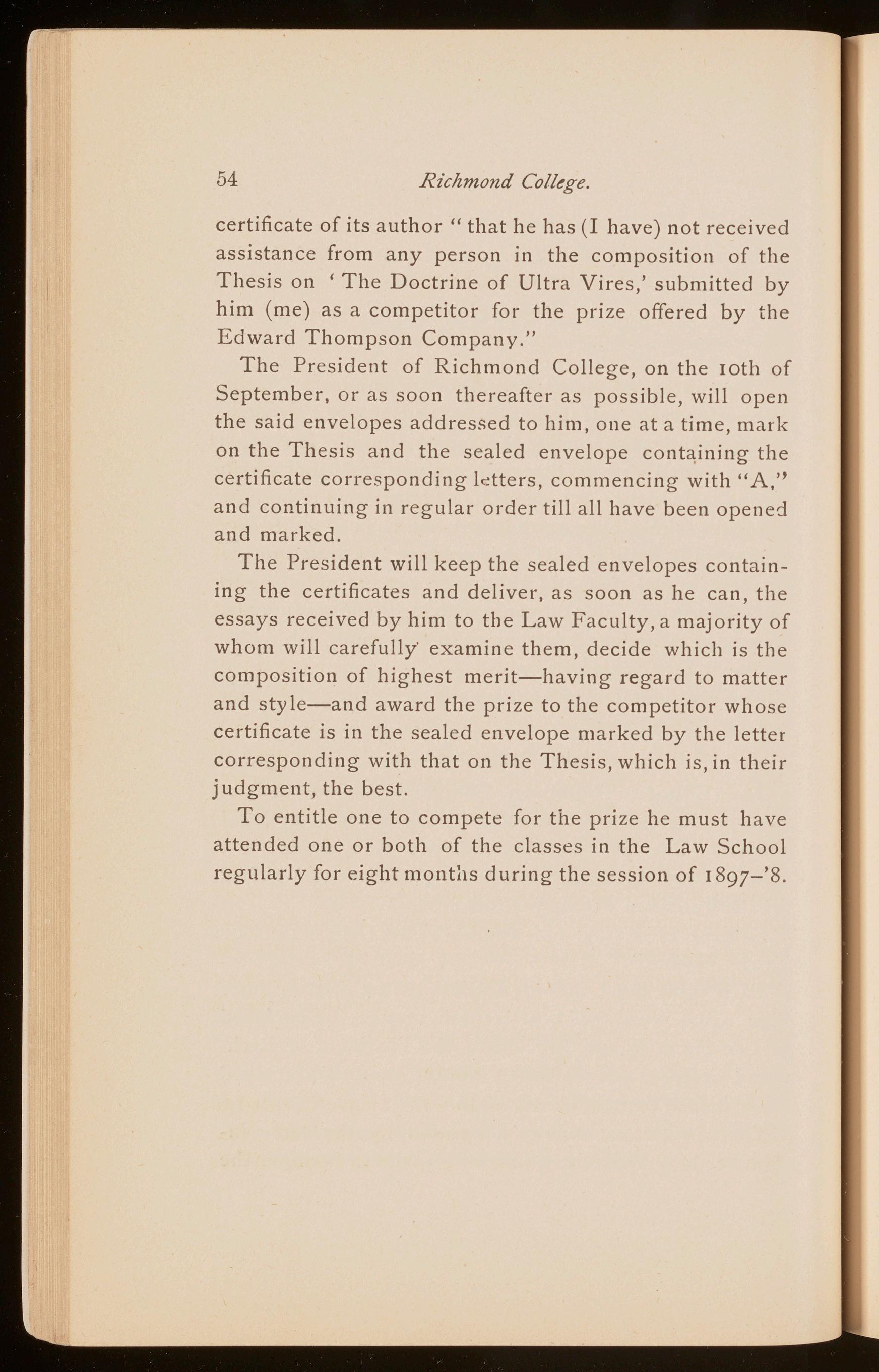
54 Richmond College.
certificate of its author" that he has (I have) not received assistance from any person in the composition of the Thesis on ' The Doctrine of Ultra Vires,' submitted by him (me) as a competitor for the prize offered by the Edward Thompson Company."
The President of Richmond College, on the 10th of September, or as soon thereafter as possible, will open the said envelopes addressed to him, one at a time, mark on the Thesis and the sealed envelope containing the certificate corresponding letters, commencing with "A,'' and continuing in regular order till all have been opened and marked.
The President will keep the sealed envelopes containing the certificates and deliver, as soon as he can, the essays received by him to the Law Faculty, a majority of whom will carefully· examine them, decide which is the composition of highest merit-having regard to matter and sty le-and award the prize to the competitor whose certificate is in the sealed envelope marked by the letter corresponding with that on the Thesis, which is, in their judgment, the best.
To entitle one to compete for the prize he must have attended one or both of the classes in the Law School regularly for eight months during the session of I 897-'8.
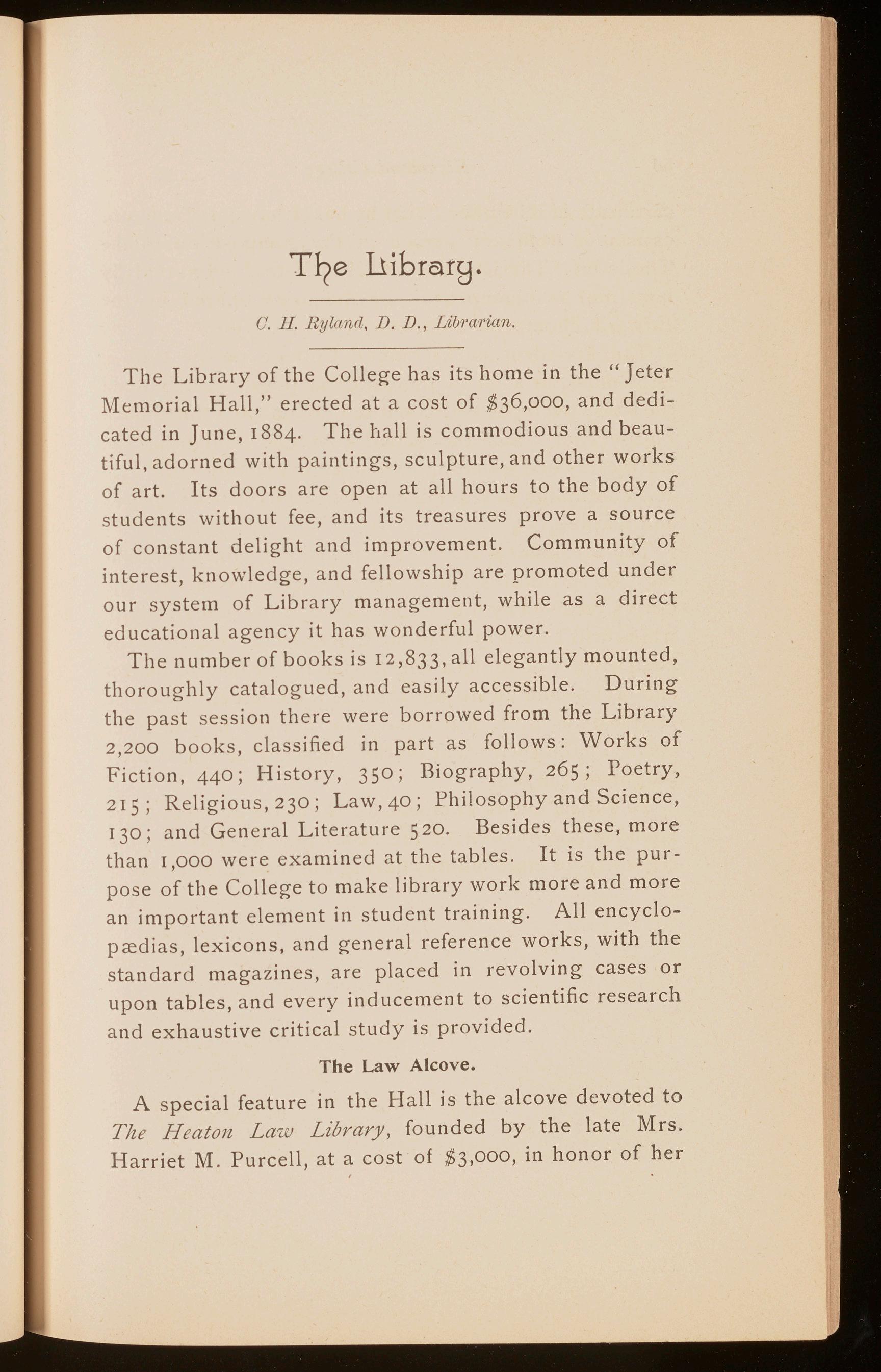
C. II. Ryland, D. D., Lib1'Ctrian.
The Library of the College has its home in the" Jeter Memorial Hall," erected at a cost of $36,000, and dedicated in June, l 884. The hall is commodious and beautiful, adorned with paintings, sculpture, and other works of art. Its doors are open at all hours to the body of students without fee, and its treasures prove a source of constant delight and improvement. Community of interest, knowledge, and fellowship are promoted under our system of Library management, while as a direct educational agency it has wonderful power.
The number of books is 12,833, all elegantly mounted, thoroughly catalogued, and easily accessible. During the past session there were borrowed from the Library 2,200 books, classified in part as follows: Works of Fiction, 440; History, 350; Biography, 265; Poetry, 215; Religious, 230; Law, 40; Philosophy and Science, 130; and General Literature 520. Besides these, more than 1 ,ooo were examined at the tables. It is the purpose of the College to make library work more and more an important element in student training. All encyclopa:dias, lexicons, and general reference works, with the standard magazines, are placed in revolving cases or upon tables, and every inducement to scientific research and exhaustive critical study is provided.
The Law Alcove.
A special feature in the Hall is the alcove devoted to T/ze Heaton Law Lz"brary, founded by the late Mrs. Harriet M. Purcell, at a cost of $3,000, in honor of her
56

Richmond College.
deceased brother, Hon. Henry Heaton, of Loudoun county. On this foundation of seven hundred volumes the College is building by yearly accessions of valuable Reports from the General and State Governments.
R.eading~R.oom.
The Reading-Room is supplied with the best dailies, weeklies, and monthlies. All leading magazines and newspapers, comprising the best literary, scientific, educational, and religious publications of America, are subscribed for regularly. To these are added all the college magazines anJ a number of French and German papers. Excellent provision is made for gathering and compiling missionary intelligence, while Bible study is encouraged by placing within the reach of all the most modern helps and the best commentaries.
Sunday Reading.
A special Reading-Room for the Y. M. C. A. has been fitted up. Here is the Missionary Library-the religious periodicals and appliances for the thorough study of the Sunday-school lesson, On Sunday afternoon this special reading-room may be the gathering place of all students who can be induced to read, for pleasure or profit, the current religious literature of the country. Museum.
The Trustees have dedicated a spacious and beautiful room 10ox45 feet, high pitched, well lighted, and finished in fresco and hard wood, to the memory of the late James Thomas, of Richmond. Preparation is being made to mount the growing Muse um and Art Collection of the College in this apartment. Already valuable articles from our own and foreign lands, consisting of curios, paintings, statuary, with collections in the lines of



The Library. 57
Geology, Mineralogy, Ethnology, are displayed, awaiting final arrangement.
Gifts are solicited from friends at home and abroad, that visitors may be attracted and students stimulated. The Librarian is curator, and all contributions should be forwarded to him.
Portraits.
The gallery of paintings is being gradually enriched by portraits of the distinguished friends of ~he College.
The most notable gift of the year was the elegant life-size portrait of Mr. James Thomas, Jr., to whose memory the Museum anJ Art Hall is dedicated. This portrait is by the famous De Sanctis, Rome, I 876, and is the gift of Mrs. Mary W. Thomas, deceased. Around this work of art are grouped many fine portraits of trustees, professors, and benefactors of the College .
The Trustees solicit further gifts. Perhaps nothing about the College so interests the visitor as a collection of portraits, statuary, curios, and relics. It is within the power of alumni and other friends greatly to enrich the present display, and their efforts will be appreciated.

Literary Societies.
Two literary societies, known as the Mu Sr GMA R110 and PHILOLOGIAN, are maintained by the students, and are recognized as agencies of great value in scholastic training They are provided with elegant halls where they hold weekly meetings for declamation, debate, andother literary exercises, Besides the joint celebration at Commencement, each society arranges for at least one public debate during the session. The two societies unite in publishing the M ess enger, a monthly magazine of about seventy-five pages. A generous rivalry is maintained between the two organizations by the joint offer of an orator's medal and a writer's medal; and among the individual members by the offer in each society of a medal for improvement in debate and for the best debater. The medallists for r 897-'98 were as follows :
Joint Orato r 's.-Geo. P. Bagby, Mu Sigma Rho. J oint Writ cr 's.-John Jeter Hurt, Philologian.
Mu SrGMA RHo.
Impro vem ent.-Horace L. Dudley. B est Dcbater's .-James W. Durham.
PHILOLOGIAN.
Imprm.1emcnt.- Joseph L. Hart. Best Dcbat er's.-John W. T. McNiel.
Geographical and Historical Society.
This Society was organized in I 89 I for the purpose of cultivating more accurate acquaintance with the past

Student Organizations. 59 and present of the land we live in, and particularly for developing the habit of investigation from original sources. Papers of great interest and permanent value have been produced and published by active members of the Society, and a number of distinguished gentlemen have accepted honorary membership and have favored the Society with addresses. Among those who have thus aided are Mr. R. A. Brock, Secretary of the Southern Historical Society; Dr. Daniel C. Gilman, President of Johns Hopkins University; Mr. Charles Poindexter, exState Librarian; Hon. J. L. M. Curry; Prof. O. T. Mason, of the Smithsonian Institution, and President Lyon G. Tyler, of William and Mary College. Trustees, professors, and students are equally entitled to membership, and all three classes are well represented. Meetings occur twice a month. A gold medal is offered for the best historical essay. The College has granted a day in the spring to be known as Historical Day. The excursion for 1898 was to Yorktown. The medallist for 1897-'98 was Student John Jeter Hurt. Law Association.
During the session of 1895-'96, the Richmond College Law Association was organized by students of the School of Law for the discussion of literary and legal questions. Meetings are held once a week in the Philologian Hall.
The students maintain an active Yo~ng Men's Christian Association, whose object is to promote the spiritual and moral welfare of the College and to do religious work in the city. The Association has charge of all prayer-meetings in College, and its members conduct services or teach Bible classes at the State Penitentiary,

Ricl~mond College.
the City Almshouse, the Confederate Soldiers' Home, the Locomotive Works, and at several mission stations in the suburbs. A pleasant feature of the work in College is the arrangement made for meeting new students upon their arrival, and showing them many needful courtesies.
Connected with the Association is a flourishing MISSIONARY SOCIETYwhich meets twice a week for study of the habits, customs, prevailing religions, and geography of foreign countries. The Society owns an independent library.
Athletic Association.
Outdoor sports are fostered and encouraged at Richmond College. Details of management are entrusted to the Athletic Association, composed of students and professors, but the President and Faculty exercise general control. The annual Field-Day contests are admirable incentives to physical culture.
The following regulations governing Athletics have been adopted by the Faculty:
I. The President of the College has general oversight and control of field and track athletics, and is authorized to forbid any features in these exercises which endanger the health or morals of the participants.
2. Only matriculated students, and former students of the College, are eligible to play on a College team in any public contest. The Faculty reserves the right to object to the membership of any person, and to remove from the team at any time any member who may prove himself unworthy, or is seriously objectionable. This regulation shall not be construed to prevent a trainer, who has been approved by the Faculty, from playing with any team.

3. Each team is allowed four trips from College, provided that these four trips do not involve being away from College more than four school days. All proposed games must have the approval of the President of the College before engagemt:>nts are made.
4. No student under 2 I years of age is permitted to become a member of a regular team except upon written permission from his parent or guardian, addressed to the President of the College.
5. Any member of an athletic team who is reported for neglect of his studies or non-attendance on lectures may be required by the Faculty to sever his connection with such team.
6. Athletic teams are permitted to engage in contests away from Richmond only with teams from other institutions of learning.
The Alumni of the College have long been organized into a Society which holds annual meetings to renew old associations, maintain a close connection with Alma Mater, and further the cause of education and letters. For several years the custom has been to have an annual baneiuet on Wednesday evening of Commencement week. The officers of the Society are:
RoBER'r LEE 'ruAYLOR, EsQ., Richmond, Va ...... President. Dn. II. H. LEVY, Richmond, Va ••..... Fi?'st Vice-P1·esident. E. E. REID, Pn. D., Balt.imore, Mel ..... Seconcl Vice-P1·esident.
J. GARLAND POLLARD, EsQ., Richmond, Va .. Thfrd Vice-President. S. LEE KELLEY, EsQ., Richmond, Va •....•.•.. Secretary. Du. J. PAGE MASSIE, Richmond, Va ...••..... T1·easure1·.
Degree men are members of the Society without election, and all former students are eligible for election. The 1111t1ation fee of $3 has been abolished, and an annual fee of $ r substituted therefor.
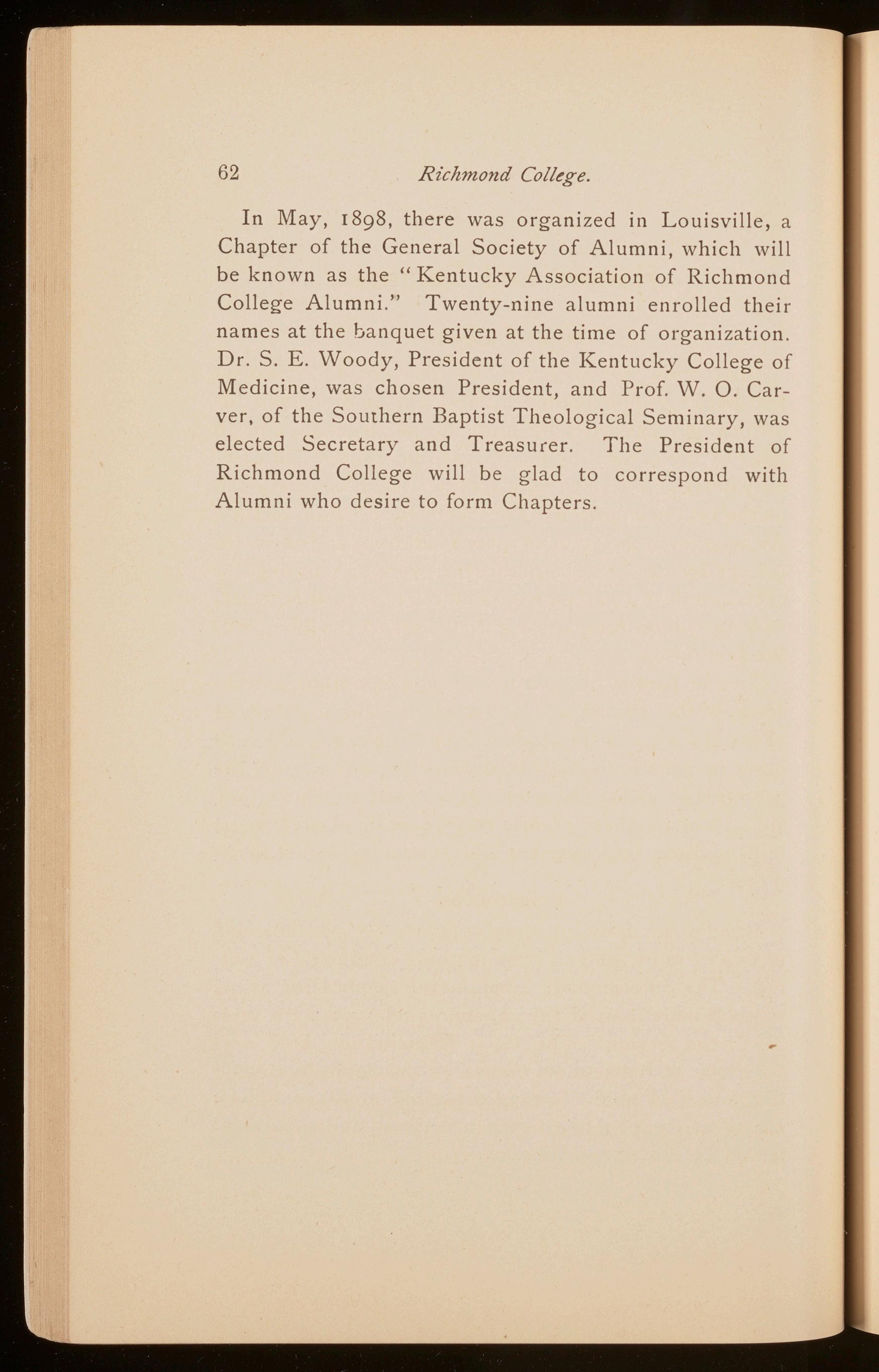
62 Richmond College.
In May, 1898, there was organized 111 Louisville, a Chapter of the General Society of Alumni, which will be known as the "Kentucky Association of Richmond College Alumni ." Twenty-nine alumni enrolled their names at the banquet given at the time of organization . Dr. S. E. Woody, President of the Kentucky College of Medicine, was chosen President, and Prof. Vv.0. Carver, of the Southern Baptist Theological Seminary, was elected Secretary and Treasurer. The President of Richmond College will be glad to correspond with Alumni who desire to form Chapters.
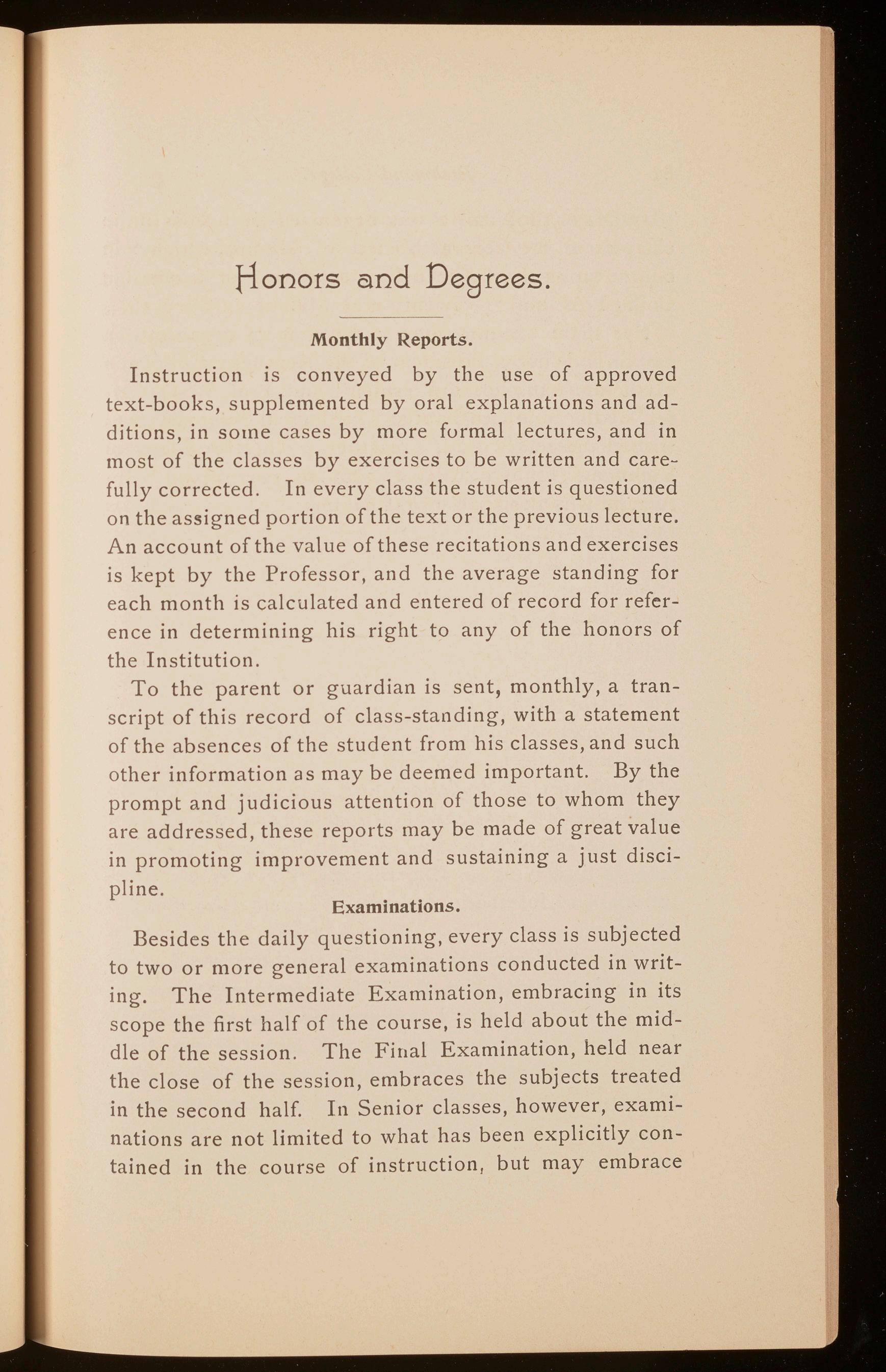
Instruction 1s conveyed by the use of approved text-books, supplemented by oral explanations and additions, in some cases by more formal lectures, and in most of the classes by exercises to be written and carefully corrected. In every class the student is questioned on the assigned portion of the text or the previous lecture. An account of the value of these recitations and exercises is kept by the Professor, and the average standing for each month is calculated and entered of record for reference in determining his right to any of the honors of the Institution.
To the parent or guardian is sent, monthly, a transcript of this record of class-standing, with a statement of the absences of the student from his classes, and such other information as may be deemed important. By the prompt and judicious attention of those to whom they are addressed, these reports may be made of great value in promoting improvement and sustaining a just discipline.
Besides the daily questioning, every class is subjected to two or more general examinations conducted in writing. The Intermediate Examination, embracing in its scope the first half of the course, is held about the middle of the session. The Final Examination, held near the close of the session, embraces the subjects treated in the second half. In Senior classes, however, examinations are not limited to what has been explicitly contained in the course of instruction, but may embrace
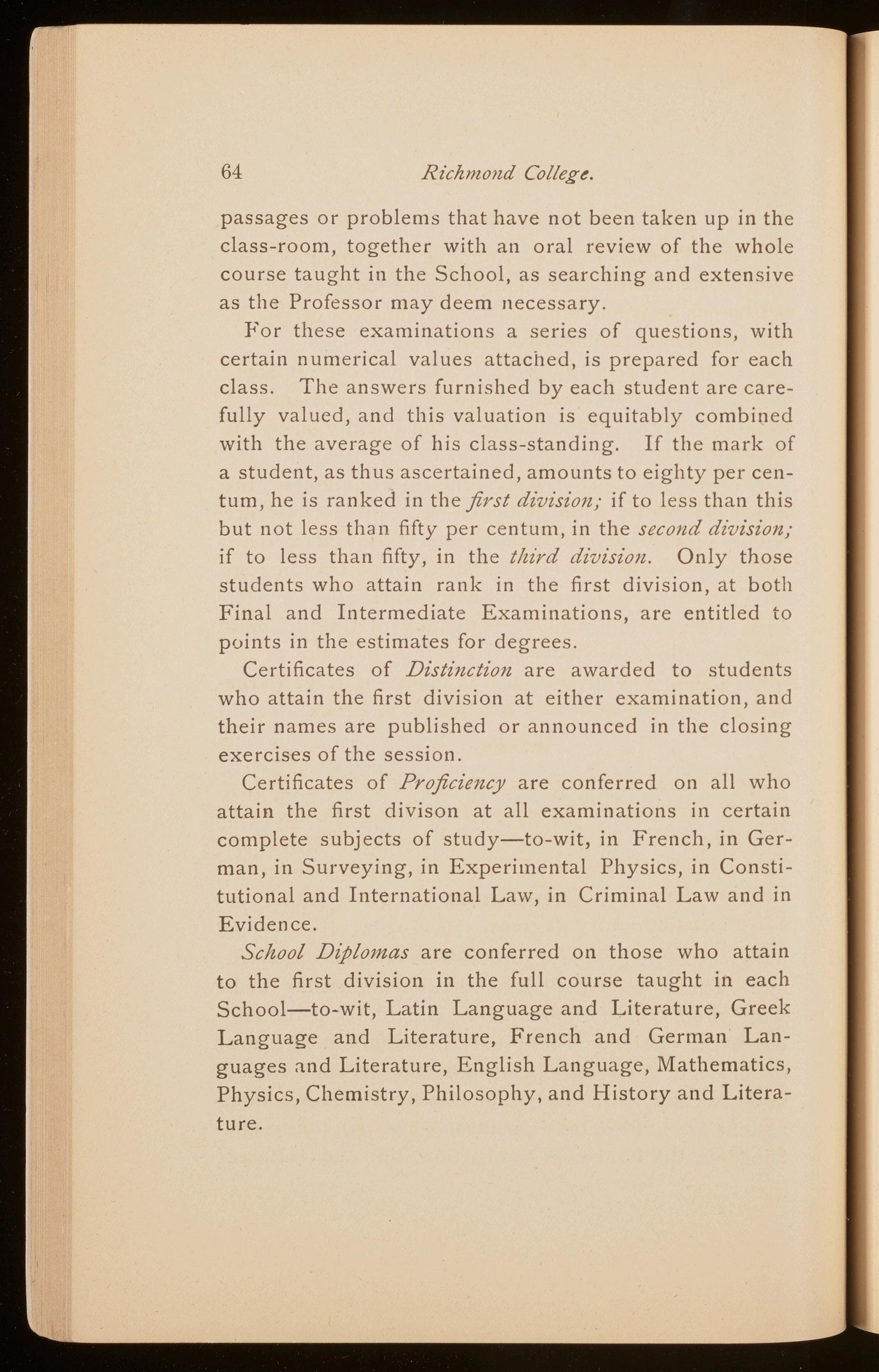
64 Richmond College.
passages or problems that have not been taken up in the class-room, together with an oral review of the whole course taught in the School, as searching and extensive as the Professor may deem necessary.
For these examinations a series of questions, with certain numerical values attached, is prepared for each class. The answers furnished by each student are carefully valued, and this valuation is equitably combined with the average of his class-standing. If the mark of a student, as thus ascertained, amounts to eighty per centum, he is ranked in the first divz'sion,· if to less than this but not less than fifty per centum, in the second divz'sion; if to less than fifty, in the t!tz'rd dz'vz'sion. Only those students who attain rank in the first division, at both Final and Intermediate Examinations, are entitled to points in the estimates for degrees.
Certificates of Distinction are awarded to students who attain the first division at either examination, and their names are published or announced in the closing exercises of the session.
Certificates of Pro.ficz'ency are conferred on all who attain the first divison at all examinations in certain complete subjects of study-to-wit, in French, in German, in Surveying, in Experimental Physics, in Constitutional and International Law, in Criminal Law and in Evidence.
School Dz'plomas are conferred on those who attain to the first division in the full course taught in each School-to-wit, Latin Language and Literature, Greek Language and Literature, French and German Languages :i.nd Literature, English Language, Mathematics, Physics, Chemistry, Philosophy, and History and Literature.
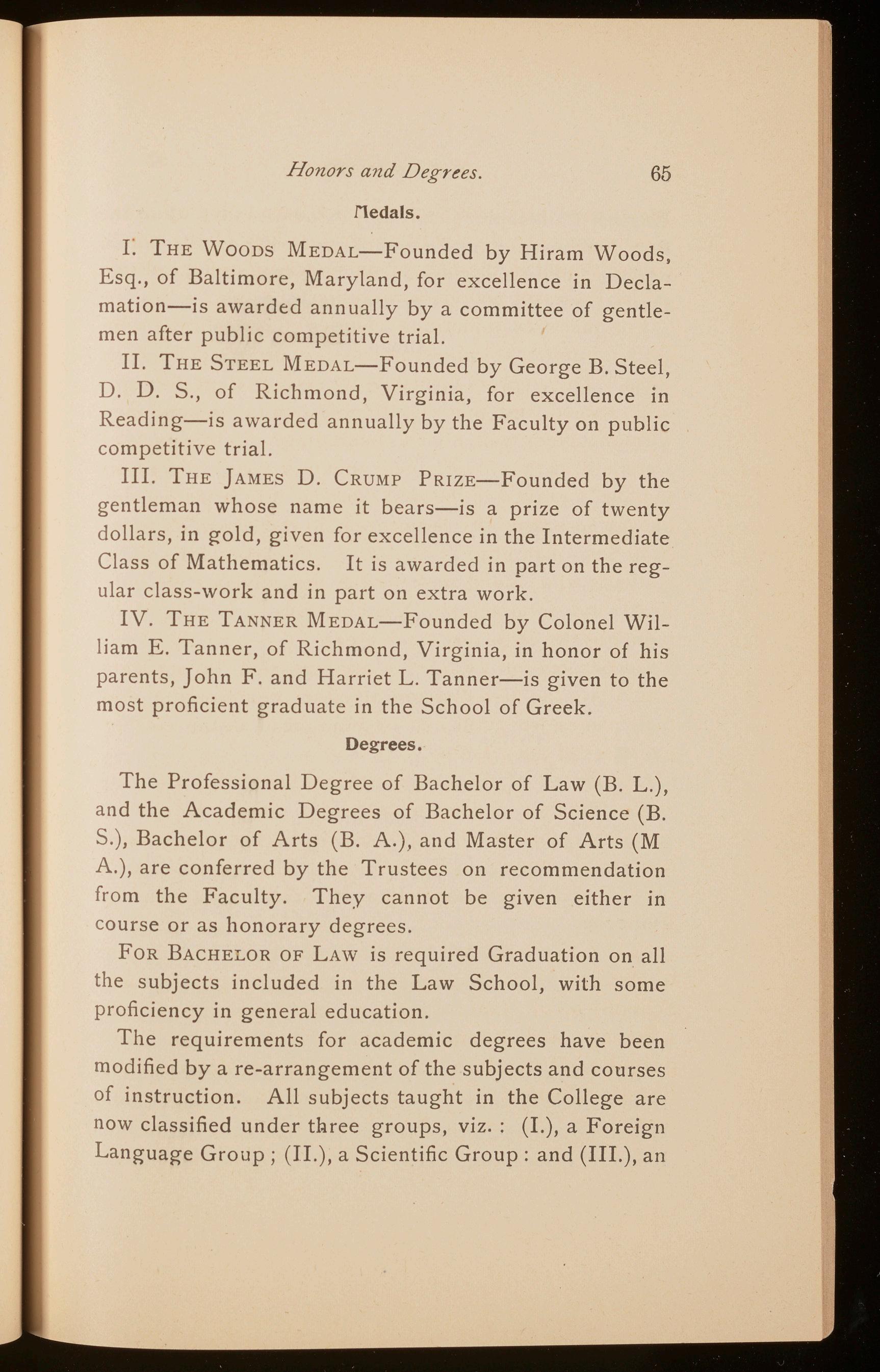
rledals.
I. THE WOODS MEDAL-Founded by Hiram Woods, Esq., of Baltimore, Maryland, for excellence in Declamation-is awarded annually by a committee of gentlemen after public competitive trial.
II. THE STEEL MEDAL-Founded by George B. Steel, D. D. S., of Richmond, Virginia, for excellence in Reading-is awarded annually by the Faculty on public competitive trial.
III. THE JAMES D. CRUMP PRIZE-Founded by the gentleman whose name it bears-is a prize of twenty dollars, in gold, given for excellence in the Intermediate Class of Mathematics. It is awarded in part on the regular class-work and in part on extra work.
IV. THE TANNER MEDAL-Founded by Colonel William E. Tanner, of Richmond, Virginia, in honor of his parents, John F. and Harriet L. Tanner-is given to the most proficient graduate in the School of Greek.
Degrees.
The Professional Degree of Bachelor of Law (B. L.), and the Academic Degrees of Bachelor of Science (B. S.), Bachelor of Arts (B. A.), and Master of Arts (M A.), are conferred by the Trustees on recommendation from the Faculty. They cannot be given either in course or as honorary degrees.
FoR BACHELOROF LAW is required Graduation on all the subjects included in the Law School, with some proficiency in general education. The requirements for academic degrees have been modified by a re-arrangement of the subjects and courses of instruction. All subjects taught in the College are now classified under three groups, viz.: (I.), a Foreign Language Group; (JI.), a Scientific Group: and (III.), an
66
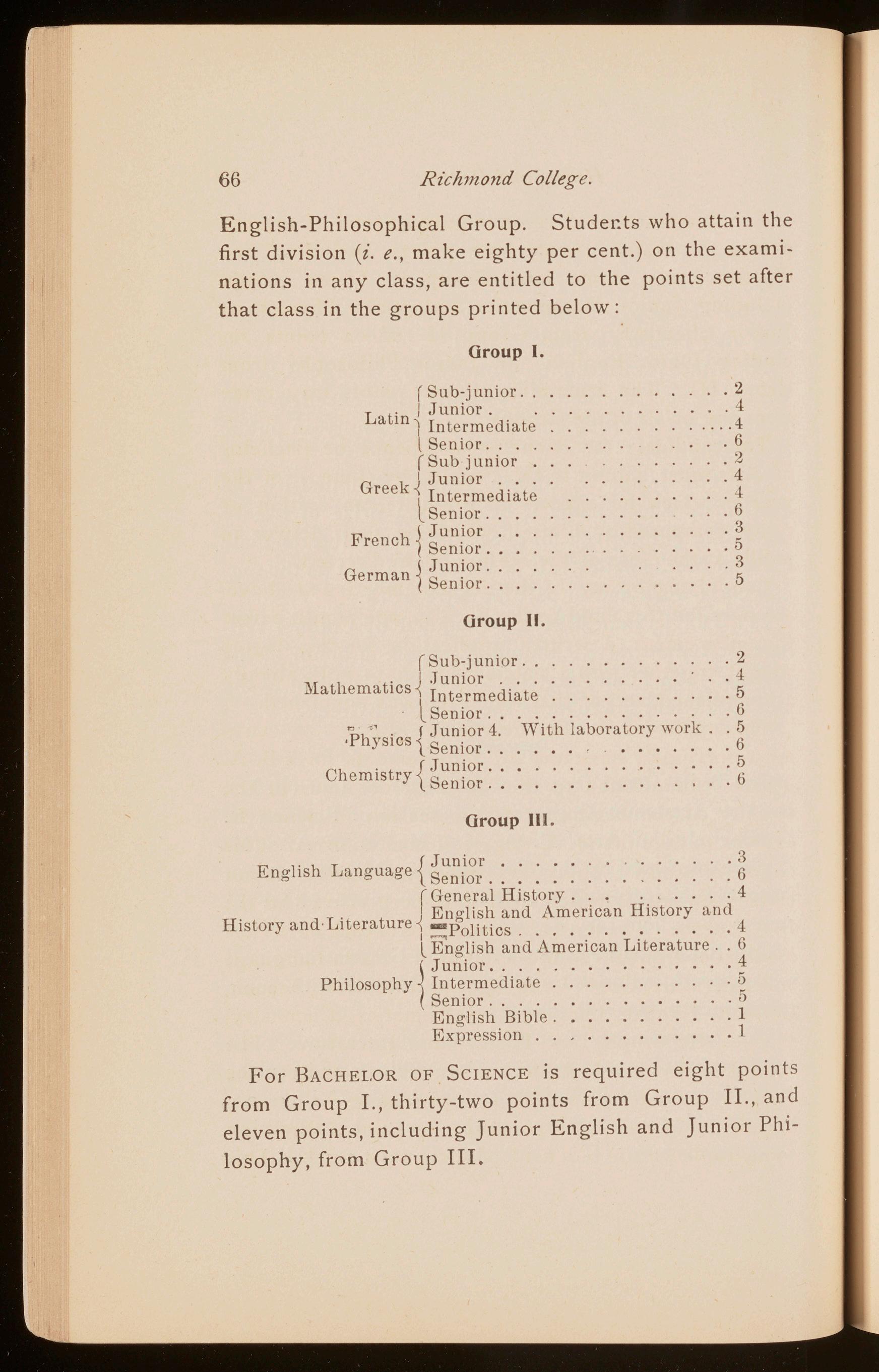
Richmond College.
English-Philosophical Group. Stude1:ts who attain the first division (i. e., make eighty per cent.) on the examinations in any class, are entitled to the points set after that class in the groups printed below:
Group I.
(Sub-junior .. L t" J Junior. . a in )lIntermediate Senior
For BACHELOR OF ScrnNCE is required eight points from Group I., thirty-two points from Group II., and eleven points, including Junior English and Junior Philosophy, from Group III.
Honors and Degrees.

67
For BACHELOROF ARTS is required a total of seventy p oints, of which twenty-four points, including one d iploma, must come from Group I; fifteen points, i ncluding Junior Mathematics and Junior Physics, or J unior Chemistry, from Group II., fifteen points, inc luding Junior English and Junior Philosophy, from G roup III. The remaining sixteen points may come fr om any or all of the Groups.
The candidate for Bachelor of Science or Bachelor o f Arts must submit to the Faculty by June I of the ye ar in which he expects to graduate, an oration or es say, composed by himself, which he shall deliver in pu blic at the close of the session, if so directed.
Candidates for any of the degrees mentioned above, a re required to submit to the Faculty, one month before Co mmencement, a written application for the degree so ught, together with a statement of class-work already ac complished, and of that which remains unfinished.
The applicant for the degree of MASTER OF ARTS must previously have met all requirements for a B. A. de gree. In addition to this he must obtain from the Fa culty, at the beginning of the session in which he ex pects to take the M . A. degree, formal approval of his co urse of study. This course must embrace four senior cla sses, no one of which shall have been offered for the B. A. degree. The most a dvanced class in each of the follo wing departments counts as a senior: Latin Language a nd Literature, Greek Language and Literature, French, Ge rman, English Language, Mathematics, Chemistry, P hysics, Philosophy, and History and Literature. The ca ndidate for the M. A. degree must also submit to the Fa culty, not later than May 15th preceding the close of h is course of study, a type-written or printed thesis on so me topic within the field of his year's work. This
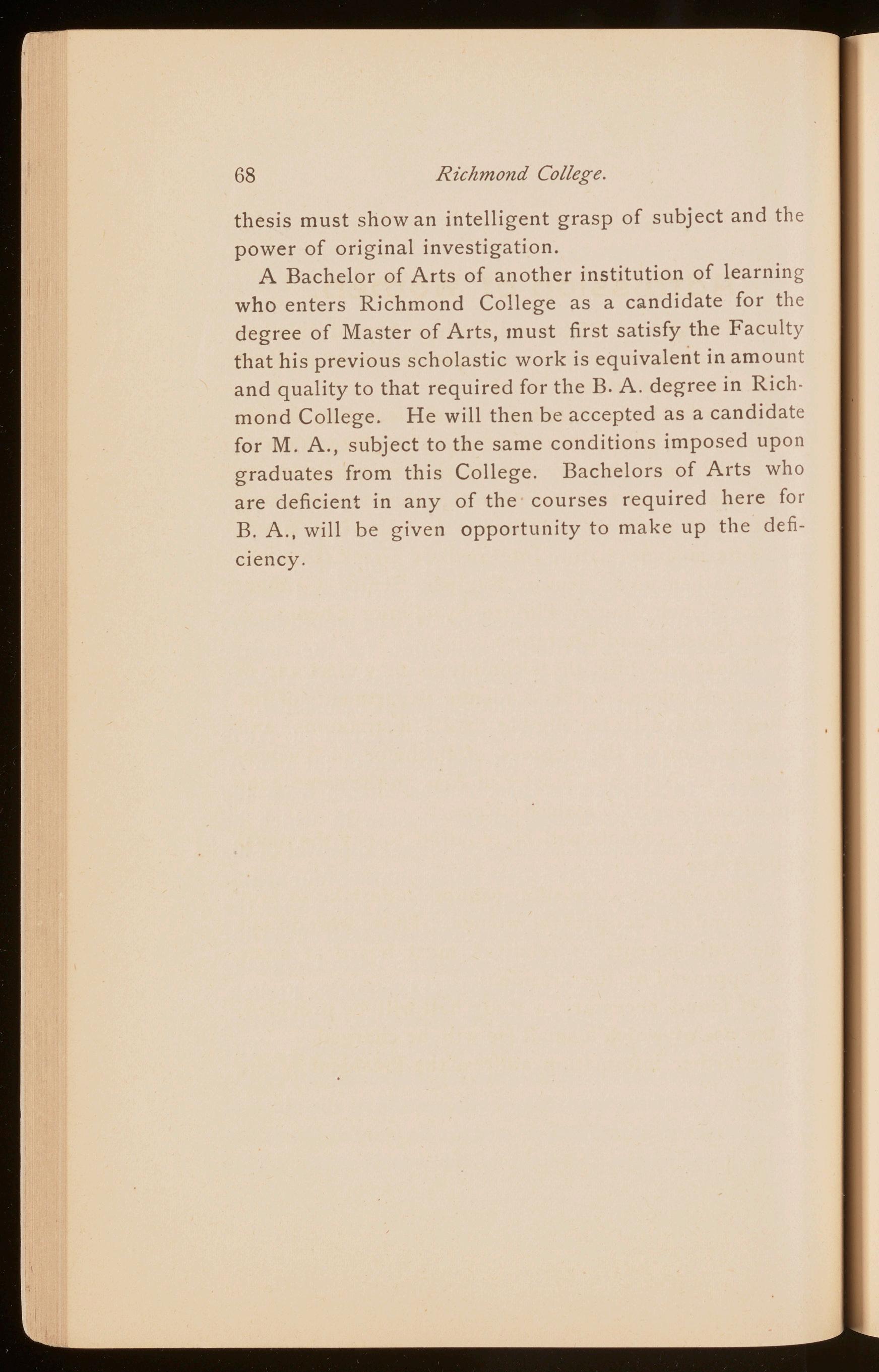
68 Richmond College. thesis must show an intelligent grasp of subject and th e power of original investigation.
A Bachelor of Arts of another institution of learnin g who enters Richmond College as a candidate for t he degree of Master of Arts, must first satisfy the Facul ty that his previous scholastic work is equivalent in amou nt and quality to that required for the B. A. degree in Ric hmond College He will then be accepted as a candid ate for M . A . , subject to the same conditions imposed up on graduates from this College. Bachelors of Arts wh o are deficient in any of the courses required here fo r B. A., will be given opportunity to make up the de ficiency.
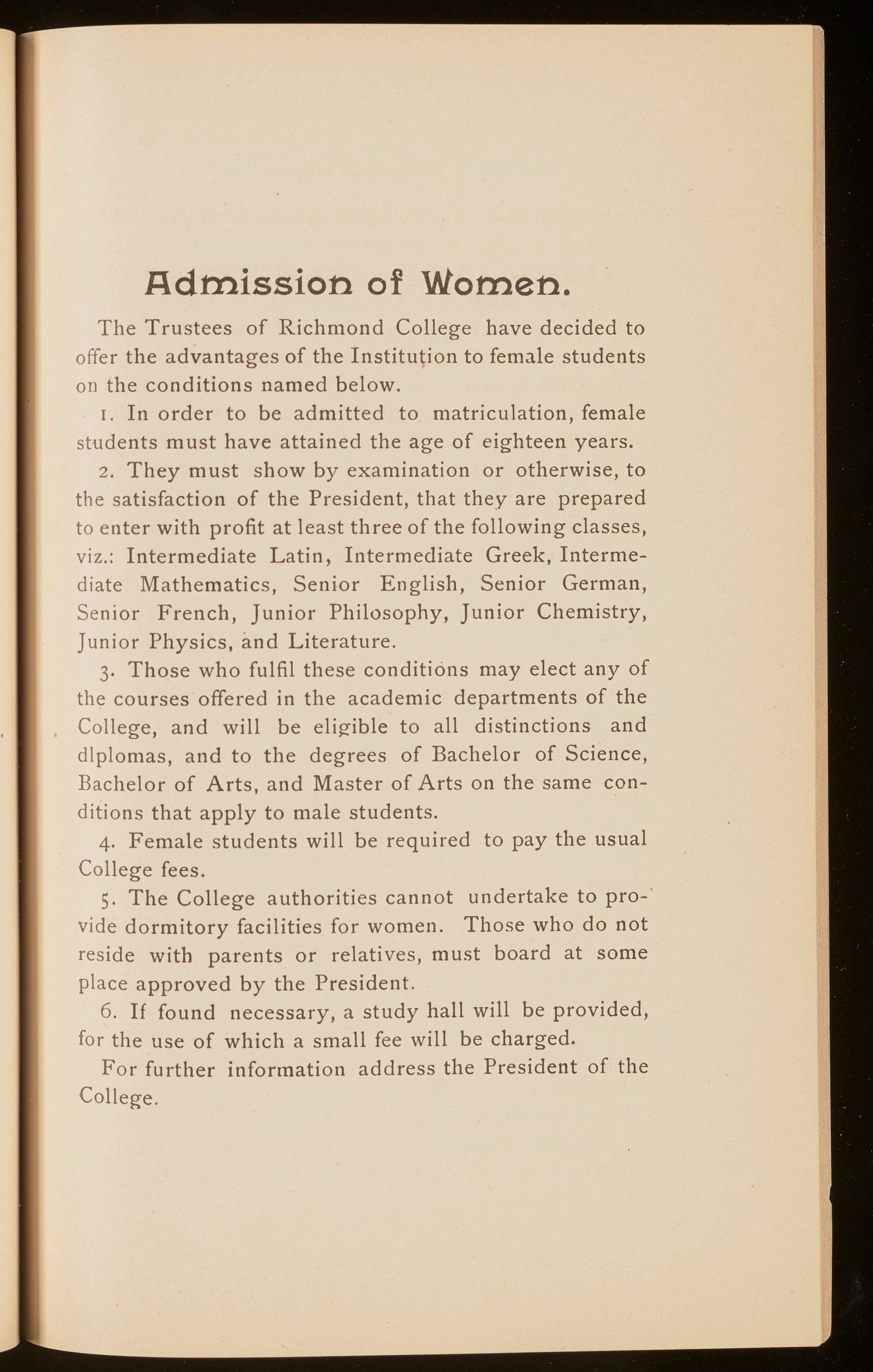
The Trustees of Richmond College have decided to offer the a dvantages of the Institution to female students on t he conditions named below
1. In order to be admitted to matriculation, female stude nts must have attained the age of e ighteen years.
2. They must show by examination or otherwise, to the sa tisfaction of the President, that they are prepared to en ter with profit at le a st three of the following classes, viz.: Intermediate Latin, Intermediate Greek, Intermedia t e M a thematic s , Senior English, Senior German, Senio r French, Junior Philosophy, Junior Chemistry, Junior Physics, and Literature
3. Those who fulfil these conditions may elect any of the c ourses offered in the academic departments of the Colleg e, and will be eligible to all distinctions and diplo mas, and to the degrees of Bachelor of Science, Bac h e lor of Arts, and M a ster of Arts on the same conditio ns that apply to male students.
4. Female students will be required to pay the usual Colle ge fees.
5. The College authorities cannot undertake to pro- · vide d o rmitory facilities for women Those who do not resid e with parents or relatives, must board at some place approved by the President
6 . If found necessary, a study hall will be provided, for the use of which a small fee will be charged.
Fo r further information address the President of the Co llege

The session opens on the Thursday nearest to the 22d of September, and continues thirty-eight weeks . The next session, therefore, will open September 22, 1898, and close June 15, 1899. The exercises are suspended for one week at Christmas and on two separate days in spring, "Historical day," for an excursion to some place of special interest, and "Field Day," for competitive out-of-door sports.
Students are advised to be present at the opening of the session. This applies particularly to students who enter Junior or Sub-junior classes. Students who are prepared for classes higher than Sub-junior may enter with advantage at the opening of the spring term, February 7th. Students who show sufficient preparation are allowed to enter at any time.
The system of Schools allows the selection by every student of such studies as will be most valuable in qualifying him for his future pursuits; but while allowing such selection, the College holds that the man is more than the occupation, and will always encourage a regular and complete course. To this end the right is reserved to prescribe the studies of any who may be found unprepared for classes higher than the Junior in Latin, English, and Mathematics.
Every one is expected to attend at least three Schools, and to adhere throughout the session to the studies selected on his matriculation. Students who desire to

pursue special studies in one or more Schools should communicate with the President.
Students are assigned to the several classes in a School according to their apparent attainments; but the Professor will, at any time, transfer a student to a higher or lower class when, in his judgment, such a change is desirable.
Every applicant for admission, upon arriving at the College, will report promptly to the President. If he has been a student at any other college, he must present satisfactory evidence of general good conduct while there. If he comes from an academy or high-school, it is desirable that he should bring a testimonial from the principal or other teacher showing what studies he has pursued and what progress he has made.
In case of reasonable doubt whether the applicant is prepared by his previous training to undertake collegiate work, the question will be decided by entrance examinations in any two that he may elect, or in all of the three Schools of English, Mathematics, and Latin, For entering the School of English the requirements are "a knowledge of Elementary English Grammar anc:1ability to write with grammatical correctness''; for Mathematics, "a good knowledge of Arithmetic and Elementary Algebra through Simple Equations"; for Latin "such acquaintance with the elements of Latin Grammar as will enable one to begin to translate with profit.'' If found well prepared in all these the applicant can enter either these Schools or others; if prepared on two of them but not on the third, he will be allowed to matriculate, and will be aided in securing competent instruction, if desired, in the branch on which he is deficient.

Richmond College.
When the question of preparation for College has been settled affirmatively, and the applicant has duly subscribed to the regulations, he will receive a permit to matriculate, and, upon presentation of this to the Treasurer of the College and payment of the required fees, his name will be placed on the rolls.
For statement concerning the matriculation of women, see special announcement on "Admission of Women."
Expenses.
Matriculation Fee-Including entrance fees, public rooms, attendance, and all college privileges, ,$18.50 This fee must be paid at entrance, is not subject to deduction, nor in any case refunded. Students entering after February 1st, pay half of this fee.
Tuition.-In one school $25; in two, ,$50; in three, $70; in four or more, ,$20 for each. Tuition fees are payable one-half on entrance, the balance Ist of February, subject to deduction for time lost by late entrance or by sickness, if the time so lost be two consecutive months or more, but not subject to deduction for other cause or for less time.
Fuel, Lights, and Laundry cost from $2 to $2.50 a month.
Board.-Excellent table board is furnished at the College Refectory at a cost not exceeding $IO a month. The Refectory is a handsome brick building, located on the campus, and is in charge of an experienced matron, appointed by the President. The seating capacity of the hall is limited to eighty. Prompt payment of bills at the end of every month is required.
A new boarding-hall was opened two years ago in which table-board was to be furnished at $7.50 a month. Accommodations were arranged for twenty-five. The

s uccess of the experiment was immediate . The diningr oom soon had to be enlarged, and the number of places at table was increased to forty-five. There has been no complaint of the fare, but, on the contrary, constant expressions of surprise that such abundant and appetizing fo od could be served at such a price. The new hall has made expenses from the beginning . Further improvements make the accommodations of this hall sufficient fo r seventy boarders The equipment for 1898-'99 will be new throughout.
A third hall, known among the students as "The E ureka," was opened in a rented house in September, 189 7 . Board is furnished at a n average cost of $6.50 a mo nth. The capacity of the hall is twenty boarders .
All three of these halls are under the direct supervis ion and control of .the President of the College .
Near the College are three or four boarding-houses which furnish good table-board at from $IO to $12 a m onth, and still others in which students can get furn is hed rooms, with fuel and light, for about$ 16 a month .
At the request of the President, several families of we ll-known culture and refinement have consented to re ceive one or more students as boarders . Charges wi ll be from $20 to $25 a month for furnished room w ith board and servant's attendance. This arrangement is especially commended to parents who desire their so ns to be subject to refined home influences. Names a nd addresses of persons willing to receive boarders will be furnished on application
Rooms.-Unfurnished rooms are rented to students at a n annual charge to each occupant of$ 5 for a single room, o r $7.50 for a double room. The occupants supply the n ec e ssary furniture. If bedding, towels, &c., be brought fr om home, the outlay for furniture need not exceed $5
Richmond College.
or $6, and the articles bought here can readily be sold again when the student leaves college. A committee of the students' Y . M. C . A. will render any needed assistance in furnishing rooms comfortably and at small cost. Rooms on the campus are much sought after, and applications should be made early .
It is generally known that, owing to the large increase in attendance during 1897-'8, it was impracticable to furnish rooms to all who applied for them. Special attention is therefore called to the fact that arrangements have been perfected whereby all students can be assigned to excellent rooms. Not more than two students will be placed in one room.
Summary for an Academic Student.
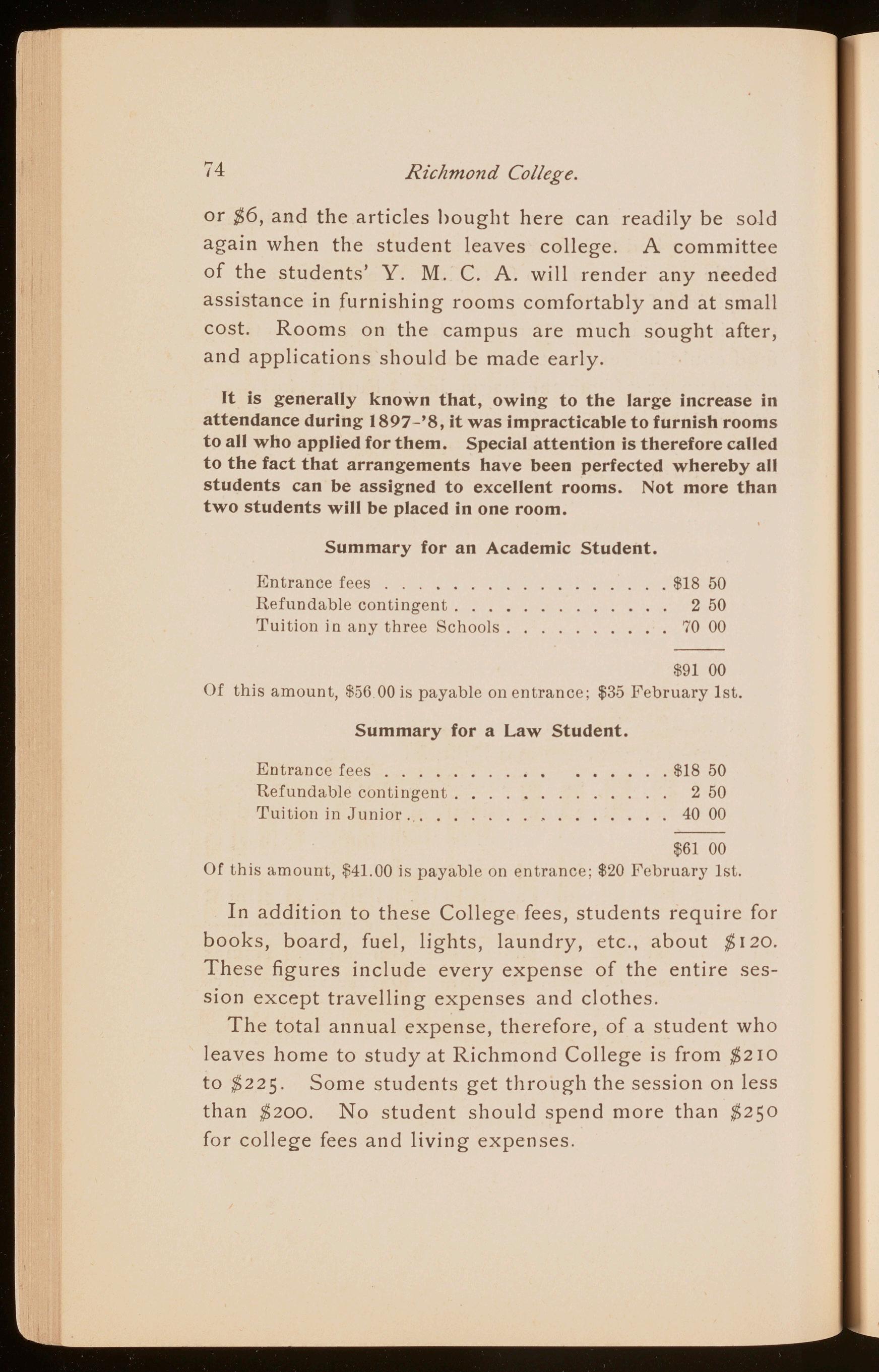
Summary for a Law Student.
In addition to these College fees, students require for books, board, fuel, lights, laundry, e tc., about $ 120. These figures include every expense of the entire session except travelling expenses and clothes.
The total annual expense, therefore, of a student wh o leaves home to study at Richmond College is from $2 IO to $ 225. Some students get through the session on less than $ 200. No student should spend more than $ 250 for college fees and living expenses.
PROPOSED NEW DORMITORY.

SCIENCE HALL. (To be completed during '98- '99. J

76 Richmond College.
Diploma Fees.-For every Certificate of Proficiency or School Diploma awarded the charge is $I. For a Degree Diploma $5,
Students who desire to have made out for them such Proficiencies and School Diplomas as they may win, must notify the President in writing one week before Commencement. Students who take Degrees are required to accept and pay for their Degree Diplomas.
Laboratory Fee.-Students who take Chemistry are required to pay a fee of $5 for chemicals used in the laboratory.
Refundable Deposits.-Students are required to deposit with the Treasurer $2. 50, to cover any damage to College property or Library fines. At the close of the session this money, or such portion as the depositor may be entitled to, is returned.
Non-resident students, if assigned to a room for study during the day, will pay $2.50 on account of fuel. This is collected by the Treasurer and paid over to the occupants of the room.
Students need not keep money about their persons or in their rooms, but may, without expense, deposit it for safe-keeping with an officer of the College.
Candidates for the Ministry.
Ministers of the Gospel, of all denominations, and young men duly approved by their churches as candidates for the ministry, are admitted free of charge for tuition. They pay matriculation fee, and for fuel, lights, board, &c., the same with other students.
The Education Board of the Virginia Baptist General Association will render further assistance to worthy young men recommended by churches which contribute to the Board, and accepted after examination. For information on this matter, address Hon. J. T. Ellyson, Corresponding Secretary, Richmond, Va.
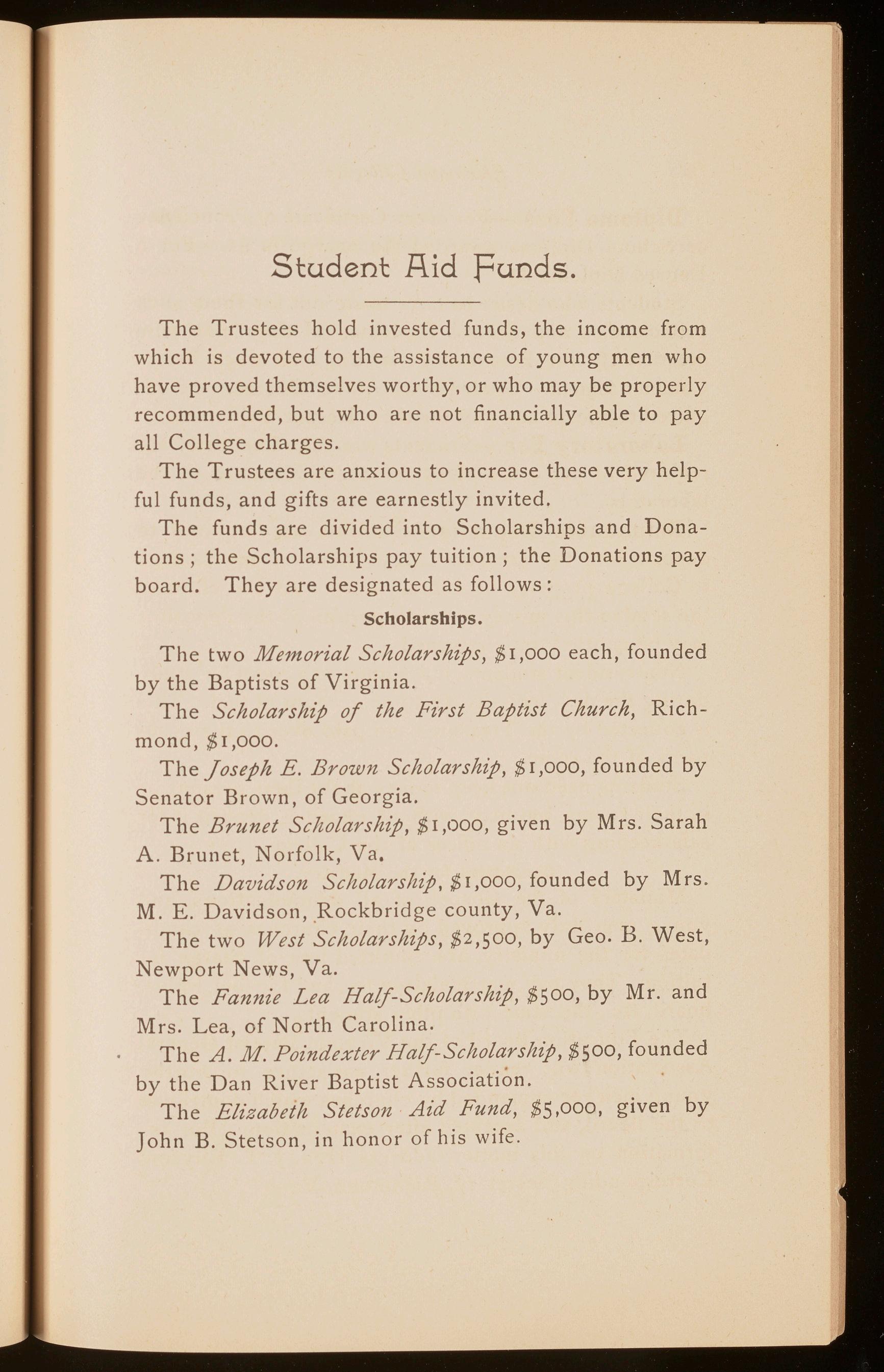
The Trustees hold invested funds, the income from which is devoted to the assistance of young men who have proved themselves worthy, or who may be properly recommended, but who are not financially able to pay all College charges.
The Trustees are anxious to increase these very helpful funds, and gifts are earnestly invited.
The funds are divided into Scholarships and Donations; the Scholarships pay tuition; the Donations pay board. They are designated as follows: Scholarships.
The two Memorial Scliolarshz'ps, $1,000 each, founded by the Baptists of Virginia.
The Scholarship of the First Baptist Church, Richmond, $1,000.
The Joseph E. Brown Scholarship, $ I ,ooo, founded by Senator Brown, of Georgia.
The Brunet Scltolarsliip, $1,000, given by Mrs. Sarah A. Brunet, Norfolk, Va,
The Davidson Scltolarslzip, $ I ,ooo, founded by Mrs. M. E. Davidson, Rockbridge county, Va.
The two West Scliolarshz'ps, $2,500, by Geo. B. West, Newport News, Va.
The Fannie Lea Haif-Sclzolarship, $500, by Mr. and Mrs. Lea, of North Carolina.
The A. M: Poindexter Haif-Scliolarshz'p, $500, founded by the Dan River Baptist Association.
The Elz'zabeth Stetson Aid Fund, $5,000, given by John B. Stetson, in honor of his wife.
78
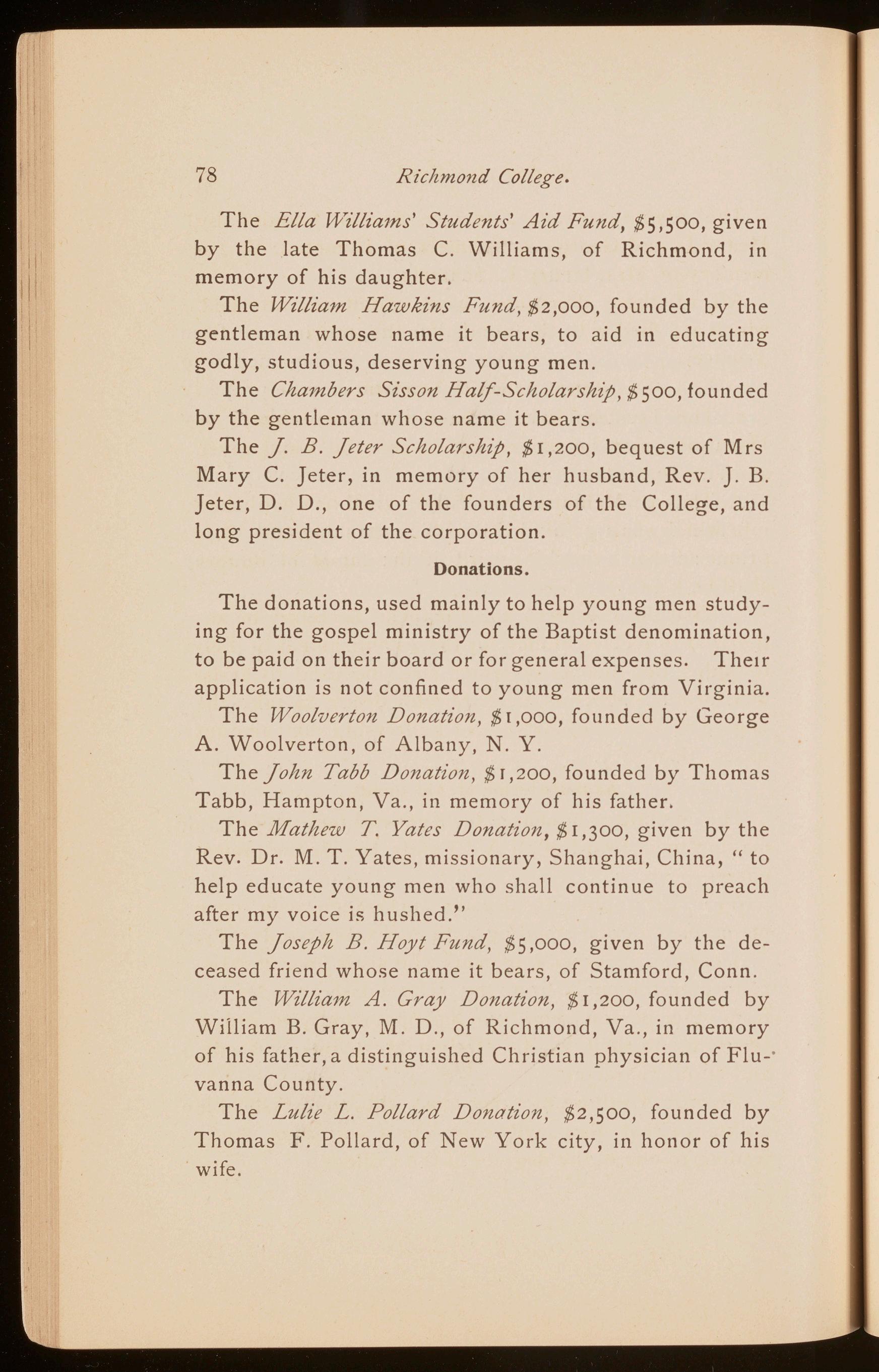
Ric!tmond College.
The Ella Williams' Students' Aid Fund, $5,500, given by the late Thomas C. Williams, of Richmond, in memory of his daughter.
The William Hawkins Fund, $2,000, founded by the gentleman whose name it bears, to aid in educating godly, studious, deserving young men.
The Chambers Sisson Haif-Scholarshz'p, $500, founded by the gentleman whose name it bears.
The J. B. Jeter Scholarsftz'p, $1,200, bequest of Mrs Mary C. Jeter, in memory of her husband, Rev. J. B . Jeter, D. D., one of the founders of the College, and long president of the corporation.
The donations, used mainly to help young men studying for the gospel ministry of the Baptist denomination, to be paid on their board or for general expenses. Then application is not confined to young men from Virginia.
The Woolverton Donation, $ r ,ooo, founded by George A. Woolverton, of Albany, N. Y.
The John Tabb Donation, $ r ,200, founded by Thomas Tabb, Hampton, Va . , in memory of his father.
The Mat!iew T. Yates Donation, $ I ,300, given by the Rev. Dr. M. T. Yates, missionary, Shanghai, China, "to help educate young men who shall continue to preach after my voice is hushed ''
The Joseph B. Hoyt Fund, $5,000, given by the deceased friend whose name it bears, of Stamford, Conn.
The William A. Gray Donation, $1,200, founded by William B. Gray, M . D., of Richmond, Va., in memory of his father, a distinguished Christian physician of Flu- · vanna County.
The Lulie L. Pollard Donation, $2,500, founded by Thomas F. Pollard, of New York city, in honor of his wife.
Student Aid Funds.
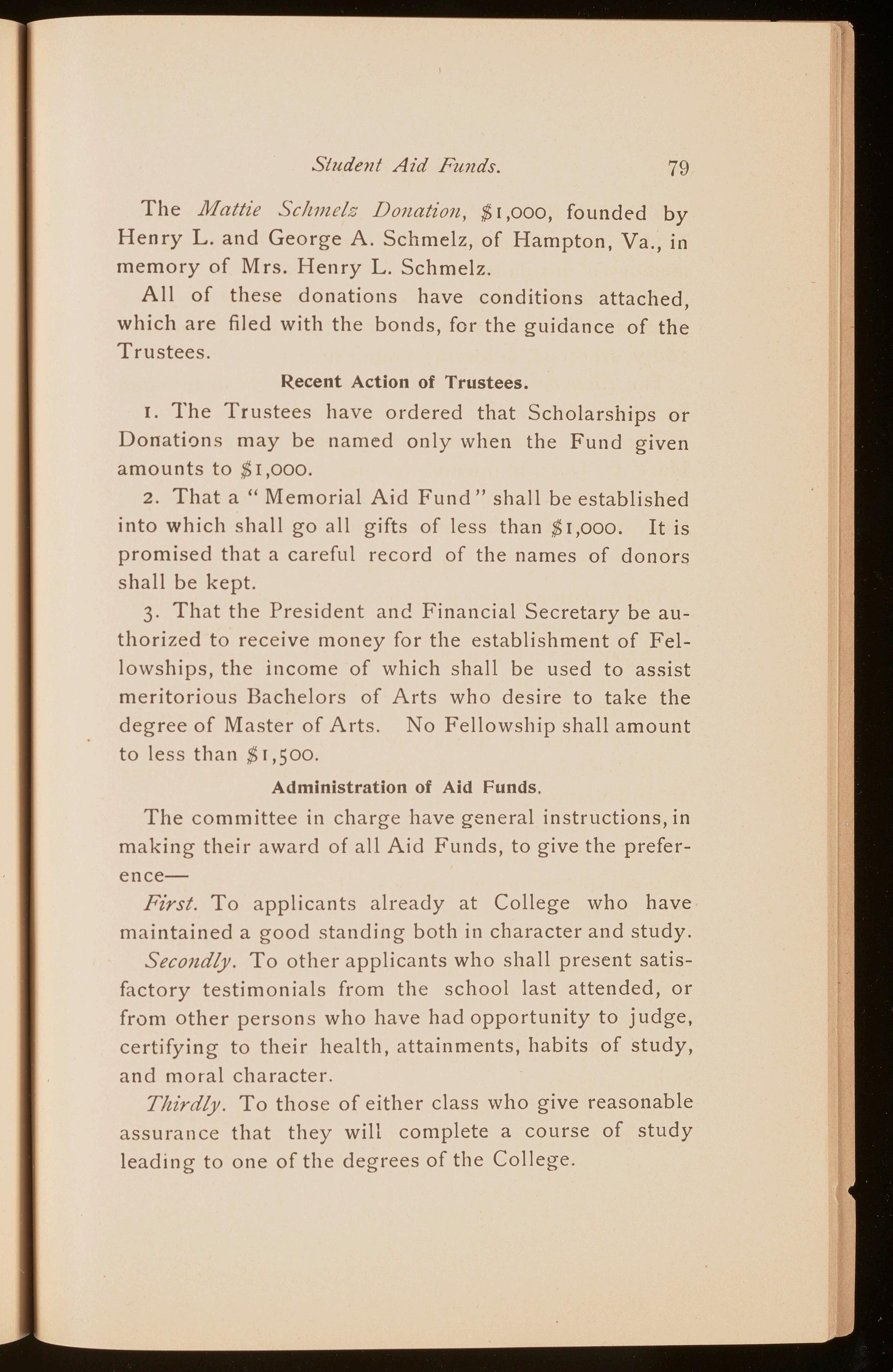
79
The Mattie Sclmze!z Donation, $ I ,ooo, founded by Henry L. and George A. Schmelz, of Hampton, Va., in memory of Mrs. Henry L. Schmelz.
All of these donations have conditions attached, which are filed with the bonds, for the guidance of the Trustees.
Recent Action of Trustees.
I. The Trustees have ordered that Scholarships or Donations may be named only when the Fund given amounts to $I ,ooo.
2. That a "Memorial Aid Fund" shall be established into which shall go all gifts of less than $ I ,ooo. It is promised that a careful record of the names of donors shall be kept.
3. That the President anc! Financial Secretary be authorized to receive money for the establishment of Fellowships, the income of which shall be used to assist meritorious Bachelors of Arts who desire to take the degree of Master of Arts. No Fellowship shall amount to less than $1,500.
Administration of Aid Funds.
The committee in charge have general instructions, in making their award of all Aid Funds, to give the preference-
First. To applicants already at College who have maintained a good standing both in character and study.
Secondly. To other applicants who shall present satisfactory testimonials from the school last attended, or from other persons who have had opportunity to judge, certifying to their health, attainments, habits of study, and moral character.
Tlzz'rdly. To those of either class who give reasonable assurance that they will complete a course of study leading to one of the degrees of the College.
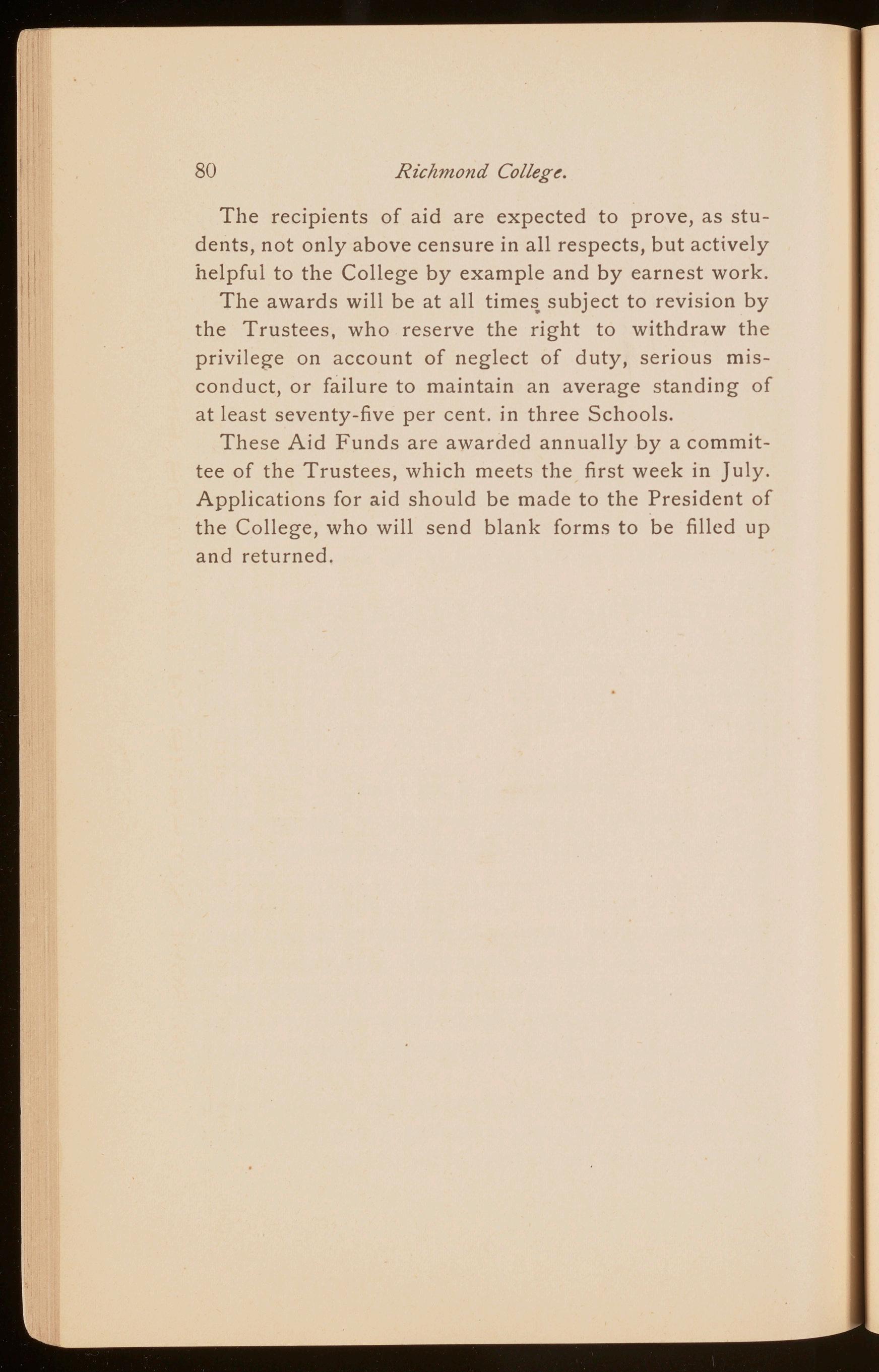
80 Richmond College.
The recipients of aid are expected to prove, as students, not only above censure in all respects, but actively helpful to the College by example and by earnest work.
The awards will be at all time~ subject to revision by the Trustees, who reserve the right to withdraw the privilege on account of neglect of duty, serious misconduct, or failure to maintain an average standing of at least seventy-five per cent. in three Schools.
These Aid Funds are awarded annually by a committee of the Trustees, which meets the first week in July.
Applications for aid should be made to the President of the College, who will send blank forms to be filled up and returned.
SAT\JRDAY.
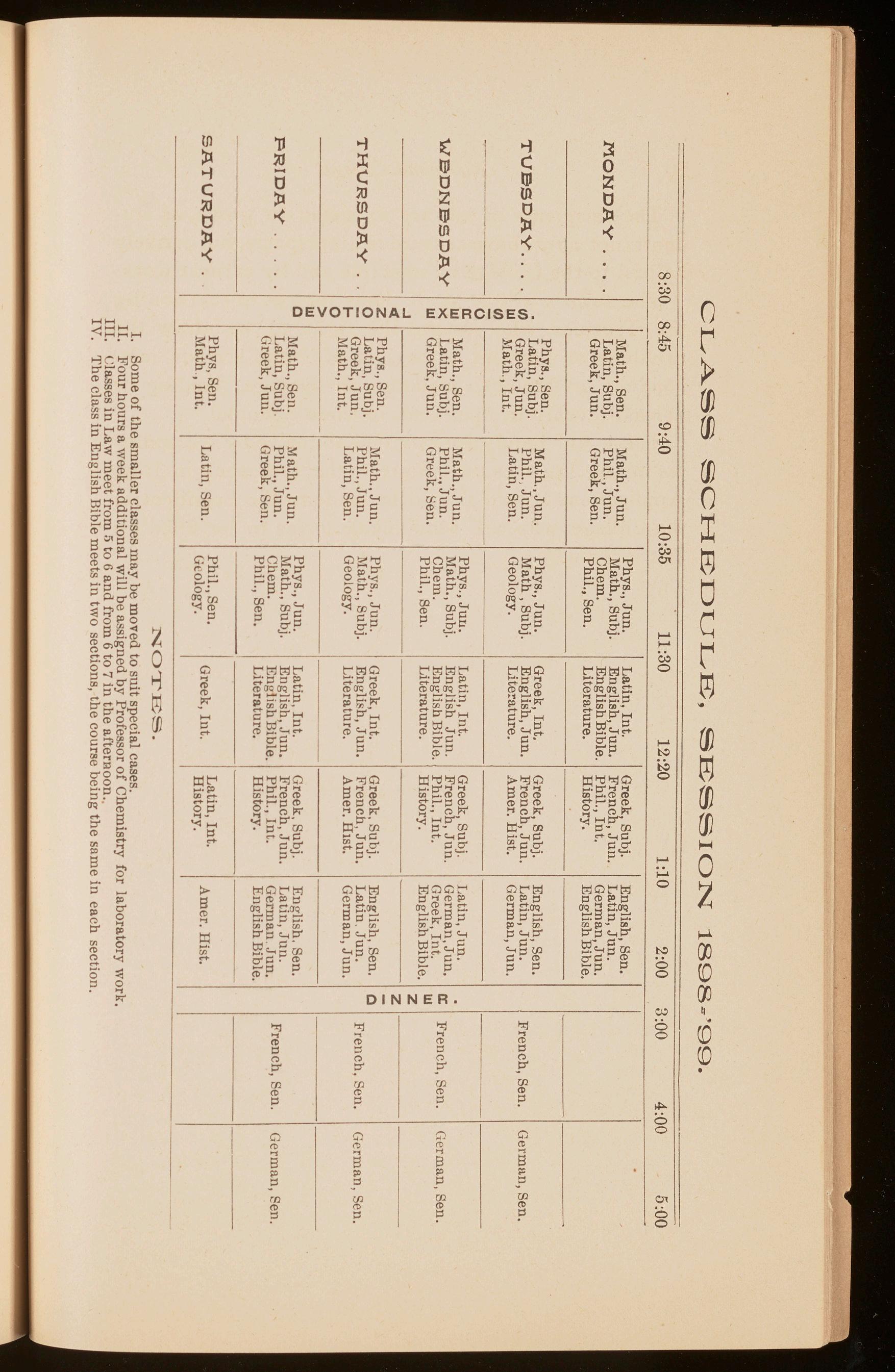
IV. The class in English Bible meets in two sections, the course being the same in each section.
III. classes in Law meet from 5 to 6 and from 6 to 7 in the afternoon.
I. Some of the smaller classes may be moved to suit special cases. IL Four hours a week additional will be assigned by Professor of Chemistry for laboratory work.
NOTE)S.
Phys, Sen. Latin, Sen . Phil.,Sen. Latin, Int. Amer. Hist. l\Iath , Int. Geology. History.
PRIDAY .. ... Latin, Subj . Phil.,Juu. Chem. English Bible. Phil., Int. German Jun. German, Sen. Greek, Jun. Greek, Sen. Phil., Sen. Literature. History. English Bible. ---------I Greek, Int.
0 l\Iath., Sen . Math.,Jun. Latin, Int. l\Iath . , Subj. English, Jun. French, Jun. Latin, Jun French, Sen.
0 Math., Int. > ----w Phys., Juu. Greek. Subj. English Sen.
Latin, Sen. Geology. Literature. Amer. Hist. German, Jun.
THURSDAY ..
0 Latin, Subj. Phil.,Jun. Math., Subj. English, Jun. French , Jun. Latin . Jun. French. Sen. German, Sen. j:: Greek, Jun.
Phys . , Sen.l\Iath.,Jun. Phys,, Jun. Greek, Int, Greek, Subj. English, Sen.
0
z c( z
WBDNBSDA Y >< Latin, Subj. Phil..Jun. Chern. English Bible. Phil., Int. Greek, Int. French, Sen. G e rman, Sen. w Greek, Jun. Greek, Den. Phil., Sen. Literature. History. English Bible. w z .J
0 a: Math., Sen. Math., Jun. Phys., Jun. Latin, Int. Greek, Subj. Latin, Jun. w Math., Subj. English Jun. French, Jun. German, Jun. a:
TVBSDAY .... rJ) Latin, Subj. Phil. , Jun. Math, Subj. English, Jun. French, Jun. Latin, Jun. French, Sen. German, Sen. w Greek, Jun. Latin, Sen. Geology, Lite:ature. Amer. Hist. German, Jun, rJ) .Math., Int.-
MONDAY .... Latin, Subj. Phil., Jun. Chem. English Bible. Phil., Int. German, Jun. Greek, Jun. Greek, Sen. Phil., Sen. Literature. History. English Bible. Phys., Sen. Math.,Jun. Phys., Jun. Greek, Int. Greek, Subj. English, Sen.
Ma.th., Sen. Math.,Jun. Phys., Jun. Latin, Int. Greek Subj. English, Sen. Math., Subj. English, Jun. French, Jun. Latin, Jun.
CL.ASS SC:E-'IEDULE, SESSION 1898a'Q9. 8:30 8:45 9:40 10:35 11:30 12:20 1:10 2:00 3:00 4:00 5:00 -
The intermediate examinations begin Monday, January 30th, and close Monday, February 6, 1899. The final examinations begin Saturday, June 3d, and close Saturday, June IO, 1899, Recitations are suspended during the period of examinations The dates in brackets indicate the time of the final examinations. Classes not here provided for will be assigned a suitable position rn the schedule.
l\Ionday, January 30 [Sat,urday, June 3]
Tuesday, January 31 [Monday, June 5]
·wed nesday, Febrmtry 1 . [Tu('sday, June 6] . . .
Thursday , February 2 . [Wednesday, June 77
Friday, February 3 . [Thursday, June 8]
Saturday, February 4 [Friday, June 9]
Monday, February (i [Saturday, June 107 . .
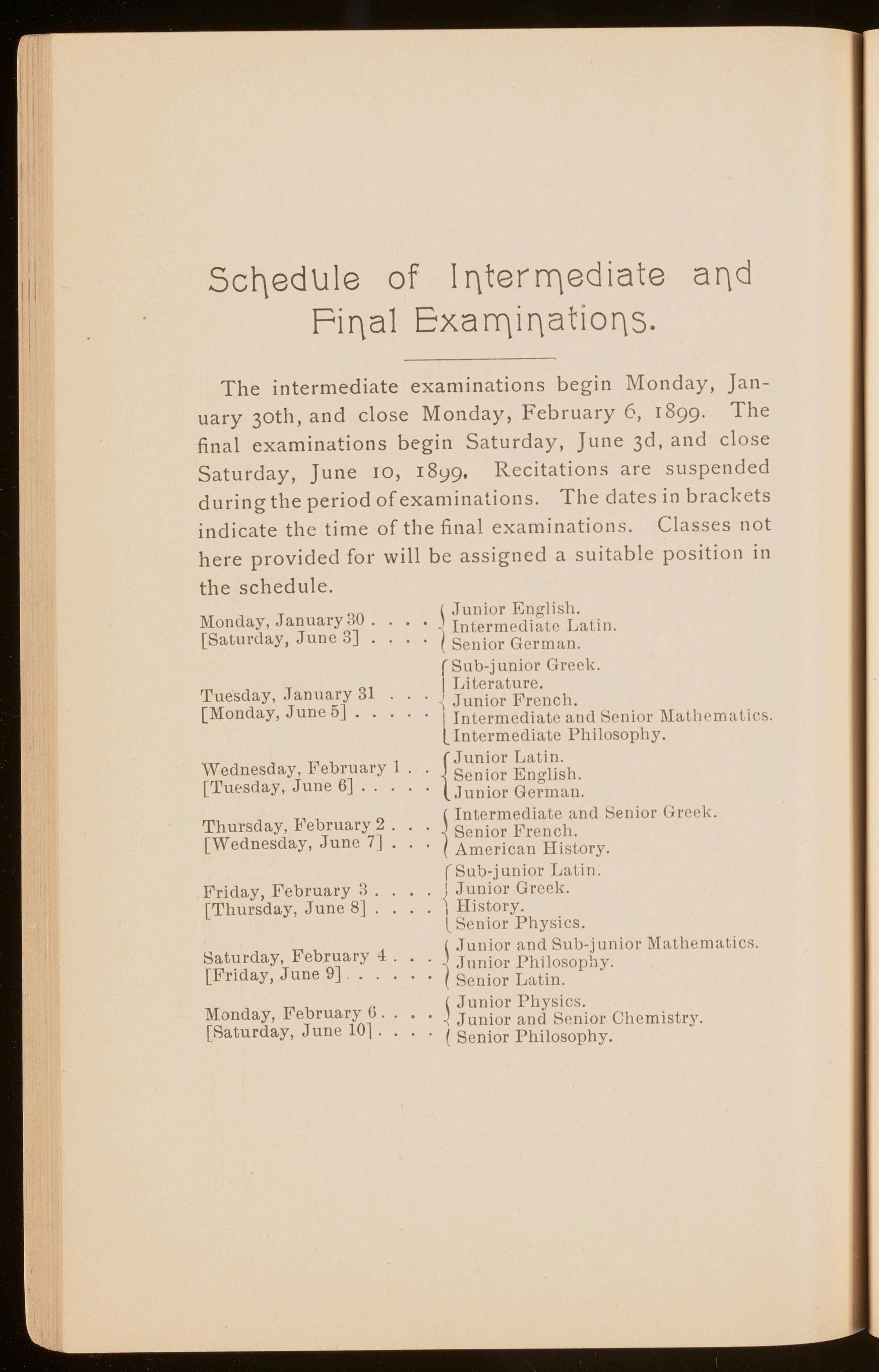
\ Junior English. . 1 IntermC'diale L;tlin. Senior German.
(Sub-junior Greek.
I TJi tcrature. Junior French. lint,ermediat,e and Senior llfalhPmatics. Intermediate Philosophy.
{ Juni or L,1tin. Senior English. ,Juni or German.
{ Intermediate :111dSenior UrPck. Senior French. American History. (Sub-junior Latin. Junior Greek. , History.
LSenior Physics.
\ Junior and Sub-junior l\Iathematics. 'l ,Junior Philosophy.
{ Senior L;1lin.
( Junior Physics. Junior and Senior Chemistry. ( Senior Philosophy.
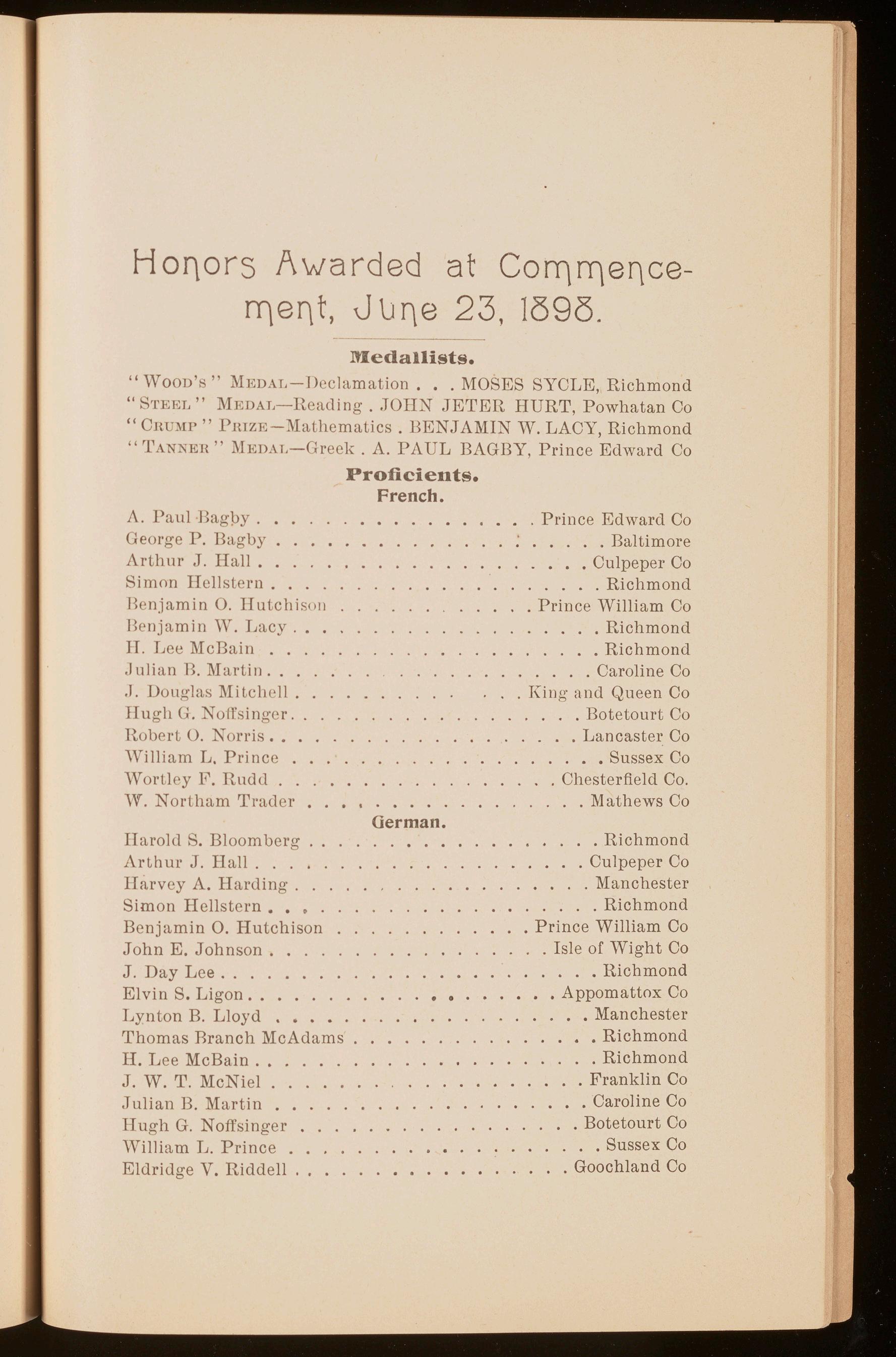
Honors Awarded at COfr\fr\8f'\C8rT\en t, June 23, IB9o. Medallists.
"Woon's" M1mAr.-neclamation ... MOSES SYCLE, Richmond "STEEL" l\1EDAr.-Reading . .TOII~ JE'rER HURT, Powhatan Co "CHurP" PmzE-~fathematics. BENJAJ\II~ ·w.LACY, Richmond "'l'AN~EH" iHEn.u,-Greek. A. PAUL BAGBY, Prince Edward Co Proficients.
J\. Paul Bag)Jy
George P. Bagby
Arthur J. Hall ..
Simon Hcllslern . llen_iamin 0. IIutchis"n
Benjamin W. Lacy .. .
JT. Lee McBain ... . ,Julian B. Martin ...... . French. . Prince Edward Co . . . . . Baltimore . • Culpeper Co Richmond . Prince William Co . .... Richmond . .... Richmond . . Caroline Co
,J. Douglas l\Iitchell. . . . .
. . . . . .. King- and Queen Co
II ugh U. N utrsi ngcr. . Botetourt Co
Rolwrt 0. Norris •.................. Lancaster Co
"\Villiam L. Prince ..................• Sussex Co
Wortley F. Rudd Chesterfield Co. W. Northam Trader . . , . • . . . . Mathews Co German.
Harold S. Bloomberg . . Richmond
Arthur J. Hall . . . . . . . . Culpeper Co
Harvey A. Harding . . . . . . . . . Manchester
Simon Hellstern • • • . . . . . . Richmond
Benjamin 0. Hutchison . Prince William Co
John E. Johnson . . . . Isle of Wight Co
J. Day Lee. . . .... Richmond
Elvin S. Ligon ...........••...... Appomattox Co
Lynton B. Lloyd .•......... Manchester
Thomas Branch McAdams . • • Richmond
H. Lee McBain . . . . . . . . . . . . . Richmond
J. W. T. McNiel . . . . . . . . . .. Franklin Co
Julian 13. Martin ................... Caroline Co
Hugh G. Noffsinger ................. Botetourt Co
William L. Prince . . . . Sussex Co
Eldridge V. Riddell . • . . Goochland Co
Richmond College.
Experimental Physics.
Edwin A. Armistead ................ NorLh Carolina
'iYillis W. Eclwarcjs . SouLhampton Co
Allen W. I•'reeman . . Richmond
Percy K. Graybill . BoLetourL Co
Arthur J. Hall . . . Culpeper Co
Thomas B. McAdams. . . Richmond
John W. T. McNiel . . . Frnnklin Cu
Robert B. l\Iunford, J1·. . Richmond
Hugh G. Noffsinger . Bot<'lourt Uo
Charles 0. Pearson . Lanc,Lstcr Uo
Cullen S. Pitt . . . .............. Henrico C'o Sussex C'u
S. Straughan Robinson
John vY.Shepard .. 'l'cnnC'ssee
Surveying.
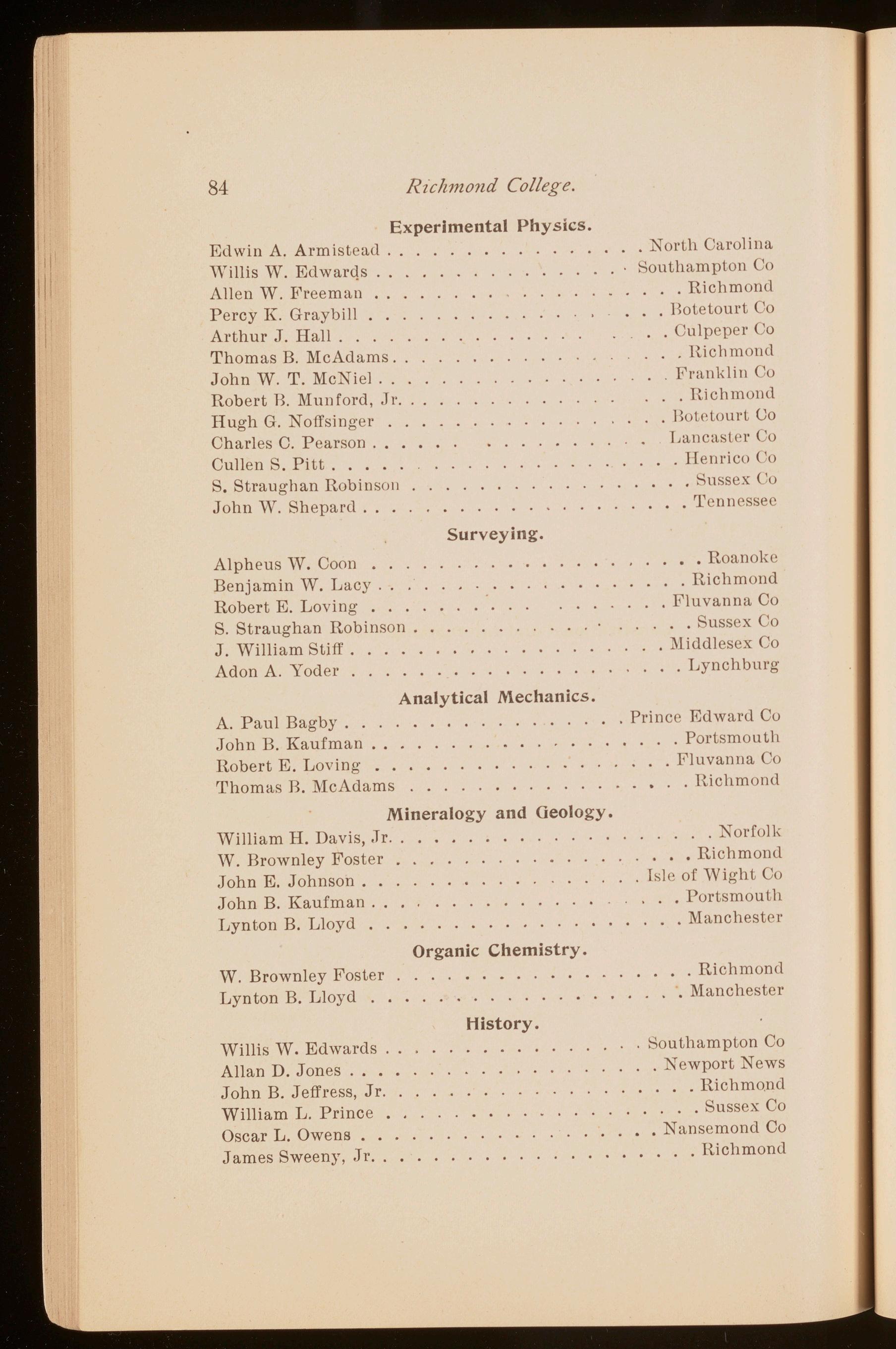
Alpheus W. Coon ..
Benjamin W. Lacy ..
Robert E. Loving ..
S. Straughan Robinson . . . . . •
J. William Stiff . . . .
Adon A. Yoder . Analytical Mechanics. . •. Roanoke . . Richmond . Fluvanna Co ..... Sussex Co . Middlesex Co . . ... Lynchburg
A. Paul Bagby ................. Prince Edward Cu
John B. Kaufman ................... Portsmouth
Robert E. Loving .............. .
Thomas B. McAdams . . . . . . . Mineralogy and Geology. Fluvanna Co Richmond
William H. Davis, .Tr.................... Norfolk
W. Brownley Foster .... Richmond
John E. Johnson . . . . . . . ..... fsle of Wight Co
John B. Kaufman ... , . . . . PorLsmouth
Lynton B. Lloyd . . . Manchester
Organic Chemistry.
W. Brownley Foster .................. Richmond
Lynton B. Lloyd . . . Manchester
History.
Willis W. Edwards . Southampton Co
Allan D. Jones . . . . . . Newport News
John B. Jeffress, Jr. . . ... Richmond
William L. Prince . . . . . . . . . . . . Sussex Co
Oscar L. Owens . . . • N ansemond Co
James Sweeny, Jr .................... Richmond
Honors Awarded at Commencement. 85
Criminal Law.
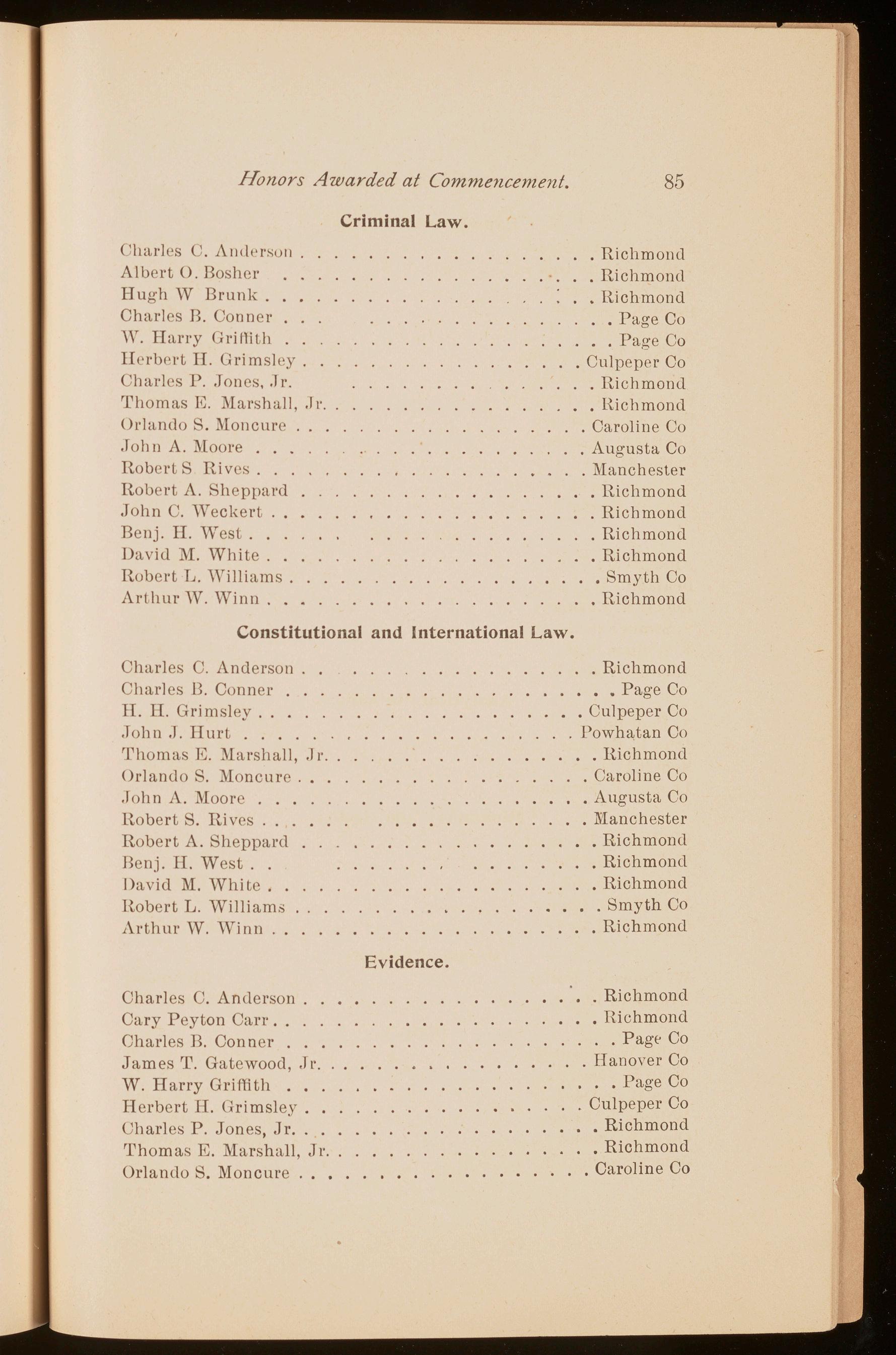
C'hMh•s C:. A11d(•1·so11
Albert 0. Basher
Hugh W Brunk.
Charles B. Conner
'IV. Harry Uriflith
lfrrbPr·t II. Uri msley .
Charks P .Tones, .Jr.
Thomas JC. i\farshall, .Ir·.
Orlando S. l\Ionenre
John A. i\loore ..
Roberts Rives .. .
RobC>rtA. Sheppard
.John C. WeckerL
Benj. H. West
Robert L. Williams . . . . .
Arthur W. Winn .................
Culpeper Co Richmond. . . l{ichrnond
Caroline Co
Augusta Co
David :i\1. White .. . Richmond . Richmond Richmond .. Page Co Page Co
. . . . . :Manchester . Richmond . Richmond Richmond . Richmond
Smyth Co . Richmond
Constitutional and International Law.
Charles 0. Anderson .
Charles 13.Conner
I-I. II. Grimsley ... .
John .I. IIurL ....... . . Richmond • • Page Co . Culpeper Co . . . . Powhatan Co
Thomas K Marshall, .I1·•••
Orlando S. ?iloncure.
,Ioh n A. i\loorc
Robert S. Ri vcs . . .
Robert A. Sheppat·d
Benj. [I. West ..
David M. White ..
Robert L. William.,; .. ,\rthur W. 1Vinn .....
Richmond . Caroline Co
. . . . . Angusttt Co
. . . Manchester . Richmond ...... Richmond . ..... Richmond . ....•... Smyth Co . Richmond
Charles 0. Anderson . . Richmond
C,.ry Peyton Can. . l{ichmond
Charles B. Conner . . Page Co
James T. Gatewood, ,Jr. . • . . Hanover Co
W. Harry Griffith . .. Page Co
RerberL II. Ori msley . Culpeper Co
Charles P. Jones, ,1r. . . Richmond 'l'homas E. i\larshall, J 1·. • • • • •• Richmond
Orlando S. Moncure ..•...............
Caroline Co
86
William T. l\Iooklar.
.John A. Moore •...
'l'homas K l\loran .
ltobert 8. Rin•s
.John C. Yi'cckert
llcnj. IT. West ..
DaYid :\I. WhitP.
Arthur,V. ,vinn.
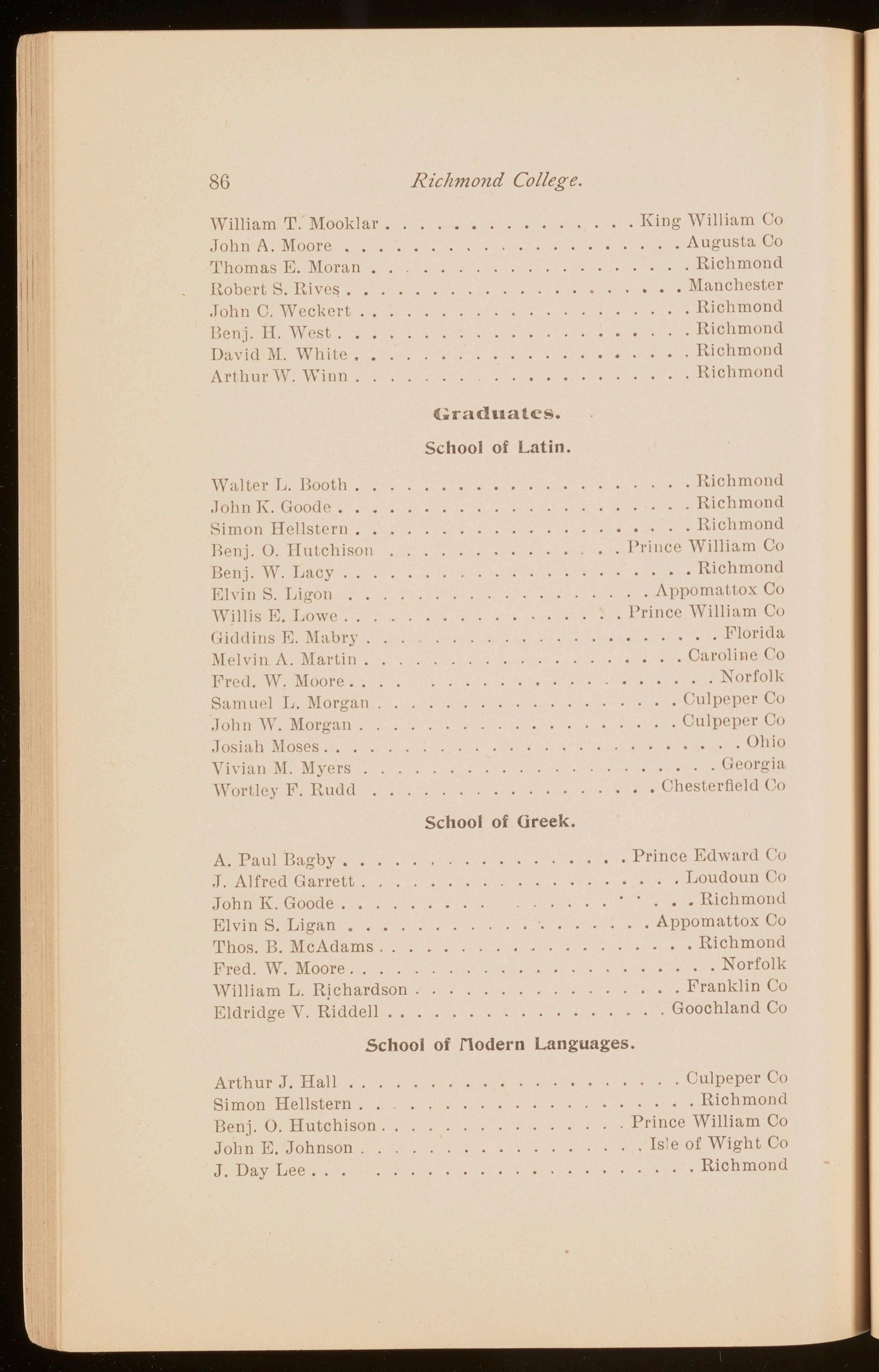
W:Ll ter L. Booth .
,John K. Goode ..
Simon IIcllstC'l'll.
Ricltmond College.
King William Co Augusta Co
Richmond .
. . ••• :\IanchcstC'r . Richmond Richmond . Richmond . Richmond
School of Latin. Richmond . Richmond . Richmond
Benj. 0. Hutchison l'ri11ce William Co
Benj. "'· Lacy . . ... Richmond
Ehin S. Ligon ......... . ........ Appomattox Co
,Yillis E. Lowt•. . ......... Princr 'William Co
Clilldins K :\Ial>ry.
:\IPlvin A. l\Iartin.
l•'rc•t1.1V. :\IoOJ'e..
Sam 111•1L. Morgan
,John"'· l\lorg:w ..
,Josiah :\loses ............... .
Yh'ian :\T. Myers
"'ort.ley F. Rudd . .
A. Paul Bagby •.
J. Alfred Garrett .
John K. Goode ..
Elvin S. Ligan •........
School of Greek. ... Florida . ... Carnlinc C'o Xorfolk ('ulpPper Co Culp<'p<'r Co . . . . Ohio
Georgia . .. Chestcrflrld Co . Prince Edwitrd C'o . Loudoun C'o
Thos. B. l\lcAdams . · · ..• Richmond . . . . . Appomattox Co
Fred. W. Moore
William L. Rjchardson .
Ii;Idridge Y. Riddell . . . Richmond .... Norfolk . . Franklin Co . Goochland Co
School of flodern Languages.
Arthur J. Hall
Simon Hell stern . .
Benj. 0. Hutchison.
John E. Johnson .
J. Day Lee . . Culpeper Co . .. Richmond . Prince William Co . Is'e of Wight Co . .... Richmond
Honors Awarded at Commencement.
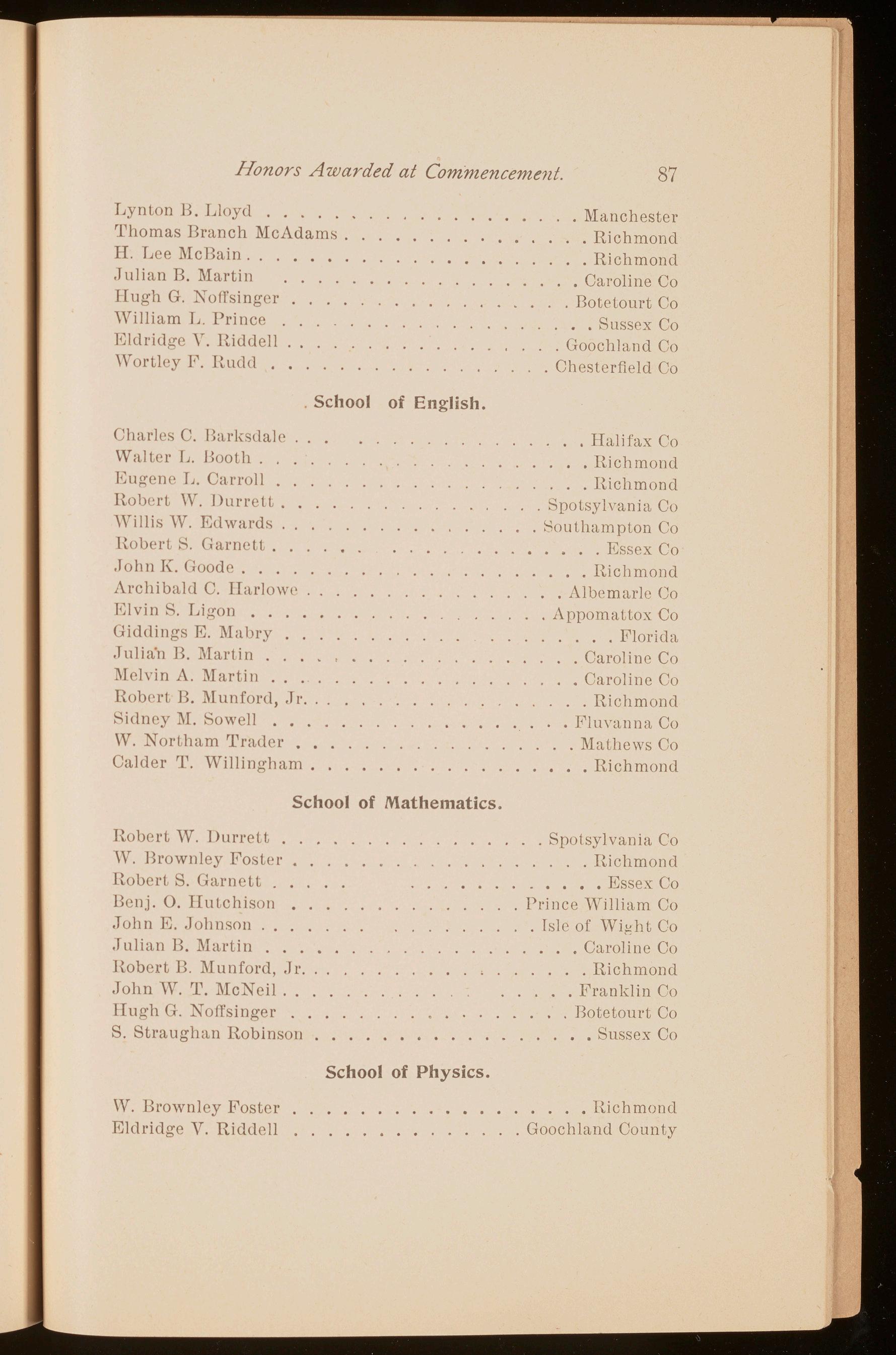
87
Lynton B. Lloyd ................... Manchester 'l'homas Branch McAdams . . . . . . Richmond
II. Lee McBain .....•............... Richmond
,Tulitrn B. l\fartin .................• 0Moline Co
I[ ugh G. X offsi nger . . . . . . . . . Botrtourt Co
\Villiam L Prince .• SussC'x Co
Eldridge \'. Wdtlell Goochland Co
Wortley I·'. Jtutltl . • . . . . . . . . Chesterfield Co
Clrnrles 0. llarksdalP
Walter L. Booth
l•:ugenP L. Carroll
Robert \\'. l)urrett
Willis W. E<lwards l{obert :-;_C.arnett
.John K. Uuodc
Arc hi bald 0. IfarlowP
l•:lvin S. Ligon .. Giddings K Mabry
.lulia'n B. :\[artin .. l\lrh·in A. l\fartin
School of English. . Hali l'ax Co • Richmond . Richmond Spotsylntnia Co ~outhampton Co . •.. Essex Co . ... Richmond .• J\1bemttrle Co ,\ ppomaltox Co . .. Florida . . Carolinr Co . . Caroline Co
Robprt B. l\Iunfor<l, ,Jr.. . . . . Richmond
:-,idnry l\I. Sowell .•................ Fiul'anna Co
\V. Nortlrnm 'l.'r:ulcr . • . Mathews C'o Calder 'I.'. Willingham ... ..•.. Richmond
School of Mathematics.
Robert ,v. ])urrett . . . . Spotsylvani:t Co ,v. Brownley Foste1· • Richmond
Itobcrt S. Garnett •••• ]Essex Co
Benj. 0. Hutchison • Princr " 'i lliam Co
.Tuhn K .Jol111son . . Isl<' of Wight Co
Julian B. Marlin ...•............... Caroline Co
Robert B. l\Iunford, .Ir. . Richmond
,John ·w.'1. 1 • l\Ic:N"eil . . . Frnnklin C'o
Hugh G. Noffsinger ... S. Straughan Robinson . . . . . • . . . .
\V. Brownley li'oster
Eldridge V. Riddell
School of Physics. . Boteto11rt Co . ....• Sussex Co . ...• Hichmond . Goochland County
88
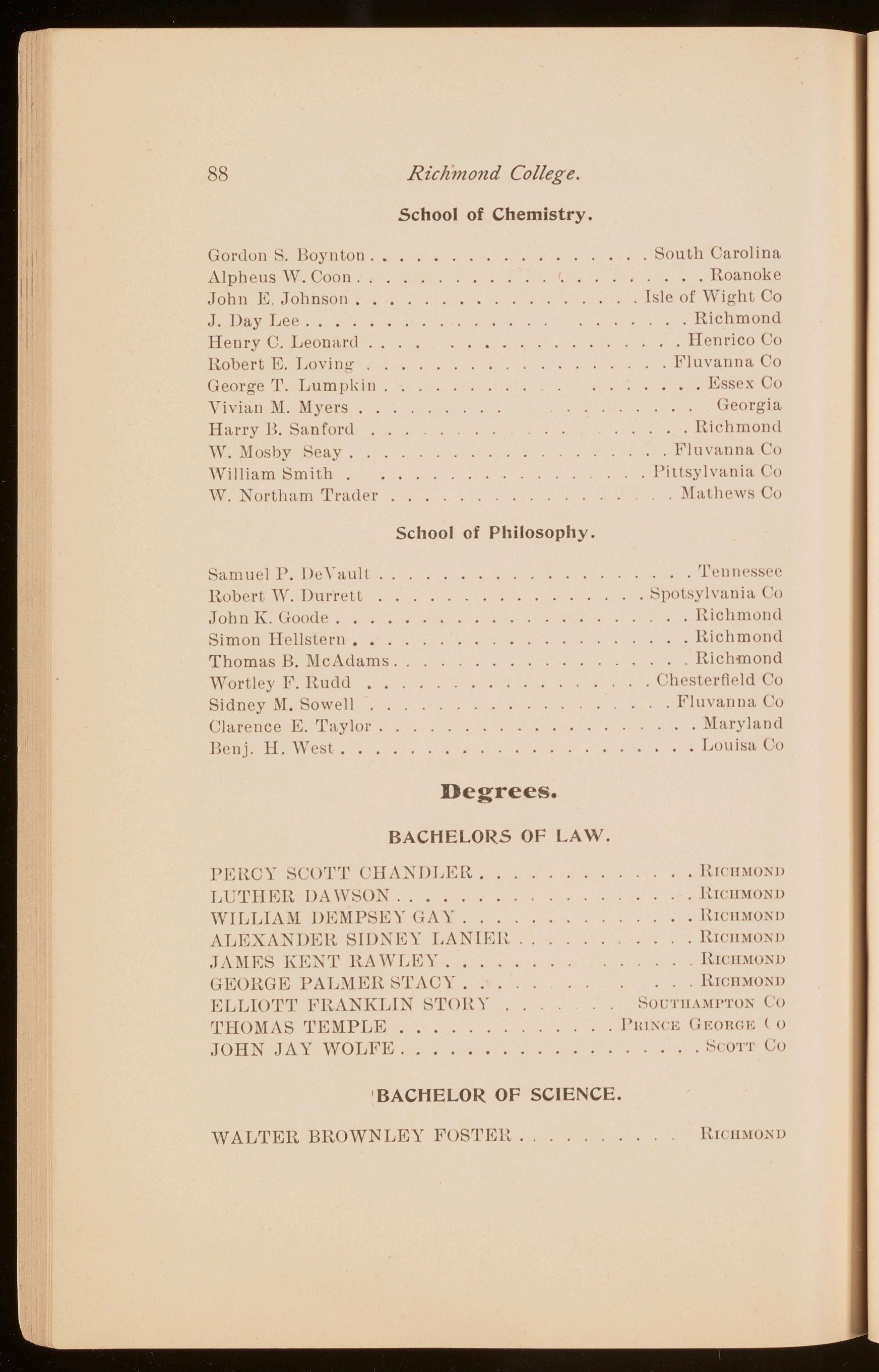
Riclzmond College.
School of Chemistry.
Gordon S. Boynton
Alpheus "\V.Coon.
John K Johnson .............. .
J. Day Lee
Henry C. LeonMd ..
Robert E. Lovin~· ...
George 'l'. Lumpkin
Yivi,u1 ~l. Myers
Harry H. Sanford
W. l'lloslJy Seay
William Smith . ,V. N'Ol'tlrnm Trader
Samuel P. l)e\·,wll
Robrrt W. Dlll'rett .
John K. Uoodc .....
Simon IIcllstern ••..
'Thomas B. J\lcAdams .
\Vortley F. Rudd •..
Sidney M. Sowell . .
Clarence E. 'l'lLylor .
Benj. II. \Vest ....
School of Philosophy.
. South Carolina . ... Roanoke
Isle of Wight Co .
Richmond Hemico Co . Fluvanna Co ... Essex Co . . . . . Georgia
Richmond
Flunwna Co
l'illsylvr1nia Co ~[athcws Co
'l'ell ll!'SSC'l' Spotsylvania Co
Richmond H.ichmoncl
Richmond . Chesterfield Co
Fluvanna Co
Maryland Louis,L Co
BACHELORS OF LAW.
PERCY SCOTT C'IIAXJ>LER.
LU'l'IIER DA \VSON
WILl,IAM ])J1;MPSl!:Y GAY ..
ALEXANDER SID::S-l~Y LANrnlt
JAJ'.lF.S KEN'l' RA wr,r.;y .... .
GEORGE PAU1ER S'l'ACY
l~LLIO'l"l' FRANKLIN STOl{ Y 'l'HOMAS TEMPLE .
JOHN JAY WOLFE
, l{t( ' IDIO:'ilJ
l{IC:IDIONIJ
l{1c:1D!()l'ill
R1c1u10~ D
RtC:H)lO:'iJJ
RICIL\10~1)
SOU'l'll.\)I !'TO); Co
l'H1:-.c·" Gn:OHGK ( O ... S( OTT Co
'BACHELOR OF SCIENCE. W AL'l'ER BROWNLEY FOS'l'F,H, Rrc:uMOl'iD
Honors Awarded at Commeucement.
BACHELOR.S OF AR.TS.
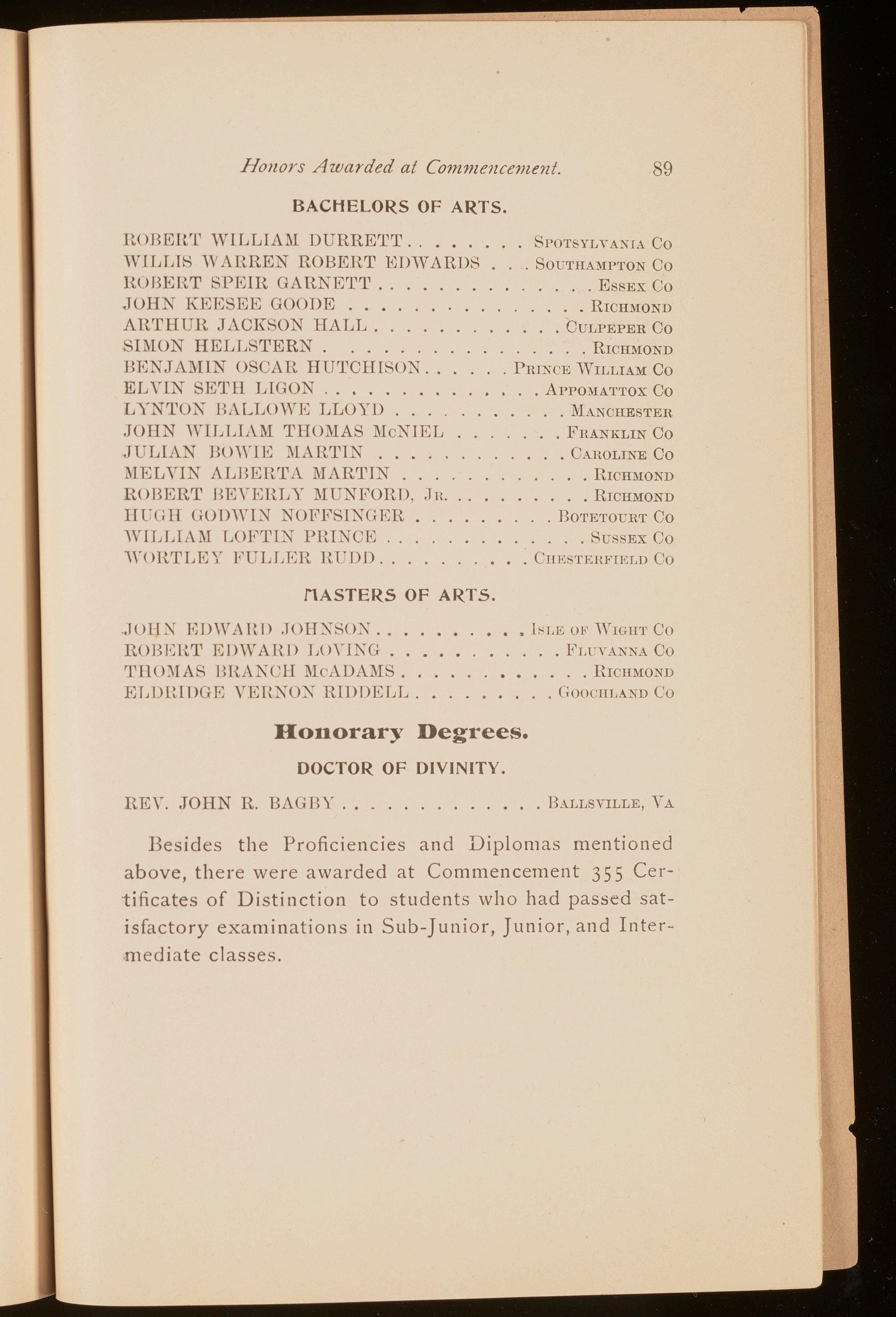
89
rt<>BEltT WlLLIA:\l DURRE'l"r ........ SPoT~YLYAXL\ co
Wll,LIH \\'.'\RREN R013ER'l' l•JllWARDS . SocTHAm'TON Co
RUlll~l-tT SPJ,;m GARNli;'l"l' .... .... .... Es~Ex Co
JOIJX KEESJDI~ GOODE . . . . . ... RICrmOND
ARTHUH, ,L\CKSO:N HALL ............ OuLI'EPER Co
SUlON HELL8TERN . . . . ..... Rrcrmo irn
1mx.rA111N oscAR HU'rcurso::x ...... Pn1scE W11,r.rAMco
EL\'lN SE'ru LWON . .............
AP1•0)1A'1"1 ox co
LYN'l'OX B,\LLO\\'J•; LLOYD ... .. ...... :'IL\NCUESTEI!
.JOUN \\'ILi.UM THO:\lAS :Mc XJEL .... FBANKLIN Co
.fl"LIAN B0\\ "11~ :'111\R'l'lX ...... C.-1.1wuNECo
i\JELYJX ALHElt'rA MARTIN ... .. .
ROlmR'l' 1mn ; 1u, Y i\l C'NFOIW, ,lIL
Ifl "<;II <:Ol>\\'I~ NOl<'F81XGJm • ....
. R1c1nro1rn
• . • RrCUMOND BoT1~'ro1:nT Co
WI LLL\M LOF''l'IX PIUXC:L •; . . . . St;~~Ex Co '\\"Ol{'rLT •;Y FC'LLER IU'l)I) .. ...... Ctrn~TEIU'U-:T.ll Co /1ASTER.S OF AR.TS.
,IOllX gl)\\',\lllJ .IOH::\"SO:'\ ....•..•.• l,1,i,;o~ Ww11 1 Co
ROBJ,:I-t'l ' ED\VAl{I> LO\ ' IXG ..... . F1,tT\:SX.\ Co ' l'l10:\IAS lll{Al-il'H i\ltAD 1U[S. .. Hrcmrmm I•}LJH:ll)OE \ ' El{XOX lUDDELL ....... t:00( 111,A:sD Co
DOCTOR. OF DIVINITY .
RE\ " . JOHN R. BAUBY .. . .. • • 13 U , LSVILLE, \°.A.
Besides the Proficiencies and Diplomas mentioned above, there were awarded at Commencement 355 Certificates of Distinction to students who had passed satisfactory examinations in Sub-Junior, Junior, and Intermediate classes.

Admission of Women
Admission, Terms of Aid Funds ...... .
Alumni. Society of Astronomy, Course in A tbletic Association
Bequest, Form of. . Bible Study
Boarding Arrangements
Calendar ...... .
Charter ....... . Che mistry, School of . Commencement.
Committees, 'f ruste es Courses of Instruction Courses of Study . . . Degrees ....... Diplomas and Certificates ..
Discipline Donations ....
Endowment ...
English, School of Entrance Fees
Entrance, Re([uirements for Ethics, Course in Examinations
Expression, Course in .. Faculty, List of ..... Faculty, Organization of. French, Course in .
German, Course in Graduates
Greek, School of Grounds and Buildings .
.... . Latin, School of .. Law Association
Law, School of . Law Library ..
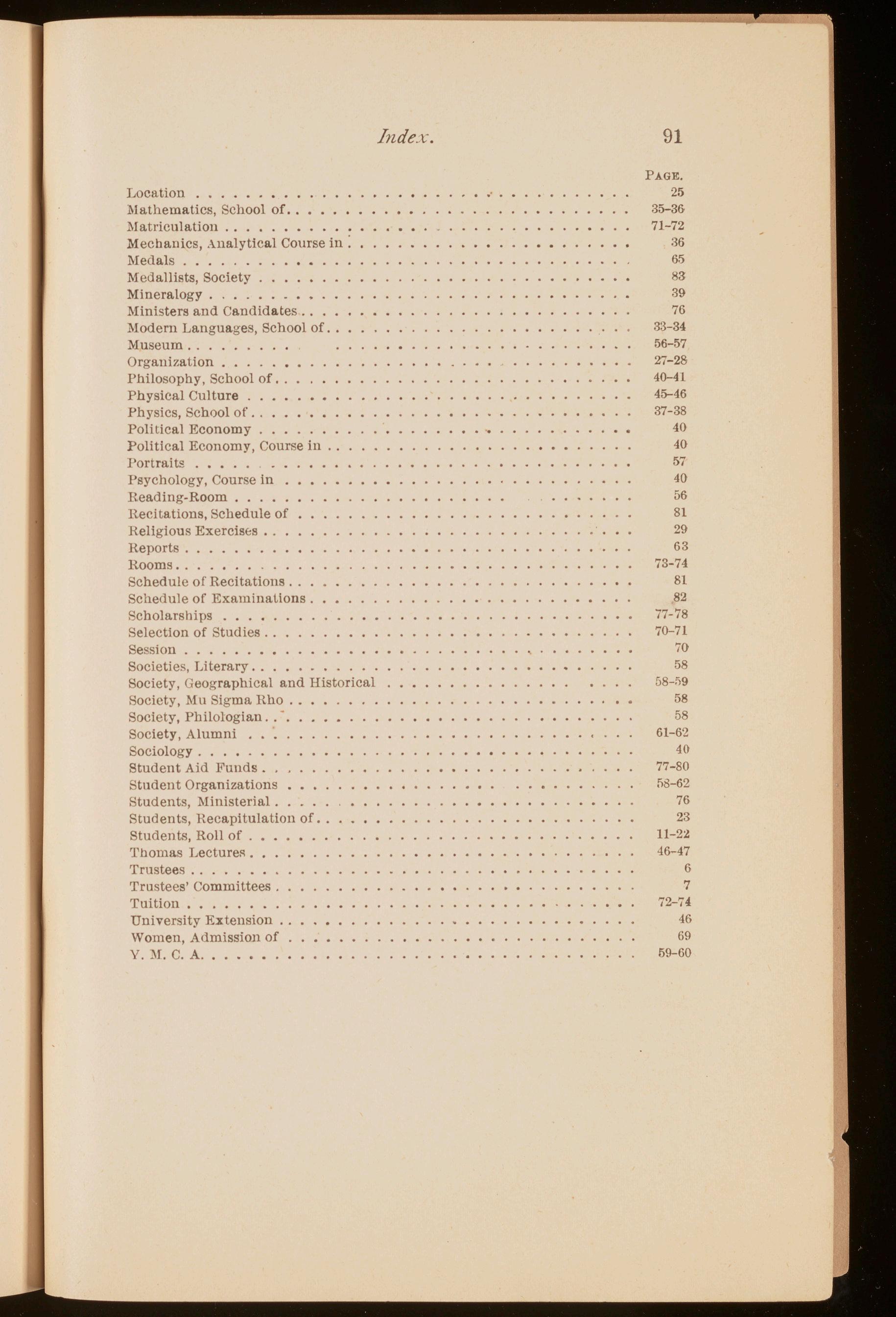
Location 111athematics, School of. .. l\!atriculation ....... Mechanics, Analytical Course in : Medals
Medallists, Society ..... Mineralogy ........•
Ministers and Candidates .. Modern Languages, School of .. ~Iuseum Organization . . . . . • Philosophy, School of .. Physical Culture .. Physics, School of. . . . Political Economy . . Political Economy, Course in Portraits
Psychology, Course in . Reading-Room .....
Recitations, Schedule of Heligious Exercis~s Reports ........ Rooms ...... .
Schedule of Recitations .. Schedule of ExaminaLlons. Scholarships ..... Selection of Studies .. Session ......••
Societies, Literary ... Society, Geographical and Historical f!ocicty, Mu Sigma Rho Society, Philologian .. Society, Alumni . . Sociology ...... . Student Aid l'unds .. Student Organizations Students, Ministerial. Students, Recapitulation of .. Students, Roll of .•. Thomas Lectures . . . Trustees ....... . Trustees' Committees . Tuition .•...... University Extension .. Women, Admission of Y. )I. C. A ..••••.•
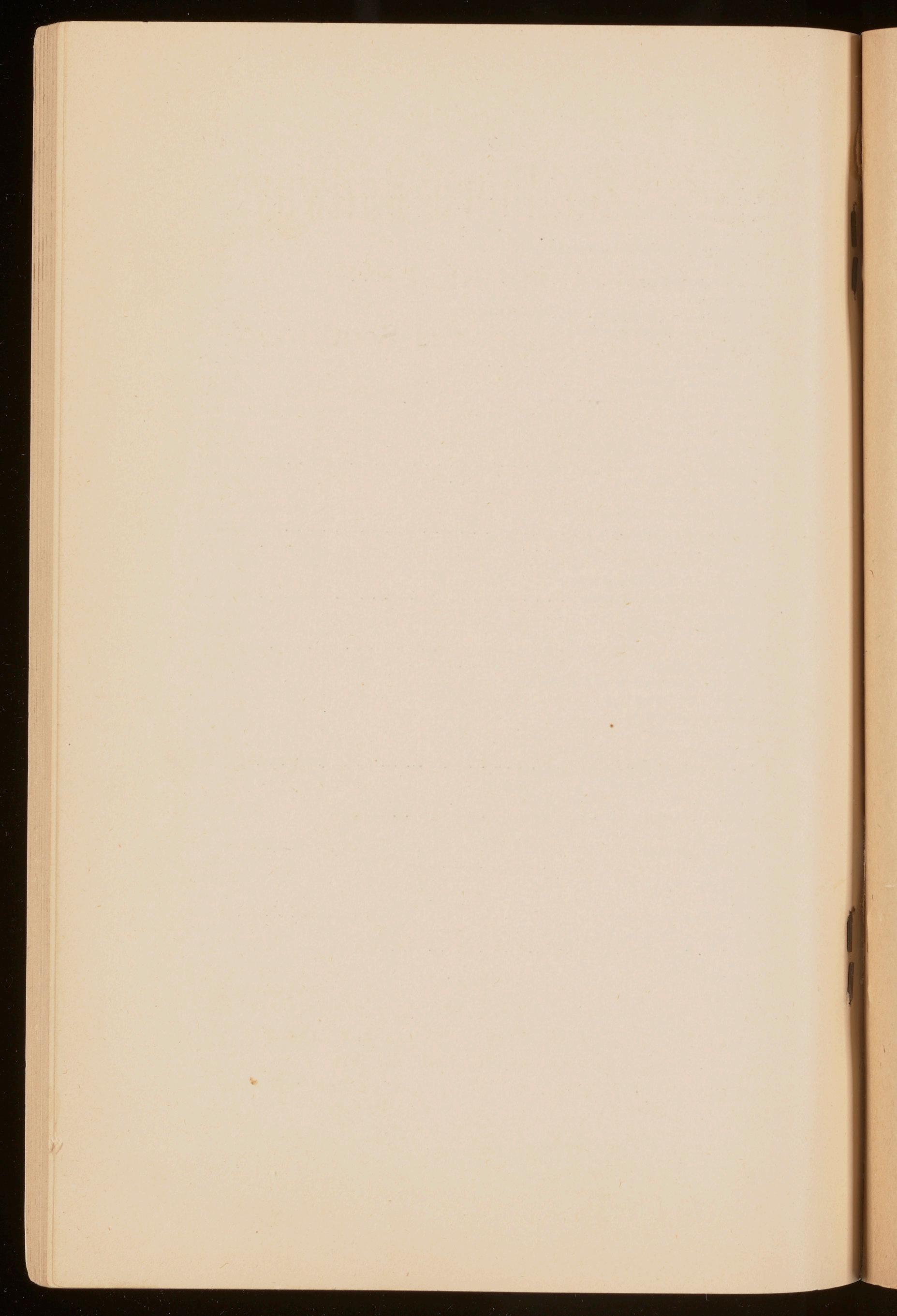
. . . THE ...
GREAT TRUNK LINE .•. BETWEEN .•. Virginia, The South, and Southwest.
Peerless Service Schedules Unsurpass~d
OPERATING . ..
'l'he Most l\lagnificent an1l EIPg,tntly-Er1uippl'cl Trains, Composed of Pullm:tn's IIantlsomP~t ,tnd L,ttest Comp,trtment, DrnwingIloom Sil'P[ll'l'S, ,t11tlSouthern R,Lilway Dining Cars, vi~.: Washington and Southwestern tLimited)-Daily between :New York, Virgini,L Cities, Floricht, :Sew Orleans, Asheville," Lancl of the Sky," Ch,ttl:inonga, ,u1<l~aslwille.
United States Fast Mail-Daily between New York, Virginia, New Orlc,ws, :rntl all points in the i-iuuth and Southwest.
'l'ourist Sleeper Washington tu S,rn Fr:tncisco every Wetlncsclay without change. Passcn_g1•rs from Richmond can make connection with tiH' ahovc limit1•cl trnins at. Danville, Greensboro' Salisbury, and CharlottP.
The Southern Qailway
Oll'crs un1•t11U1,lledfacilities for Students of Richmond College to an1l from their homes.
W HEX YOl: TRAVEL, SEE TITA'r YOl'R 'l'ICKETS READ VIA SOUTHERN RAILWAY.
All inl'ormatlon r~lative to Rates, Schedules Sleeping-Car Accommodations, etc.• cheerfnlly furnisheu upon application to any Agent Southern Railway, or C. W. WESTBURY, Traveling Passenger Agent. 920 Main Street, Rf CH MONO, VA.
J.M. CULP, Traffic Manager, Washington, I>. C.

w. A. TURK. Gen'I Pass. Agent, Washington. D. C.
